
German Cover Letter Guide [With English Sample]
Researched & written
by Yvonne Koppen
April 8, 2024
A cover letter ( Anschreiben ) might be the least important thing of the application in some countries; however, not so in Germany. Depending on the company and recruiter receiving your application, a German cover letter might be the most essential part after your CV.
A survey of HR Recruiters in Germany states that 42% ignore an application without an individual cover letter. The same survey also shows that for 71% of HR, a cover letter is an essential document in a job application. A job application letter conveys your level of professionalism, research capabilities, and ability to sell yourself without much fluff.
🖌️ Table of Contents
Simple German cover letter sample in English
A cover letter in Germany ( Anschreiben ) needs to complement your CV , but not repeat it. You can regard a cover letter as a letter of motivation filled with examples and facts. A cover letter in Germany is a very formal document that should follow a particular layout.
Read Our Related Guide
German CV Template in English
Our German-Style CV Template In English helps you to craft a killer CV. We have also created a German cover letter sample in English for you to understand what your finished document should look like.

To save you loads of time, you can download our German cover letter template . Simply go to ‘file’ and select ‘ make a copy ‘. You can then edit it to your needs.
How to write a cover letter in Germany?
We will walk you step-by-step through the areas you should include in a German cover letter. You will also learn about what the content of the cover letter should convey.
German cover letter formal format
As mentioned before, the German cover letter is a very formal letter that should follow the following format for it to look familiar to the German eye:
- Maximum one page and don’t fill it up completely. Leave enough white space when glancing over it.
- Put your full address, including email (ideally including your name) and phone number, in the top right corner.
- Put the company’s full address on the left with one paragraph below your address. Include the name of the contact person in the second line.
- Place the date of your application right-aligned underneath the addresses.
As you might know already, Germany has tons of rules, regulations, and guidelines. Naturally, there is also a guideline for professional letter writing and correspondence, the so-called DIN 5008 norm . It states the following margins on a DIN A4 (standard German letter paper format):
Left margin: 2,5 cm Right margin: 2,0 cm Top margin: 4,5 cm Bottom margin: 2,5 cm
Please take this information with a grain of salt. Not following this layout does not mean that any German manager or recruiter will ignore your cover letter; however, the German eye is trained and used to reading this format. Anything appearing too much out of the ordinary might get noticed negatively. Again, you can shine with your cover letter’s content, but don’t try to stand out with the format unintentionally.
1. Subject Line
The subject line in a German cover letter needs to stand out. It needs to convey with one look what position you are applying for, and you should bold it.
2. Salutation
The salutation is extremely important – the more personalized, the better. Reflect your understanding of the company’s culture by using the first name or last name; however it is appropriate. If you can’t find enough information or are unsure, always refer to the last name. If you can’t find the relevant person’s name, don’t be shy and pick up the phone to find out more. This shows initiative and determination.
When it comes to the cover letter’s main body, you should try to stick to four paragraphs. Remember to point out what value you will bring to the company, not what you can get from the company. Your cover letter’s content needs to reflect the expectations and requirements mentioned in the job ad. So make sure to connect the dots and position yourself ahead of other candidates.
Introduction (3 – 4 lines)
The introduction should answer why you are applying for the position and how you became aware of it (through a friend, an employee at the company, a job portal, etc.). Be confident in your word choice. Don’t use insecure words such as ‘I think I would be a good fit’ but rather ‘I am confident that I will contribute to …’.
Second paragraph (5 – 6 lines)
Now it is time to shine with your skills, experience, and qualifications. Never just list things, but choose the relevant achievements and prove them with results. Don’t only refer to achievements in your work life, but if relevant, also mention efforts with private projects. This will show your personality, drive, and willingness to learn and grow beyond what you get paid for. It is absolutely ok to also write in bullet list style in this part, as long as you don’t just list things.
Third paragraph (5 – 6 lines)
After you have showcased yourself, it is time to translate how these experiences and skills will contribute to the role and company. Convey that you have taken the time to research the company by referring to the company culture, possible awards the company has won, or projects that inspire and motivate you. Be authentic and confident.
Closure (3 – 4 lines)
To close your cover letter:
- Reemphasize your eagerness to join the company in the relevant position.
- Describe your future goals and the value you can bring to the company.
- State when you will be available to start work.
- Emphasize that you’d be happy to answer any questions via phone or in a personal interview .
- Only mention salary expectations if they are asked for in the job ad.
- Be sure to sign the cover letter with your name.
4. Attachments
Add the word ‘Enclosure’ ( Anlage ) underneath your signature. List all the additional documents you will hand in with your application, like your CV, certificates and diplomas, reference letter, etc.
Further cover letter and job applications tips
Don’t use the same CV and cover letter for different applications. As mentioned above, you must individualize your application to each company’s needs and requirements.
If you send your application directly by email, you have two options. You can either make the email body your cover letter. In this case, remove the address and date part from the email and place the subject line in the email’s actual subject. The body of the email remains a formal letter, though.
Or you can attach the cover letter to the email and briefly point out your application to the specific position in the body of the email, referring to the attachments.
Ensure that any attachment always has the pdf format, regardless of whether you send it by email or upload it to an online application system. Also, pay attention to the naming of the attachments and keep it clear and professional.
Your job application, namely your resume and cover letter, should answer the recruiter’s main three questions:
- Can you do the job? (Skills)
- Will you do the job? (Motivation)
- Will you fit in with the company culture? (Personality)
Be sure to evaluate your documents based on these questions before you hand them in. The goal of your CV and cover letter is to get an invitation for a job interview .
Job Interview In Germany [How-To + Tips In English]
We hope that you now have a better understanding of how a German cover letter looks and feels like. But never forget to adapt your cover letter and application to the style of the company you are applying for. There is a big difference in culture between a young international StartUp and a big traditional German enterprise.
Support Simple Germany
You can support our work by buying us a virtual coffee. Your donation helps us research and create ad-free content like this one.
Join us in our goal to empower internationals like you to settle into life in Germany more smoothly.
7 Hacks To Save Money In Germany
Get our FREE guide with 7 actionable hacks to save money while living in Germany. 7 days, 7 emails!
About the Author
Yvonne Koppen is a researcher and writer at Simple Germany, focusing on demystifying German bureaucracy for international skilled workers.
She has lived and worked abroad, which helps her understand how difficult a move to a new country can be. Beyond her professional pursuits, Yvonne loves to plan and go on road trips, puzzle, and do a triathlon here and there.
She is committed to creating accessible, empowering content through her writing and YouTube videos. Yvonne's passion for continuous learning and her ability to simplify complex topics make her an invaluable resource for expats seeking to navigate their new life in Germany.
You Might Also Enjoy These Guides
Can i work in germany without speaking german [2024 guide], german cv template in english [ultimate english guide], german payslip explained: how to read your payslip in germany, unemployment benefits germany [2024 english guide], sick leave in germany [a 2024 english guide], job interview in germany [how-to + tips in english].

Empowering internationals to settle into life in Germany more smoothly.
- Germany Explained
- Service Providers
- Brand Assets
- Scoring System
Buy Us A Coffee
Cookie Policy
Privacy Policy
Refund Policy
in Düsseldorf
© All Rights Reserved. Simple Germany is a trademark registered in the European Union.
As an Amazon Associate we earn from qualifying purchases.

How To Write A German Cover Letter – A Step By Step Guide
by Cheryl Howard | Apr 7, 2024 | Berlin Guides , Job Applications , Working In Berlin | 0 comments

HOW TO WRITE A GERMAN COVER LETTER – A STEP BY STEP GUIDE
Have you been l ooking for a job in Germany, applying for several positions, and finding that you’re not getting any responses? It happens to the best of us, even to those who work in highly demanded professions like software developers, marketing professionals, economists, and more.
Searching for a job , especially one right for you, is a daunting task that takes a lot of work, patience, and perseverance. When you add looking for a job in a foreign country like Germany into the mix, it’s even more challenging. You’re probably unfamiliar with the country’s norms when creating job applications and could unknowingly be making mistakes. What’s more, a lot of the information about how to write a German cover letter is often outdated and/or created by people with zero experience in recruiting.
The most significant part of getting noticed by German employers is your ability to put together a solid job application, which usually includes a well-written and designed cover letter and CV that tells a story about you and why you’re uniquely qualified for that position.
Join Our Community
Stay ahead with the latest news on immigration developments, employment opportunities, and other updates about life in Germany. Get valuable insights, early access to Berlin Life guides, invites to community events, and more. Don’t miss out – subscribe to one of the most popular newsletters in Berlin.

WRITE A GERMAN COVER LETTER LIKE A SEASONED PRO
📖 📖 📖 Bookmark THIS extensive guide on how to write a German cover letter and use it as a frame of reference when applying for jobs in Germany.

1) Are Cover Letters Really Needed?
As you’re searching for a job in Berlin, or anywhere in Germany for that matter, have you asked yourself these questions:
1) Do I need to write a German cover letter when I’m applying for jobs?
2) Are cover letters relevant when my CV already tells my story?
3) Does anyone even bother to read cover letters?
Let me tell you a story:
I worked for one company when a member of senior management asked, “Why do people write cover letters? I never read them. I only want to see their CV, and I’ll get in touch if it’s interesting. I’m way too busy to read both cover letters and CVs.”
A very fair point and I agree with him 100%. His pain was also my pain, as I was reviewing several job applications each day and looking at people we could potentially add to our team. It was time-consuming and tedious, especially when we wanted to ensure whoever applied was given a fair shot.
It’s true that not every recruiter or hiring manager will read it (like that manager), and some companies (like where I currently work) even ask candidates not to submit cover letters. However, many companies still expect to see one.
So do you need a German cover letter? Yes, most definitely. Even though they feel like a waste of time (and sometimes really are), cover letters are essential when applying for jobs in Berlin or elsewhere in Deutschland.
2) Why Should I Write A German Cover Letter?
There are a number of good arguments about why you should take the time to write up a cover letter for your job applications:
1) There’s a slight chance that not submitting a cover letter will result in immediate rejection. A recruiter or hiring manager may think that if you didn’t put in the effort to make a cover letter, why should they even consider you for the job? While this is silly, don’t take a chance and make it a habit always to include a cover letter.
2) Some (not all) HR software scans submitted documents looking for specific keywords. A cover letter that mentions certain keywords from the job description could help you bubble to the top of the candidate pool, where you’re more likely to get noticed before other candidates.
3) Called a motivation letter in Germany ( Motivationsschreiben ), a cover letter is your chance to shine. It’s when you can tell the company why you want to work for them, explain how uniquely qualified you are for that role, and really make your personality come through.
Think of it like this – when you go to the theatre to watch a movie, you’ll see trailers for upcoming flicks. They only last one or two minutes, but if the trailer is really good, they’ve hooked you, and eventually, you’re going to go out and watch that movie.
Your cover letter is exactly like that movie trailer. It’s a preview of your CV and you as a person. A cover letter’s main call to action is to make the person reading it want to know more. They’ll spend time reviewing your CV and, hopefully, contact you for that first interview.
4) A cover letter shows diligence and interest from your side. Employers are keen to know why you want to work for them, learn why you’re the person they should hire, and if you’re passionate about your chosen field.
If a cover letter is done well, in the sense that it’s framed as a well-written and compelling narrative, it’ll motivate the employer to contact you for an interview. Most people do really read them, so it’s worth spending time writing one that makes you stand out from other applicants.
3) How Do I Structure A German Cover Letter?
Following a fixed structure and method that you can repeat for each new job application makes writing a cover letter way easier.
Always include these vital elements in a cover letter:
1) Salutation – Address your cover letter to that person using formal German greetings such as “Dear Herr Müller” or “Dear Frau Schmidt.” If no contact is listed or you’re unsure about which greeting to use (you don’t ever want to address someone as Herr when they’re a Frau, for example), use a generic greeting such as “Dear hiring manager” or “To whom it may concern.” If you read other online texts saying that you always have to specify a specific contact name, this is very untrue. More and more German companies are refraining from adding contact names to job descriptions to avoid being spammed by applicants. So don’t stress out on this point at all, as using a generic greeting is not only expected but completely acceptable.
2) Intro – This section should be one paragraph maximum. Personalize your cover letter by telling the company why you want to work there. Be specific and use supporting examples gleaned from company research. Doing so will impress the company and show you did your homework before applying. Remember that this section is not about you but about them as an organization. Avoid self-serving statements when telling them why you want to work there. For example, don’t say you want to work there because the office is down the street from your flat or you heard they pay exceptionally high salaries. Instead, say you’re impressed with the company culture, that you identify with their sustainability mission, and that you want to be part of building out the next stage of their growth.
3) About You – This section can be one or two paragraphs long and is the “meat” of the cover letter and where you need to sell yourself. Pull points from the job description to tell your potential employer why you’re uniquely qualified for the position . Build on those points by using personal examples that draw from your experience, education, and more. Ensure your examples are specific, build on one another in a complementing fashion, and tell an exciting story. Say that the role calls for someone with leadership experience. You can tell them that you have 10 years of experience managing distributed teams of varying sizes. You can further say that you excel at creating and maintaining high-performing teams with a track record of meeting deadlines. And finish by telling them how you launched a project that helped the company make millions of euros. Whatever you do, don’t just list a bunch of keywords, repeat the job description itself, or write a novel.
4) Closin g – Reiterate your excitement about the company and the open position. Let them know you want to learn more and would welcome a chance for an interview. Be sure to tell them about your availability and how to best get in touch.
A few more tips about how to structure a German cover letter:
1) If you’re sending the cover letter by email or uploading it to an applicant tracking system, you don’t need to include the address information of yourself or the company. For that matter, a signature isn’t required either. These things are entirely unnecessary and irrelevant as we no longer live in the Stone Age.
2) If anyone prints or references your cover letter for an interview, you can leave the date on it so they know when you applied for the role.
Strive to ensure the narrative in the letter flows well and tells a unique story about you and why they should hire you over anyone else out there.
4) Should I Customize My Cover Letter For Job Applications ?
Yes, we know. It’s a lot of work to create a new cover letter every time you apply for a job, but sending the same cover letter out won’t do anymore. You need to show employers you took time to research their company, tell them why you want to work there, and why they should hire you.
This is why personalizing the cover letter is really important. They need to see the real you and that you were thoughtful in your job application. Anything less makes it look like you’re not really interested in the role and could see your job application land in the recruiter’s NO pile.
Suppose a cover letter is simply a regurgitation of the job description or a generic copy-and-paste text you’ve used for every job application. The recruiter or hiring manager will easily be able to spot this and may make the company less likely to contact you. Again, don’t take a chance.
Read about how to customize cover letters when you’re submitting unsolicited job applications .
5) How Do I Use Company Research In My Cover Letter?
Before writing a cover letter, we recommend that you complete in-depth research on the company to which you’re applying. The research will help you a lot, especially as it’ll give you the information you can embed in your cover letter and use later to ask questions during an interview.
You need to tell the employer why you like their company and show you did your research, by looking at Glassdoor reviews , browsing through their website, reading their press releases, etc.
Read our detailed guide about how to research a German company .
6) How Long Should A German Cover Letter Be?
Keep the cover letter to a single page and not more than 3 – 4 paragraphs. Be succinct (i.e., avoid long wordy sentences or overuse of adjectives) and summarize, summarize, summarize .
Pick key points from your CV and/or job description but don’t repeat things verbatim.
7) Should I Use An Automatic Text Generator or AI?
I’ve played around with ChatGPT and boy, is it good. Like really really good!
Call me old school, but in general, I’d still suggest writing your own cover letter without the help of predictive text generators or AI.
I say this for two reasons:
1) Many of these generators like Speedwrite yield text that doesn’t make much sense at all. It often reads as if it were written by a robot and spits out alternative text that says exactly the same thing but in a slightly different way.
2) Even worse, it won’t sound like you. A cover letter should be an honest and accurate reflection of who you are and how you communicate. I cannot stress that enough, especially if you’re being hired into a role where communication skills are key.
What you could do is use AI to write that very first draft cover letter. Then you could use that text as a baseline and improve it using your own words. Try out this beta AI from Imagine to get started!
Alternatively, you can write a draft first and then use a tool like Grammarly to better what you’ve written.
We know this can be tough if you’re not writing in your native language. In these cases, make sure you get other people to proofread your cover letter or even hire a professional to help you out.
8) Should I Write My Cover Letter In German ?
Writing your cover letter in German may help you get noticed by HR software or LinkedIn search engine algorithms.
Be careful and use your best judgment here, though. It could backfire when they discover that your level of German doesn’t match the level of what’s in your cover letter.
Let me tell you another story:
A recruiter I used to work with told me that she’d found a dream candidate for a position that had been open for a long time. This person was applying from abroad and had submitted both their CV and cover letter in German.
The first interview was scheduled, and during the call, the recruiter was surprised to find that the candidate didn’t know any German at all. Turns out they’d paid someone to translate their documents.
Sadly, the candidate was rejected for their false claims of being fluent in German and wasting the recruiter’s time. And contrary to what many say, German fluency is absolutely essential for most available positions in the country.
Of course, it could go the other way and the company may still hire you anyway because you’re such a good fit. But please, be honest upfront and if you decide to write your cover letter in German, indicate your language level (like B1 or C1) very prominently on your CV and in your cover letter. Then the decision will be left to the employer to contact you.
9) Can I Stretch The Truth Because Everyone Fibs A Bit?
Above all, be humble and honest about things, like your education, work experience, level of German, etc.
It’s easy to lie or exaggerate when you want a job, and we’ve all been told to “fake it until we make it,” and in many cases, it can work in your favor. But let’s be real here, this behavior is unprofessional, not to mention unethical.
Not long ago, I was shocked to read the LinkedIn profile of a former colleague who claimed to have led a high-profile project for our company. That project wasn’t even started until after that person left. This person was blatantly lying and taking credit for other people’s work that she didn’t do.
Don’t be that person.
False claims could come back to haunt you. For example, the Berlin community is small and people know each other. A potential employer may know someone at one of your former companies and informally reach out to them for information about you.
If they uncover any lies, it will likely cost you the job, even your reputation.
Of course, be confident in your accomplishments, and don’t undersell yourself. Just make sure you’re telling the truth.
10) How Do I Create A Well Designed Cover Letter?
You could just type of bunch of text into a Google document and send it off. But how about making your cover letter look nice using websites like Canva or Edit.org , where you can find beautiful and professional templates for free?
Other things to keep in mind:
1) Use a large and readable font that considers general accessibility guidelines. Sometimes people try to jam as much information as possible onto a cover letter and to make it fit a single page using ridiculously small font sizes. Trust me – no one wants to use a magnifying glass to read your cover letter.
Use this guide from Indeed which speaks to the right font and font size to use on CVs, which also applies to cover letters.
2) Don’t make your paragraphs too long and use sensible spacing to make your cover letter easier to read.
3) Your German CV should have a similar look and feel. This way, the cover letter, and CV will appear as one fluid job application package.
11) Do I Really Have To Follow These Rules?
No, of course not! Our guidelines are simply here to help you write a good cover letter that’s more likely to get you noticed by German employers.
There’s no reason not to get creative and have fun with your cover letter. This may also mean breaking some of the “rules” outlined here.
Be bold and dare to take unique approaches that challenge the status quo. Perhaps give them a link to a video you made telling them why you want to work there. Share a sample of what you can do for them by sharing some insight on how you’d approach your job. Invite them to check out your blog or social media.
The sky’s the limit. A unique cover letter will help you stand apart from other candidates.
12) How Can I Ensure My German Cover Letter Is Of High Quality?
Make sure there are no spelling or grammatical errors, get the company name and other details right, and if you can, have a second or third pair of eyes review your cover letter. This can be a friend, partner, or even, a paid professional. Proofreading is essential, as if you’ve been staring at the same documents for hours, it can be super easy to miss out on small mistakes you might’ve made.
This advice might sound really obvious and basic, but trust me, I’ve seen tons of job applications with errors on them. I must also confess that I once put the wrong company name in a cover letter and somehow still got several interviews with them. Miracles happen, folks! 🤣
Anyway, avoid sloppy mistakes if you can, and make sure your German cover letter is top-notch.
What do I recommend? Join my Facebook community of more than 8,000 people and ask someone there for a cover letter exchange . Another person can review your cover letter and give you feedback and you can do the same for them.
That’s a wrap! Follow these tips to write a really good German cover letter that’s going to land you a job in Germany.
RELATED CONTENT

How To Find A Job In Berlin: An Honest & Detailed Guide
by Cheryl Howard | Apr 15, 2024 | Berlin Guides , Job Search , Working In Berlin | 2 Comments
An honest and detailed guide with tips from a career coach and hiring manager, advising you on how to find a job in Berlin in 2024.
Why German CV Photos Aren’t Necessary
by Cheryl Howard | Apr 13, 2024 | Berlin Guides , Job Applications , Working In Berlin | 0 Comments
German CV photos are controversial these days. Contrary to popular opinion, it’s not necessary to add one to your German CV.

Why Knowing Salary Ranges In Germany Is Essential
by Cheryl Howard | Apr 13, 2024 | Berlin Guides , Employee Info , Working In Berlin | 0 Comments
Know salary ranges in Germany for your profession, as it’s one of the first things companies will ask about during the recruitment process.
Cheryl Howard, Founder @ The Berlin Life
Hi, I’m Cheryl. My mission is to help you move to Berlin and find work.
A Canadian in Berlin for 10+ years, I have the unique experience of moving to Berlin – not once, but twice. During my time in Berlin, I’ve had five different visas and worked as both a freelancer and a permanent employee for numerous Berlin companies. I even managed to find a new job during the pandemic and again in 2023, during Germany’s recession and massive layoffs in tech.
My day job has involved work as a hiring manager, overseeing the recruitment of countless people, as well as a team coach helping teams and individuals work better and find happiness in their careers. Through my side projects, I’ve also shared my personal experiences by publishing a series of helpful blog posts, creating a thriving community of job seekers, and hosting events to help people find work in Berlin. In 2021, I decided to put my coaching and recruiting talents to use by creating The Berlin Life, bringing my existing content and community together in one spot.
The combination of my personal and professional experience means I know exactly what it takes to move to Berlin and find work.
Submit a Comment
Your email address will not be published. Required fields are marked *
Email me when someone replies to my comment
- NETHERLANDS
- SWITZERLAND
Employment guides & Tools
Cover letter in germany (anschreiben).

Together with your CV ( Lebenslauf ) , the cover letter is a key component of any job application in Germany. Far more than a mere formality, a cover letter is an important means of presenting yourself to a prospective employer. It would be difficult to land a job in Germany without one. This page walks you through the process of crafting a job-winning cover letter, with a few hints and tips about what is expected in the federal republic.
Cover letter in German ( Anschreiben )
First things first: what is a cover letter? Although it may be tempting to send in your job application without one, a cover letter is an important part of job applications in Germany, and most hiring managers will expect to receive one, even if the vacancy listing does not explicitly specify this.
A cover letter is a short (usually no more than one page) document that you submit together with your resume as part of your job application. Rather than simply repeating the information contained in your CV, its purpose is to expand upon it, summarising your skills and experience, explaining what makes you a good fit for the role, and (hopefully!) piquing the hiring manager’s interest. While a CV lays out the facts, your cover letter conveys more personality. You can expect to be asked about both if you make it to a job interview .
In Germany, a cover letter ( Anschreiben ) generally follows a prescribed format, which makes it easier to structure your own.
Cover letter templates
Using a template can be a good way to get started, and will also ensure your cover letter is well-formatted. If you used a template for your CV, it’s a good idea to use the same design for your cover letter, to make your application look professional and consistent.
The following websites offer cover letter templates:
- Novorésumé
How to write a cover letter in Germany
German cover letters are not fundamentally different to those in other countries, with the only possible difference being they are rather formal and matter-of-fact, with no credit given to pomp, exaggerations or overly flowery language.
As with elsewhere in the world, your cover letter in Germany should be succinct - no more than one side of A4 in size 12 font. You also do not want to present the hiring manager with a dense wall of text, so make sure to break it up into sizeable paragraphs.
It may be time-consuming, but you should also write a unique(ish) cover letter for each job you apply for. Recruiters don’t like to receive form letters - and sending off a generic letter is a sure-fire way to ensure your application ends up in the bin. You need to explain why you want this specific position , and what makes you particularly suited for it - so tailor your cover letter based on the responsibilities and requirements outlined in the job description, and what you know about the company.
Cover letter format
If you’re not sure where to start, it can help to break the letter down into a few sections. Almost all cover letters are structured around the same tried-and-tested format:
- A header with your contact information
- A greeting to the hiring manager
- An opening paragraph that will grab the reader’s attention
- A second paragraph that explains why you’re the perfect fit for the job
- A third paragraph that outlines why you’re a good match for the company
- A formal closing
How to start a cover letter: With a header
Writing your contact header is a good way to ease yourself in, and ensure you’re not staring at a blank page. As with a CV, it’s important to include some basic contact information on your cover letter. You should include:
- Phone number
- Email address
- Name of the hiring manager
- Name of the company you’re applying to
You might also consider adding your social media profiles or the address of your personal website, if these are relevant in your field and to the job you’re applying for.
Address the hiring manager
This is where you can score some easy marks. You’d be surprised how many people open their cover letters with, “Dear Sir or Madam.” That’s one way to turn off a hiring manager. It’s much better to address your letter to them personally. That means you need to do some research.
If you’re lucky, this information is included in the job description. You should also check the “Team” or “About us” page on the company’s website. Alternatively, you could turn to LinkedIn to find out who’s head of the relevant department. If in doubt, call up the company and ask who you should address your application to. It might make your name stick out when it comes to sifting through CVs.
As a last resort, if you really can’t get hold of a name, address your cover letter using one of these greetings:
- Dear [Department] Hiring Manager
- Dear Hiring Manager
- Dear [Department or Company Name] Team
Write your introduction
This is worth taking your time over. Companies typically receive hundreds of applications for single positions, and so they’re not going to be reading every cover letter from top to bottom. You need to grab their attention from the first paragraph.
The key here is to not be too generic - most applicants will probably have similar work experience and interests. Instead, you need to explain what makes you unique. What is your bottom-line USP? That’s what the recruiter wants to know.
Explain why you’re a good fit for the job
Next, it’s time to get into the meat of your letter, by outlining your professional skills, and explaining why this experience makes you better-qualified than the other applicants. It’s a good idea to have the job description to hand when you write this section. Match the requirements listed by the company to elements from your own skill set and work history, and elaborate on them.
But there’s no way you’ll have space to cover every single detail. Instead, pick two or three of the most important requirements and use them to spin a couple of compelling stories from your own experience.
Explain why you want to work for the company
The final section of your cover letter is just as important: explaining why you want to work for this specific company. Hiring managers want to know that you’d be a good fit for the company culture - that you want this job, not just any job - otherwise you’d be a risky hire.
This might require you to do some extra research - what do you know about the company and its products or services? What’s the work culture like? What about that enthuses you? It pays to be super specific.
Wrap things up
That’s it - you’re almost there! Now you need to finish with a conclusion that wraps up your letter. If you have anything else you want to say, now’s your chance. Finally, thank the hiring manager for their time (it’s only polite).
Then, it’s time to sign off with a formal closing. You could use:
- Best regards
- Kind regards
- Yours sincerely
Once your cover letter is finished and proofread, you’re ready to send off your application. Put your feet up and wait for a response.
Should I write my cover letter in German?
Whether or not you should write your cover letter in German depends on a few factors, namely:
- The language requirements of the job
- What is specified on the job description
- Your own language ability
If a job description specifies that applications should be made in German, it’s best to follow this advice. If your language ability isn’t up to the task of writing a CV and cover letter in German, it may be that the job itself is also beyond your language capabilities.
However, an increasing number of companies in Germany, specifically international companies , are now offering English-speaking roles, although some still require you to apply in German. In this instance, it’s worth submitting your documents in German (you can ask a German-speaking friend to help, at least by checking your finished CV and cover letter over). To really show off your language skills, you could submit both English and German versions of your application.
Cover letter examples
Not sure where to start? It can be a good idea to read some example cover letters to give you an idea of what is expected. But don’t be tempted to copy them word for word - you want to convey your own, unique personality, not someone else’s.
English cover letter sample
The internet is full of examples of cover letters written in English. Check out popular websites like Novorésumé, Monster.com, Reed, Indeed, and LiveCareer.
German cover letter example
Checking out a German cover letter example can also be a good way of getting started, especially if German is not your native language. Look at websites like Karrierebibel, Bewerbung.net and Staufenbiel, or simply search “ Anschreiben Beispiel ”, to get a good idea of how German cover letters are structured.
Cover letter tips
- Make sure your cover letter is correctly formatted and free of spelling and grammatical errors - ideally, have a friend check it over for you before sending it.
- Include your personal details at the top of your letter.
- Do your research to address the hiring manager by name.
- Always tailor your cover letter to match the job description.
- Use specific, concrete examples from your work history to back up your points.
- End with a formal signing-off.
- Make sure your letter is no longer than one side of A4.
Follow us on Facebook

German CV guide (Lebenslauf)

English speaking jobs in Germany | IamExpat Jobs

Job interview questions & Answers in Germany

Recruitment agencies in Germany

Career coaches in Germany

Working in Germany
- HOME ●
- FAQ ●
- Auf DEUTSCH lesen
- Login / Register
- Why German?
- German language
- Certificates & diplomas
- Austria & Germany
- Beginner's Lessons 1-10
- Beginner's Exercises 1-10
- Beginner's Examples 1-10
- Advanced Lessons 1-8
- Advanced Lessons 9-16
- Advanced Lessons 17-24
- Advanced Exercises 1-8
- Advanced Exercises 9-16
- Advanced Exercises 17-24
- German with Sisi
- Test your German
- Online-Test
- General Thoughts
- Write your CV/Resume
- Sample CV/Resume
- Write your cover letter
- Sample cover letter
- E-Mail or regular mail?
- Job Interview
- International Work Experience
- Partner Links
- German Jokes
- German Quotes
Job Application
Visit ActiLingua
Cover Letter
How to write your cover letter in german.
Generally speaking a cover letter should be concise and to the point and definitely no longer than one page.
Points you should consider when writing a cover letter
To be effective, your cover letter should follow the basic format of a typical business letter and should address three general issues:
- First Paragraph - Why you are writing
- Middle Paragraphs - What you have to offer
- Concluding Paragraph - How you will follow-up
Do not repeat your what is already in your CV, simply refer to it! "As you can see from my CV, …". If a particular work experience listed in your CV especially qualifies you for the job you can refer to it and emphasise its relevant points. Your cover letter should NEVER be longer than 1 page.
Why you are writing?
In some cases, you may have been referred to a potential employer by a friend or acquaintance. Be sure to mention this mutual contact by name as soon as possible as it is likely to encourage your reader to keep reading!
If you are writing in response to a job advert , indicate where you learned of the position and the exact title of the position you are applying for. More importantly, remember to convey your enthusiasm for the job and the likely match between your credentials and the position's required qualifications.
If you are writing a prospective application letter - a letter in which you enquire about potential job openings - state your specific job objective. Since this type of letter is unsolicited, it is even more important to capture the reader's attention. It is a good idea to mention why you are interested in that specific company, esp. when you write a prospective application letter. Do not give the impression that they are one of two hundred applications (badly copied CVs, serial letters, etc.).
What You Have To Offer
In responding to a job advert , refer specifically to the qualifications they have listed and illustrate how your particular abilities and experiences relate to the position for which you are applying. In a prospective applicationg letter express your potential to fulfil the employer's needs rather than focus on what the employer can offer you. You can do this by giving evidence that you have researched the organization thoroughly and that you possess skills that are used within that organization. Emphasize your achievements and problem-solving skills. Show how your education and work skills are transferable, and thus relevant, to the position for which you are applying.
How You Will Follow Up
Bid directly for the job interview or an informational interview and indicate that you will follow-up with a telephone call to set up an appointment. Be sure to make the call within the time frame indicated. Even if you do not mention it explicitly in the letter, it is a good idea to make a follow up phone call. Timing is important: do not call on the very next day or after more than one week. If you are applying from outside the employer's geographic area you may want to indicate if you'll be in town during a certain time frame (this makes it easier for the employer to agree to meet with you). In conclusion, you should also indicate that further references are available on request. Also, if you have a portfolio or certificates to support your qualifications, inform prospective employers that they are also available on request.
Deutsch-lernen.com recommends: Learn Business German at ActiLingua Academy in Vienna.

Deutsch-Lernen.com in cooperation with ActiLingua Academy, German course Vienna !
- Year-round courses for adults 16+ years in Vienna
- Summerschool for young people: 12-17 and 16-19 years
- Learn German
- German Lessons
- Job Appliation
- Jokes and Quotes
- Special Offer
- Tel.: + 43 1 877 6701
- [email protected]
- skype: actilingua

How to Write the Perfect German Cover Letter: Best Practices
- share
When a company searches for a new employee, several hundreds applicants could send their CVs. The HR department of the company I work for told me that sometimes a cover letter could be a crucial element in why they might decide to invite someone for an interview or not. If you plan to apply for a job in Germany, you have to learn how to write a German cover letter.
Let’s start and let me provide you with the essential information about cover letters in Germany in this article.
Key takeaways
- This article sheds more light on what the German cover letter is all about.
- A cover letter is a helpful extension of your CV .
- It gives you a great chance to introduce and position yourself as the person your new employer should choose.
- I am also providing you with some tips about the length , essential formulas , writing styles , and the required contents of the cover letter in Germany.
- At the end of this article, you will find a personal recommendation for finding professional cover letter writers online who can help you write it.
What is the German cover letter?
Alongside the German CV , you should also make sure that you are sending a cover letter. Even if the cover letter does not prioritize the preselection of candidates for further interviews, it might make a significant difference in the end.
The German SPIEGEL Magazine published an article about the importance of cover letters for an application in Germany. The interviewed recruiting professional states in this article:
“However, a job application is about working together in the future. Therefore, you’d better use the cover letter to tell a potential employer what is important to you in your job and how you would like to work together in the future.”
Based on my experience, you should never miss that chance to impress your future employer. It may make a difference if your CV is similar to others or might not fit 100% to the job offered.
Definition of the cover letter in Germany
Think about a motivation letter as an extended introduction to:
- who you are
- the reason you are sending the application
- why you are a good fit
- and why you could be of benefit to the company you are applying to.
It allows you to paint a more detailed picture about yourself instead of relying only on your CV. This strings together all the stages of your professional and educational life.
As you can see, a German job seeker’s letter can include quite some information about yourself.
This leads me to the next point, why an email instead of a cover letter is not enough.
In Germany, the cover letter is not an email
Most applications are now submitted online and no longer by mail. Whether you send your email or submit your CV and cover letter via a recruiting platform, they should not confuse a cover letter with an email.
If you send your CV via email, you should not mistake the email with your written cover letter. Your email can be short and sweet. There you can provide some basic information, such as your name and the name of your contact person, if available.
In the email you’ll be stating that you are sending your CV and your cover letter and asking for a reply.
The cover letter should be a separate PDF file or Microsoft Word Document.
Tipps regarding the German cover letter
Here are a few tips that I collected from my German friends.
Length of German employment cover letter
A cover letter for German employers should be roughly one to two DIN A 4 pages long.
I recommend you not write a cover letter that’s longer than this because hardly anyone will be willing to read it.
In general, using a larger spacing between lines and a comfortable to read font size will support the recipient’s efforts to read it.
Opening and closing formulas
It would help if you always used polite and formal addressing and closing formulas.
As you might be aware, there is a standard version for “you” in German: “Sie.” This is how Germans address everyone they are not closely acquainted with.
Even if you know your first point of contact in the company you apply to, I’d still not recommend the informal version for “you” used as “Du” in German.
But why is that?
Most likely, more people will be reading your cover letter throughout the application process. And it’s considered impolite in Germany to use “Du” instead of “Sie.”
Standard addressing formulas are, for example:
“ Sehr geehrte Damen und Herren ,” meaning “dear sir or madam,” is the most general variation.
If you know your first point of contact by name, you can also address them by using, for example, “ Sehr geehrter Herr Weidel ,” which means “Dear mister Weidel” in English.
Always address them with their family name, not with their first name.
It’s best to close a cover letter using the standard formula “ Mit freundlichen Grüßen ,” similar to “Best regards” in English.
Make sure you add your name with some white space in between so that you can sign the letter manually before sending it out.
Sentence length
You should make sure not to write any lengthy sentences. Better keep your sentences as short as possible. This helps the reader quickly grasp the content and understand what you are writing about without having to overthink it.
Individual cover letters
Even if you are applying for more than just one position at once, make sure you rewrite your cover letter every time.
You should tailor he cover letter should to the company you apply to.
You can’t use the central part of a cover letter for more than one job application.
Give examples
Reading through the job offering or job ad is crucial. It is better if something stands out that you can refer to in your cover letter. If specific personal strengths are required, give a short and easy-to-understand how you meet up.
Answers to questions
Are there any questions included in the job advertisement? If so, answer them and make sure that you answer all of these in your letter.
Refer to the company you apply to
Since nobody likes to receive a mass-produced application, make sure that you mention something that stood out for you while informing yourself about the company you apply to. Allow them to understand why you chose to apply for that specific job in their company.
Grammar and spelling
Of course, taking care of any grammar or spelling mistakes is always a good idea. If possible, let a professional read through your cover letter. If you have no professional at hand, you might have to find someone capable of reading and writing German fluently enough to support you here. I have always used Fiverr * for that kind of service in the past.
The structure of the application letter in Germany
From a structural point of view, a formal job inquiry letter can be a bit longer than you might have experienced that so far in your home country.
Basic information
At the very top of the page, please include:
- your full name
- phone number
- and other contact information
Also Include the full name and address of the company. And the name of the contact person you address the cover letter to, in case you know the name.
As a last formality, include the date and subject matter.
You can then address the person the cover letter is written for by name or use the standard formula of “Sehr geehrte Damen und Herren” as mentioned above.
Now it’s time to divide the cover letter into four different paragraphs.
First paragraph – Introduction
Make sure that you introduce yourself and give the reader why you are applying for the specific job. Some ideas might be that you recently relocated to Germany and are now searching for a job. Another option might be that you want to make a career change. It should be clear to the reader what your intention is.
Second paragraph – Your professional experience
The second paragraph is about your professional experience, skillset, and abilities. If there is anything worth mentioning that you believe would help you stand out from other applicants, please consider mentioning it.
Suppose you are still working outside of Germany. In that case, you might also consider providing some details about your current position, the company you are working for, and the daily tasks you are regularly doing.
If you achieved anything remarkable in the past that might benefit your future employer, let them know about it. It’s another chance for you to shine.
Third paragraph – About the company and the reason why
Before writing this paragraph, think about why the company should hire you instead of someone else.
How can you be of benefit to your future employer?
Try to describe why you are a good fit for the position, the job offered, and how you might fit into the team.
You should consider finding out more about the company you apply for and get some background information.
Since it’s not unlikely that people will search for you on LinkedIn, do the same and search for the company there.
You will most likely get a good idea about their corporate structure and maybe even about the team you would be working with.
Fourth paragraph – Closing
In the last paragraph, you should state that you are interested in the company and the position. Thank the person or the people who would read your cover letter for considering you for the offered job.
Also, please mention that you’d be looking forward to meeting them in person or virtually for the interview soon. And that you are looking forward to a reply.
Let professionals write the German introduction letter for you
Germans who changed their position quite often are all used to writing those cover letters as they have a long history in the German application process.
Writing a cover letter as a foreigner based on German standards can be challenging.
Why use a professional cover letter writer?
You should use a professional cover letter writer for your application if you are not 100% familiar with the German language and application process.
Cover letter writers whose native language is German can help you create a perfect cover letter for you.
Your chances of success with your application, assuming your CV already looks interesting, will be significantly higher when you send over a well-written letter for German employers.
Where to find a professional cover letter writer?
From my own experience, finding an excellent motivation letter writer is not difficult.
I have a great experience with the freelancer platform called Fiverr *. You can search for “ German cover letter ” there and find good results.
I want to give you one piece of advice to choose someone located in Germany and whose native language is German.
They are most likely very familiar with the specifications and can write fluently in German.
USEFUL INFORMATION ABOUT GERMANY JOBS IN GERMANY > How To Get A Job In Germany ___ INSURANCE IN GERMANY > 15 types of insurance in Germany any expat should have ___ FINANCES IN GERMANY > Find Best Rates for Loan in Germany ___ WAGES AND TAXES IN GERMANY > Tax return Germany – Everything you need to know > Average Salary in Germany Latest Data ___ WORKING IN GERMANY > CV in German with Europass: How to fill in step by step ___ LEARNING GERMAN LANGUAGE > How to learn German fast: Top 10 strategies
* The links that are marked in this way are affiliate links and indicate that we receive a small commission if you decide to buy the products or services offered by our partner sites. But for you, it won’t cost you anything extra.
How to Write a German CV | Essential Tips
Documents for job application in Germany: Your Checklist
© 2024 GermanSuperfast

German Cover Letter + Must Know Best Practices [2024]
by Live in Germany Team | Work in Germany
Last Update: Feb 23, 2024 @ 9:07 pm
🚀 Meet LiGa, our cutting-edge chat bot for all things about living in Germany! 🇩🇪 Personalized and interactive, LiGa outshines traditional searches. It’s in beta phase, and your feedback will shape LiGa into the ultimate companion for your inquiries! 🤖✨ #LiveinGermany

So, it is quite clear that cover letters are taken seriously in the German job market since it is an applicant’s initial impression on the company. If someone hasn’t attached a cover letter to their application, the recruiter might think that if the applicant hasn’t put effort in making a cover letter, why even consider him/her for a position at our company?
🔶 Related Topic : How to Find English-Speaking Jobs in Germany
Structuring German Cover Letter
Salutation:.
Try to keep the cover letter at a personal touch rather than just making a cut paste document. Make sure we are specifying the reason for joining the xyz company/organization. Present the company research in this phase as well. We can say things like we have been impressed with the company culture or we have recognized the mission and vision for which the company is moving forward and we want to play a pivotal role in this journey.
By now, we have told the company/organization why we want to work for them. What shall we do next? We are going to use the mentioned job description in telling a story regarding how and why we are enough qualified for the position. There is no need to exaggerate the story and write down a whole passage. Here we will provide a short trailer-kind of summary. This is because we want to gain their interest so that the company reaches us out and contact for further interview.
In the end, we should be thanking the company and let them know that they are welcome to schedule things further. Availability has to be mentioned along with contact details where the company can get in touch.
Attachments:
The word Anlage (Enclosure) has to added once the cover letter is signed. All the certificates and documents which are part of the application should be listed down there. This includes CV , educational documents, reference letter etc.
Cover Letter Framework
The cover letter has to written in accordance with DIN 5008 . This is a dedicated framework when it comes to formal writing in Germany. Following are the standards:
- Left margin: 24.1 mm
- Right margin: at least 8.1 mm
- Bottom margin: 16.9 mm
- Top margin: 16.9 mm
Please ensure this format is taken seriously. If an applicant hasn’t followed this framework, it doesn’t necessarily mean rejection but on the same time, recruiters in Germany have a habit of reading cover letters in this format. Hence, if a cover letter appears to be different from the mentioned format, it might get noticed in negative manner.
Top 8 Best Practices To Consider Before Writing Your Cover Letter
Customizing cover letter for each job, keeping cover letter short and concise, be honest on cover letter.
We have to be honest and humble about things. This includes the work experience, education and language proficiency. It is quite usual to exaggerate or lie when trying to get a job. There is a common saying “fake it until we make it” and people at times follow that too and it turns out favorable in getting a job. But such behavior is extremely unethical and unprofessional.
A recent example is a LinkedIn profile of a former work colleague who stated on the profile that he managed quite a high-end project all on his own at his company. Later it was brought to notice that project didn’t even start until after the colleague left company. He was falsely taking full credit for someone else’s efforts and work.
These kinds of claims can haunt back an applicant. There could be a chance that new employer knows someone from the applicant’s former organization. Moreover, it is common for employers to informally reach out previous companies of candidate to extract some information. This can cost a job and even reputation.
Writing Cover Letter in German
There are better chances that HR software will notice a cover letter written in German. This also works with algorithms set on LinkedIn. With that being said, we have to be vigilant and use our judgment properly. As it can backfire as well. Make sure that actual German language proficiency is reflected in the cover letter.
There was an instance where the hiring company received an application from a person abroad where the candidate sent CV and documents in German. During the first interview, the company was surprised to know that candidate didn’t know any German. In fact, the documents were actually translated by paying someone else. This resulted in the rejection of a candidate.
Showing Personality
The cover letter should portray all the candidate’s creativity. Coming up with a unique approach is going to make you stand apart in the competition. We can provide a video link in the cover letter where we have explained the reason why we wish to work for that particular company. Also, a sample can be shared explaining insight about how the candidate will approach his/her job. Moreover, the company can be invited to see the candidate’s social media.
🔶 Related Topic : Job Interview Questions in Germany
Making Cover Letter Visually Pleasing
We can type some paragraphs in a document and send it to the company. but its much better to create a cover letter that is visually pleasing. Canva is one of the platforms that can help choose from variety of cool and professional templates.
Fonts should be large enough to increase readability. Other tips include avoiding lengthy paragraphs. Accurately set the spacing between lines.
Quality Check
Grammatical mistakes and spelling errors convey a negative impression of the company. Before sending the application, make sure to avoid such mistakes and take care of these negligible errors. Also briefly check employer information and other related details. A good way of reviewing the cover letter is to have a second pair of eyes proofread it. This is an important task that most people overlook but quite frequently there are job applications having multiple errors on them.
Avoid Using Automatic Text Generators
It is suggested that the candidate write down the cover letter themselves. A professional writer can be hired to provide this service. There are numerous text generators available but they are almost useless. Automatic text generators can produce text that doesn’t make any sense. When reading, it is obvious that a robot has written it down. A cover letter has to be a reflection of a candidate. It should portray how the candidate approaches the job and how they communicate.
We have put enough emphasis on the importance of a cover letter in Germany. One of the most pivotal instruments in a job application is a good cover letter. If it doesn’t shine enough or fails to reflect the candidate’s potential, employers are likely to ignore it and move forward with other applications.
📢 Important Note: As much as we love sharing insights, it’s crucial to clarify that we’re not experts – just enthusiasts eager to help! 🤓💼 Our recommendations, including any affiliate links, stem from personal experiences, not professional endorsements.
Before taking any steps based on our suggestions, we highly recommend conducting your own thorough research. 🕵️♂️📚 Your unique needs and circumstances deserve tailored attention, and we’re here to support you in making informed decisions. Thanks for entrusting us as part of your journey! 🌟🙏

If you’ve found our content super helpful, we’d be over the moon if you could show some love and support our website! 🚀💙 Just a little click right here 👉 and you’ll be magically whisked away to our support page. 🪄 Your support means the world to us and helps keep the expat community thriving with valuable info about life in Germany. 🌍🇩🇪
Join Our AI-Enhanced Expat Community in Germany!
Embark on your German expat journey with an edge! Our exclusive Facebook group offers a unique blend of human connection and AI-driven insights.
Why Join Us?
- AI-Powered Support : Get quick, accurate answers to your life-in-Germany queries through our advanced AI chatbot.
- Global Expat Network : Share experiences, seek advice, and make friends with expats from all around the world.
- Spam-Free, Friendly Space : Enjoy a respectful, safe environment. Unsubscribe anytime you wish.
Be part of a community where AI complements human experiences.
If you don't find the Email, then kindly check your SPAM mail. Thank you
Discover Life in Germany with AI Smarts & Expat Hearts!
Join our exclusive Facebook group for expats, enhanced with AI chatbot support. It's where insights meet intelligence!
AI Chatbot Expertise : Fast, reliable answers on living in Germany.
Vibrant Expat Community : Connect, share, and learn with global expats.
Zero Spam, All Support : A safe, welcoming space, opt-out anytime.
Ready for a smarter expat experience? Sign up for our newsletter and join the community!
If you don't find the Email, then kindly check your SPAM mail. Thank you
- Value Package
- Blocked Account
- Health Insurance
- Current Account
- Study Finder
- Study Eligibility Checker
- Accommodation
- Learn German
What We Offer
- Bank Account
- Living in Germany
- Studying in Germany
- Working in Germany
About Germany
- German Cities
- Tourism in Germany
- German Culture
- Visa for Germany
- Costs of Living in Germany
- Finance in Germany
- Health Insurance in Germany
- Driving in Germany
- Renting in Germany
- German Universities
- Free Studies in Germany
- German Education System
- Germany vs. other Study Destination
- German Degrees
- Application Process to Study in Germany
- Financing your Studies in Germany
- Best Universities in Germany
- German Business Culture
- Best Cities in Germany for Expats
- After your Bachelor's in Germany
- After your Master's in Germany
- About Expatrio
- Partner log in
- Partner Log-in
How to Draft a Perfect German Cover Letter [Format, Guide]
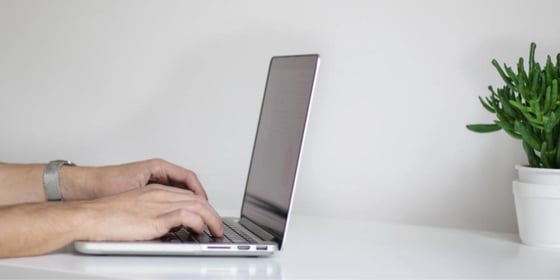
In Germany, the employment market is highly competitive. Many qualified and skilled individuals are looking for jobs in Germany, so it's critical to make an excellent first impression with your cover letter.
A well-written cover letter can differentiate between securing job interviews and being overlooked when submitting a job or visa application. A great cover letter demonstrates that you are serious about the position and have what it takes.
Read on for a guide on how to write the ideal German cover letter and an example format , plus some pointers and shortcuts to ensure that your cover letter is flawless.
What is a German Cover Letter?
You may submit a one-page cover letter ( Anschreiben ) from Germany when applying for a job or an internship. The cover letter introduces you to the potential employer and explains why you are the ideal applicant.
The German cover letter should be formal and polite. The tone should be positive and professional.
Tip: You may submit your resume ( Lebenslauf ) and cover letter in English or German when applying for a position . If the employment opening is in German, it is advisable to write your cover letter in German.
German Cover Letter Format
It is critical to use the correct format for your cover letter when applying in Germany. This implies that you should include your contact information (name, address, phone number, email) and the date at the top of the page. The letter should be addressed to the person in charge of hiring at the firm (if you do not have a name, you can use something more general, such as " Dear Hiring Manager ").
It is essential to keep it professional and easy to read regarding font style and size for your German cover letter. Times New Roman or Arial font in size 12 should be sufficient.
Begin your letter with a brief introduction and explain why you are interested in the position. Then, go into detail about your qualifications and accomplishments that make you the perfect candidate for the job. Be sure to emphasize any skills or experience relevant to the position.
In the second section, underline the skills and accomplishments that make you the perfect candidate. Be sure to emphasize any skills or work experience relevant to the position. Finally, in the third part, thank the company for their time and consideration . You may also include a statement of availability for an interview or mention that you will be in touch soon.
Close the letter with a professional sign-off (" Sincerely," "Best regards ," etc.), followed by your full name and signature.
Tip: If you've studied German , say so in your cover letter. This will demonstrate to the employer that you're serious about the position and have taken the time to learn more about their culture and country.
What not to include in a German Cover Letter
When writing your German cover letter, there are a few things that you should avoid doing.
- Do not repeat information from your resume or CV verbatim.
- Personal information such as your age, marital status, or the number of children should not be included. This data is irrelevant to the employer and may lead to your being discriminated against.
- Do not use informal language or contractions . The phrases "I'd want to," or "I'll be" are examples of informal language.
- Avoid a generic cover letter . Make sure that your cover letter is tailored to the position you're applying for. This will demonstrate to the employer that you are genuinely interested in working for them.
- Do not include a photograph of yourself.
- Do not use humor or try to be witty in your cover letter. This is a formal business correspondence; therefore, keep it serious unless stated otherwise.
- Do not make any negative comments about your current or previous employers.
- Do not reveal your salary expectations or demands during the interview. This may be discussed at length during the hiring process.
Keep the following in mind while drafting a German Cover Letter
A German cover letter should be concise and direct, as stated in the job description.
There's no need to include details about your interests or hobbies. The emphasis should be on your abilities and qualifications rather than your personality.
Employers may not be familiar with overly formal or technical language, so avoid it. Stick to simple, straightforward speech that anyone can comprehend.
Finally, double-check it for spelling and grammatical errors before submitting your cover letter.
German Cover Letter Template Ideas
Finding the ideal German cover letter template may be a challenging task.
The internet is your best friend for locating the perfect German cover letter template. Several excellent, free websites provide templates for various letters, including German cover letters.
Some of our favorites include:
Novoresume is a website that provides free templates for various letters, including German Cover Letters. The website offers several templates for different types of letters and varying levels of experience.
Resume.io is another website that has compiled the best German cover letter examples and templates to help you land your dream job.
Zety is a website that provides cover letter templates for various professions. The website offers both free and paid templates.
Cover letters can be tricky, but following a specific format can make the time to research much more accessible and help you get your dream job. Remember to personalize your letter for each job application and highlight relevant qualifications and experience.
Need help with your German CV?
Don't worry! Check out our German CV guide below to know everything you need to create an outstanding German CV
The Best Cities in Germany for Expats: Over vs. Underrated
German Political System
Working as a student in Germany
This might also be of interest to you

How To Draft a Perfect German CV [Format and Template Guide]
Did you know that Germany is one of Europe's most economically stable and job-friendly nations? The German job market is so strong that many people...

In Germany, the employment market is highly competitive. Many qualified and skilled individuals are looking for jobs in Germany, so it's critical to...

Letter of Motivation [Complete Guide]
When you apply to study at a good university, it's only reasonable to expect the institution to ask for evidence that you are keen to learn. In...
How to Write a Cover Letter in Germany
If you want to have the best chances to land your dream job in Germany, a good recommendation is to write a Cover Letter and hand it in together with your CV.
Especially because not everyone is willing to write a Cover Letter in this age anymore, we believe that writing a good Cover Letter is your chance to stand out positively from all the other applicants and get a step ahead in landing your dream job!
But how can you create a great cover letter? How should the document be formatted, and what should you write?
In the following article, we’ve put together a guide for how to write a Cover Letter that will help you find your dream job in Germany.
The typical Cover Letter in Germany follows a certain predefined approach that you should try to replicate. It follows the Norm of a typical German business letter that you should follow as well.
Cover Letter Formatting
Your Cover Letter should have the following information right on the top:
- Senders name and address on the top right
- Recipient’s name and address on the left
- Location and Date on the right
- Subject line in bold on the left
- Salutation to the person your addressing (if unknown e.g. “Dear Hiring Team”)
In the example below you can see what it should look like.
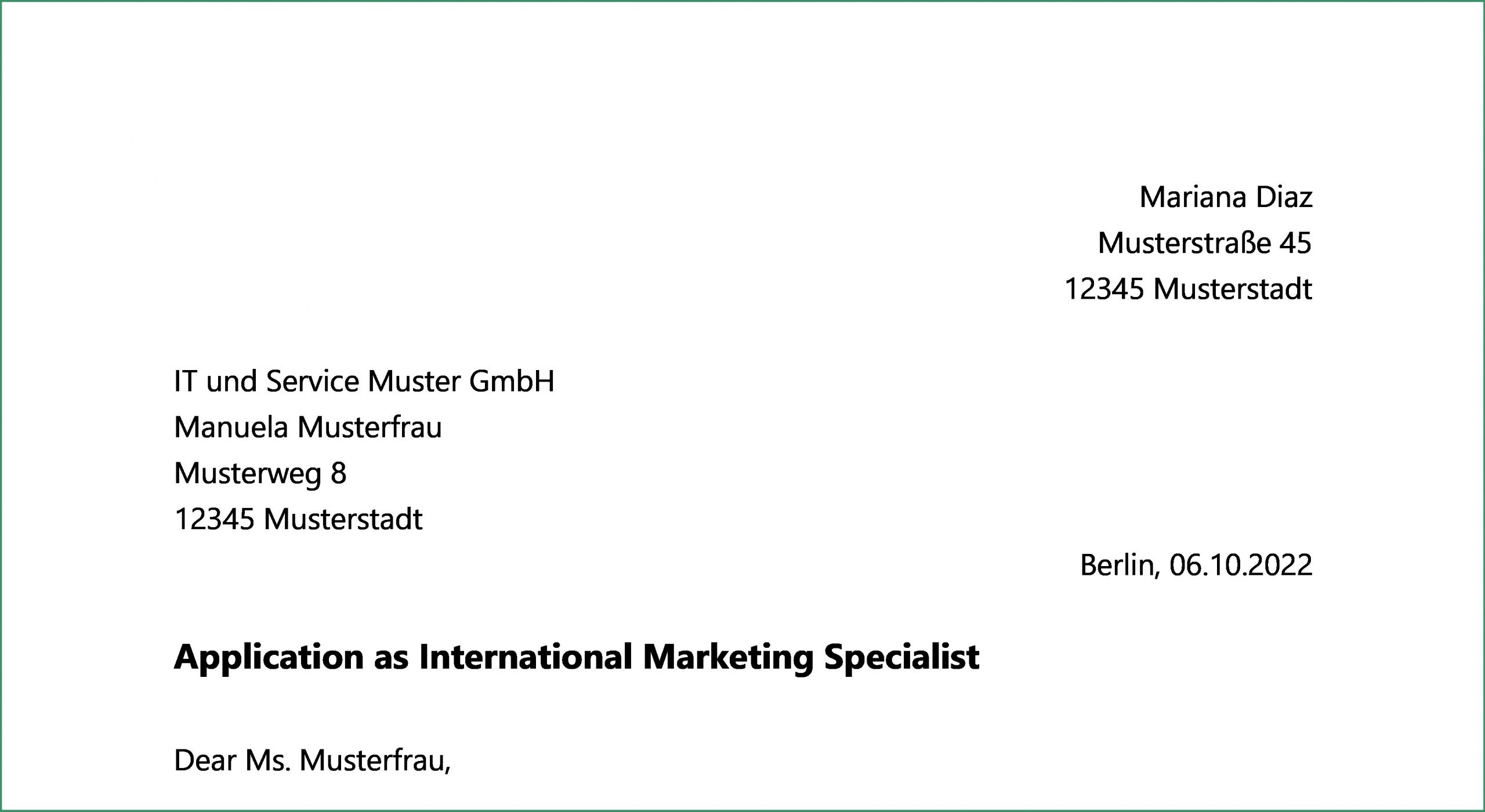
Example for how to format your German Cover Letter
You should also make sure to keep enough space to each side, at least 2,5 cm.
Cover Letter Content
Before we take a closer look at what to write, it’s important to consider the following: In the digital age, most recruiters inspect your CV first, and then turn to the Cover Letter.
That means, when reading your cover letter, they have already seen the CV. Hence, you should avoid repeating information that is already clear in the CV (e.g. telling them from when to when you worked at your latest job).
Instead, you should provide more personal information that gives context to your application and leaves the recruiter a chance to get to know you better and see the human behind the CV.
First Paragraph: Introduction
Contrary to what other people might tell you, you don’t need to have the “perfect” introduction sentence. Just can just get started with a simple introduction like this:
“ My name is … and with great interest I’m applying to your job opening as … ”.
Second Paragraph: Why you are the perfect fit
In the second paragraph, you want to explain why you are the perfect fit for their open role . Talk about what experience you have, what you’re passionate about, and what skills you bring to the table that are relevant for this role. This paragraph should not be too long. Consider that they already read your CV, so 3-4 sentences should be enough .
Focus especially on the part about why you’re passionate about what you’re doing, because this is new information that helps the reader to get to know you on a deeper and more personal level.
Third Paragraph: Why you are interested in this role at this company
If you have already read our article about how to write a CV in Germany , you know that we believe that you should personalize all your documents and not just send the exact same document to all companies . And the same goes for the Cover Letter.
That’s why in this paragraph, you should add something unique about the company. Ask yourself this: Why did you pick exactly this job to apply to and not others? What did you read on the Job Ad or on the company’s website that sparked your interest?
Again, keep it short and simple. 2-3 highly personalized sentences should be enough.
Fourth Paragraph: Thank you and Closing
Similar to the first paragraph, a simple ending is now all you need to close out the Cover Letter on a good note!
You can simply write something like this: “ Thank you for your time and consideration – I would be happy to learn more about the role in a personal interview. Kind regards, … ”
Summary: How to write a Cover Letter in Germany
Congratulations – if you follow these steps you’ll write a great Cover Letter that will take your application to the next level and help you stand out from all the other applicants!
This is also why we would advise you to always write a Cover Letter, even if the company doesn’t ask for it – because not everyone is willing to do it, you will be able to positively stand out. Especially if you write a personalized Cover Letter .
Did you enjoy this article? Then you might want to check out our Job Search Master Class: A step by step course created by German recruiters that will show you how to land your dream in 3 steps. In this Master Class you will not only find more, insights, video breakdowns, and even ready-made templates for your Cover Letter and your CV. You will also discover how to create an optimal LinkedIn profile and how to rock your job interviews!
Laura Villafuerte
You might also be interested in.

Headhunting oder Recruiting-as-a-Service: Die richtige Wahl treffen
Headhunting vs. Recruiting-as-a-Service: Was passt zu Ihrem Unternehmen? In der Welt des Personalmanagements stehen Unternehmen oft vor der Herausforderung, qualifizierte Fachkräfte für ihre offenen Stellen zu finden. Angesichts des harten Wettbewerbs

How to Get Feedback from Recruiters in Germany After a Rejection
Why do you not receive more feedback after a job rejection? Receiving a rejection for a job you wanted can sting. Yet, it’s not the end of the road—it can also

Recruiting trends 2024: Was sich verändert
Welche Recruiting trends muss man 2024 beachten? Laut OECD wird das deutsche Wirtschaftswachstum im Jahr 2024 geringer ausfallen als in den meisten anderen Industrieländern. Mit einem prognostizierten Wachstum von lediglich 0,6
German Cover Letter Guide: Complete Examples [+Tips]

Germans take their cover letters seriously. It's not a document they just glance at and trash like in most other regions. To get a well-paid job in a German company, you need a solid German Cover Letter.
German Cover Letter Example
Julia Brad Gastgeberin [email protected] 01 36 23 98 24 Berlin 10. Juni 2022
Herr Tobias Schmidt, Geschäftsführer, Restaurant Dae Mon, Berlin, Deutschland
Anschreiben für die Stelle der Hostess
Lieber Tobias,
ich bin eine zertifizierte Hostess mit mehr als 2 Jahren Erfahrung in der Hotelbranche und mache derzeit meinen Bachelor-Abschluss in Hospitality Management an der Universität der Künste Berlin.
In meinem vorherigen Job als Hostess bei Gabriel Kreuther in New York habe ich alle Aufgaben einer Hostess effizient ausgeführt, einschließlich der Entgegennahme von Essensreservierungen, der Planung der Sitzordnung und der Bearbeitung von Telefonanfragen. In meiner 2-jährigen Tätigkeit wurde ich außerdem dreimal als Mitarbeiterin des Monats ausgezeichnet.
Ich wollte unbedingt in eine deutsche Küche eintreten, um die Hostessenkultur in Europa kennenzulernen, und hoffte, dass das Restaurant Dae Mon ein großartiger Ort dafür sein würde, insbesondere wegen seiner langen Geschichte in der deutschen Esskultur.
Es wäre mir ein Vergnügen, die Stelle in einem Vorstellungsgespräch zu erörtern, und ich hoffe, dass dies der Beginn einer für beide Seiten vorteilhaften Zusammenarbeit sein wird.
Mit freundlichen Grüßen,
Beilage: Lebenslauf Referenzschreiben Zeugnis und Abschrift des Bachelor-Abschlusses
According to research carried out in 2013, about half of the applications German companies received without a cover letter were rejected – that’s how important your cover letter is in Germany.
Creating a cover letter in German-style needs you to have a clear understanding of what the German recruiter is looking for in the letter – it should demonstrate the academic and professional qualifications of the candidate and how that would help them achieve the company’s objectives.
Here, in this complete guide, we have discussed everything you need to write and create a perfect German cover letter for your next job.
This also includes:
- Style guide for German cover letters to impress native hiring managers.
- Detailed instructions on how to write each section of the cover letter.
- Pro tips to make your cover letter stand out from the rest.
Try out our resume builder for FREE to create your next German resume and cover letter . We have created a set of awesome templates to make your whole application process faster and smoother.
Read our complete German cover letter example and see how you can write yours.

How to Write a German Cover Letter
Your resume and the cover letter are what makes the first impression for the hiring manager about any applicant – create it right, and they will remember you in the interview. Well-written and well-structured cover letters increase your chances of getting shortlisted while making your attempt a solid one at the interview.
Writing a cover letter for a German employer is quite different from that of any other region – especially with the writing style and structure. German recruiters consider cover letters as an important part of a job application – they wish to speak to candidates who demonstrate their immense interest in the role.
These general guidelines would give you an idea of what the German hiring manager expects from you:
- Single-page is the standard length for cover letters in Germany.
- Do not write long sentences and paragraphs – make them short and clear.
- Stay formal throughout – don’t get emotional.
- Keep the body of the letter to 3 to 4 short paragraphs.
- Avoid self-promoting statements about the candidate.
- Use a modern cover letter template – ideally matching your resume.
Overall, a german cover letter should sound polite and it should always be in a formal language, whether it is in German or English. Draw a fine line between selling yourself and plain bragging - German hiring managers prefer raw data over-exaggerated self-promotional material.
German cover letter structure
Having a proper structure from the beginning would help you write an outstanding German cover letter – we also call this the layout.
We recommend the following:
- Subject line
- Opening greeting
- First Paragraph: candidate into
- Second Paragraph: skills, experience, and expertise
- Third Paragraph: motivation
- Fourth Paragraph: Call to Action (CTA)
Let’s discuss how each of these sections comes together to create your perfect cover letter.
Begin with the Header
As in your resume, the header of the cover letter consists of your name and contact details. The only difference here is that you should include the details of both the sender and the receiver, considering this a formal document.
Sender Information
Start with your name – write the first name and the last name – use a bigger font size and bold it. Put the job title under your name followed by your email, mobile number, location, and the date.
No need for your full physical address as you’re not mailing the letter.
Jason Smith
01 67 43 23 65
10 May 2022
Receiver Information
Put the receiver's name, job title, company name, and company address. If you don’t know the name of the person who would read your application, just address the “Hiring Manager”.
Frau Julie Zeigler
Einstellungsmanager
München, Deutschland
In German formal writing, “Frau” is used to address women and “Herr” is used for men.
- Frau for Mrs. and Ms.
- Herr for Mr.
On certain occasions, you’ll get to know the name of the hiring manager. However, if you’re not sure, do not include a name as most companies have more than one person involved in the hiring process.

The Subject of the Letter
Your German cover letter needs a subject as in any formal letter. Include the position you’re applying for in your subject.
Opening Greeting
You could use a formal greeting to open your cover letter either in English or German. There’re a couple of variations in greeting your hiring manager in the letter.
When you know the gender of the recipient:
Dear Mr - Dear Mr.
When you don’t know the gender of the recipient:
Paragraph 01: Candidate Information
Your first paragraph on the cover letter should hook the reader. The way you hook an American hiring manager and a German one would be quite different though. The job market in Germany is degree-focused – you should start with your qualifications and relevant experience to the job.
In the American job market, you could hook the recruiter with a sales pitch – talking about your special achievements and accomplishments in your previous jobs.
In Germany, if the position you’re applying for is an academic-based one, having the relevant degree or the academic qualification would most probably get you an interview – therefore, reveal them in the first paragraph itself.
See the following example of a production manager job:
Six sigma green belt certified production manager with a bachelor’s degree in Manufacturing from Massachusetts Institute of Technology seeks to join BMW to further my career in production planning and automation. I have 5 years of extensive experience in the automobile production industry working for Ford in the USA.
I got my bachelor’s degree in manufacturing and I am a six sigma green belt certification holder. I am passionate to join BMW in Germany for a well-paid managerial position in the factory.
State your academic qualifications in detail – most German hiring managers are looking for the right qualified individuals to call for interviews. Detail such as the institutions, GPA, class of the degree, and the name of the course could be included.
In writing your experience, state the number of years, the position you held, and the company name.
Keep it clean and simple – easy to read within 3 to 4 seconds.
Paragraph 02: Skills, Experience, and Expertise
Now, you’ve got the attention of the hiring manager as you got the qualifications they’re looking for. Let’s enlighten them with your key skills, the responsibilities you’ve held, the decisions you’ve taken – and their results.
It’s important to read the job ad and understand the keywords they have put on the job description. Most German companies use an applicant tracking system (ATS) – a system that is used to shortlist job applications. ATS recognizes the right applications by calculating the keyword density and a couple of parameters – the more relevant keywords you have on your cover letter, you got more chances of passing the automatic test.
Identify any troubling questions the hiring manager or your potential line manager faces – provide your solution with an example of how you tackled a similar situation at work.
Consider including your greatest professional achievement – with the results you generated for the company and its impact on the key performance indicators (KPIs) of you and the management.
As a production assistant manager at Ford, I headed a six sigma implementation project with a third-party consulting firm that resulted in a 12% increase in overall production efficiency. I have extensive experience in production line planning, automation, material requirement planning, and logistics.
I have experience in production and manufacturing at the Ford automobile factory in LA. Worked on many process optimization projects that saved lots of money for the company.

Paragraph 03: Motivation
Express your interest in joining the company. Convey your passion for the industry and how the job aligns with your short-term and long-term career objectives.
Here, your research about the company culture, vision, mission, and purpose would help – you could find more information on the about section of the company website.
This paragraph of the cover letter is an exceptionally important part as this is where the cover letter gets tailored to the employer. You need quite some research to identify the likes and dislikes about the job and the similarities of your career objectives with the company’s objectives.
The purpose of the cover letter is to convey your interest in the position and to demonstrate that you are a great match for the role. The purpose of reading a cover letter from the employer’s side would be to identify a good match for the role who is also excited to be part of the team.
Therefore, show your excitement throughout this paragraph.
My passion for the automobile industry and its future changes have made me want to become part of a European automobile manufacturer. I am especially excited about the new electric driving experience BMW is developing for the global market and hope to become part of the team in the future.
As BMW is one of the pioneers in manufacturing automobiles in Germany, I was excited to apply for this position.
Paragraph 04: Call to Action (CTA)
It’s always advisable to finish your cover letter’s body with a call to action. In any formal letter, you should inform the reader, of the move you’re expecting from their side. Any formal letter has an objective and you should remind it at the end – which is the CTA.
Ask the hiring manager for an interview – state your excitement to meet them.
Also, in the same paragraph, you could include the following information:
- Your availability for an interview.
- The type of visa you possess.
- The day you could start if they select you.
It will be my pleasure to discuss with you my role as a production manager in the BMW Munich factory and demonstrate how my experience and skills in automation and production optimization could easily be incorporated into your future sustainable driving vehicle projects.
You are welcome to contact me at your earliest convenience.
The German Cover Letter Closing
End your German cover letter with a formal salutation – you could use the same language as you write your letter.
Consider using the following closing sentence:
- Kind Regards: mit freundlichen Grüßen
- Sincerely: Mit freundlichem Gruß
- best regards: Freundliche Grüße
Put a note about the attachments you’re sending along with your cover letter. This could include your resume, academic and professional reference letters, degree certificates, transcripts, and other relevant certifications.
However, do not attach unnecessary certifications and documents with your job application as that would result in the important documents getting less attention from the hiring manager.
Tips to Improve Your German Cover Letter
If you followed the steps, you should already have an exceptional cover letter ready to send to any German recruiter. Optimize it further with these tips:
- Ask your native German friend to proofread the letter if you wrote it in German.
- Use a tool like Grammarly to check for any mistakes – your cover letter should have absolutely no spelling errors or grammar mistakes.
- Don’t use automatic text generators to write your cover letter – make it sound like an actual human being.
- Read the job description thoroughly to identify the relevant keywords.
- Do not use long wordy sentences – be clear and concise in your writing.
- don’t use bullet points.
- Try to find the person who reads your cover letter and tailor it to them.
- Don’t send the same cover letter for two jobs.
- Use a professional font such as Times or Arial.
- Maintain a consistent writing style that is formal and respectful – do not use passive voice.
- Consider using a modern cover letter template to make your application stand out.
Key Points: Writing a Perfect German Cover Letter
- Pick the right cover letter template that goes with your resume.
- Give priority to your academic and professional qualifications.
- Follow the generally accepted German styling guide for formal letters.
- Tailor your cover letter to each job you’re applying for.
- Write 3 to 4 solid paragraphs on your qualifications, skills, and enthusiasm.
- Finish with a CTA.

Complement Your Cover Letter with a Well-written Resume
You could apply to most jobs with just a resume – therefore, it's important that you get your resume done right. In fact, your German job application completes with a resume and a cover letter that complements each other.
A resume highlights the candidate’s skills, experience, and academic qualifications while a cover letter is a tailored document to each job on the candidate’s fit for the position.
Complement your cover letter with a great German resume – pick a template that matches your personality. You may try our resume builder to create your CV and the cover letter – which would allow you to apply for jobs faster than ever.
Do I need a cover letter to apply for jobs in Germany?
It's not mandatory to submit a cover letter in Germany. Most companies accept job applications with just a resume. However, sending a cover letter along with your resume indicates your interest in the job. It means you’re a serious candidate – not someone who applies to every job you see on the internet.
Should I include a picture on my German cover letter?
You can. Check whether your German cover letter template allows you to put a photograph. German companies are generally fine with applications that include pictures of the candidate. However, if you’re applying for jobs in international companies and multinationals – especially, USA, UK, or Australian companies based in Germany, consider not including a photo as these companies may cause immediate rejection of your applications.
Read our complete guide to including pictures on your resume .
Can I write my German cover letter in English?
You can and you should if you don’t know how to write your cover letter in the German language. A mistake some candidates make is that they get a freelancer to write a perfect German-language cover letter and a resume and send it to jobs in Germany. The problem here is that the recruiters often misread the attempt as the candidate is fluent in German. This may get you an interview, but you’ll probably fail it when they realize your level of fluency.
Should I put my salary expectations in my cover letter?
We do not recommend you to put your salary expectations in your cover letter or anywhere in the job application unless the hiring manager has explicitly asked for it. Keep it for the interview – you’ll get time to discuss it or they’ll give you an offer.
Tasuta allalaetav kaaskirja mall
Motivatsioonikiri, millele on enamikul juhtudel lisatud CV, on iga töötaotluse põhielement. Seda tüüpi kiri peab lühidalt kirjeldama oskusi, võimeid ja teadmisi, mis teil on ja mis on teatud huviga seoses otsitava ametikohaga. Selles mõttes peab kaaskiri lihtsalt sisaldama sellele ametikohale kandideerimise motivatsiooni ja põhjendusi. See peab äratama värbajas huvi ja panema ta pidama teid selle töö jaoks parimaks võimaluseks.
Kuidas koostada lihtsat kaaskirja
- 1 Valige oma valitud CV mall.
- 2 Austab ühtset struktuuri. Näiteks kasutage kaaskirja struktuuriga "Sina-Mina-Meie".
- 3 Lisage järgmised osad, apellatsioonivorm, lühitutvustus, kirja sisu ja järeldus
- 4 Ärge unustage viimast viisakusvalemit. Vaadake kaaskirja viisakusvalemite näiteid.
- 5 Isiklikuma ja formaalsema ilme lisamiseks lisage lehe allossa oma allkiri
- 6 Kui soovite saata selle meili teel, eksportige oma kaaskiri PDF-vormingus.
Teised kaaskirjade näidised
Kaaskirja struktureerimise nõuanded.
Kaaskirja kirjutamise hõlbustamiseks pidage meeles, et koguge eelnevalt kogu vajalik teave. Näidake toimetaja loovust, järgides samal ajal tüpograafiliste reeglite õiget kasutamist ja jälgides, et ei tekiks kirjavigu. Sest hea kaaskiri peegeldab teie kuvandit inimese ja professionaalina. Olge oma kirjutamisel loominguline ja originaalne, jäädes samas lihtsaks, kokkuvõtlikuks ja täpseks. Näidake läbitud punktide ohutust, enesekindlust ja meisterlikkust. Rõhutage, mida saate ettevõttesse tuua ja mainige oma erialast kogemust vastavas valdkonnas. Märkige ka kõik põhipunktid, mis panevad teid end uute ideedega täitva transformeeriva agendina ilmuma. Täpsustage oma võimet saavutada kavandatud eesmärgid ja kohaneda uute suundumustega.
Näita ennast positiivselt. Ärge langege sellesse viga, et kasutate sama kaaskirja mitme ettevõtte jaoks. Koostage kaaskiri iga taotletava töö kohta. Seda tüüpi kiri võimaldab tööandjal kujundada teie isiksuse kohta arvamust, sest see annab teile võimaluse täpsustada oma motivatsioone, mida lihtsas CV-s tegelikult ei kirjeldata.
Lihtsa ja tõhusa kaaskirja kirjutamise soovitused
- Laiendage Intro Pidage meeles, et pärast kõne valemit peate välja töötama sissejuhatuse, kus tutvustate end ametlikult ja isiklikult. Ärge unustage märkida peamist eesmärki, mis ajendas teid seda kirja kirjutama.
- Struktureerige oma kirja sisu Laske end juhinduda järgmistest küsimustest: – Miks?, Mis eesmärgil?, Kuidas?, Miks soovite selles ettevõttes töötada? → selles osas peate kirjeldama, mida saate ettevõttele tuua. – Rõhutage, kuidas teie teadmised võivad oluliselt mõjutada ettevõtte funktsioonide arengut ja majandussektorit, kus ta tegutseb. - Kuidas te seda teeksite tee seda? → lihtsalt rõhutab teie teadmisi ja võimeid professionaalina – Rõhutage oma õnnestumisi, varasemaid kogemusi, diplomeid, saadud tunnustusi või auhindu.
- Olge oma järeldustes otsekohene Andke teada, et olete vestluseks saadaval, esitades kontaktteabe, näiteks oma e-posti aadressi, telefoninumbri ja postiaadressi. Kui need kontaktandmed muutuvad, ärge unustage uuendada oma CV-d ja kaaskirja ning saata need uuesti ettevõtetele, kes on need juba saanud.
- Hoolitse paigutuse eest Teie kaaskiri peab olema kooskõlas teie CV-ga. Värbaja peab esmapilgul nägema, et need 2 dokumenti moodustavad ühe taotluse. Kasutage oma kaaskirjas samu värve, fonti, ikoone jne, mis oma CV-s. See väike näpunäide aitab teil luua tõhusa ja professionaalse rakenduse.
Create your resume with the best templates

Domande frequenti sulle lettere di accompagnamento
Lorem ipsum dolor sit amet, consectetur adipiscing elit. Suspendisse varius enim in eros elementum tristique. Duis cursus, mi quis viverra ornare, eros dolor interdum nulla, ut commodo diam libero vitae erat. Aenean faucibus nibh et justo cursus id rutrum lorem imperdiet. Nunc ut sem vitae risus tristique posuere.
What’s a Rich Text element?
The rich text element allows you to create and format headings, paragraphs, blockquotes, images, and video all in one place instead of having to add and format them individually. Just double-click and easily create content.
Static and dynamic content editing
A rich text element can be used with static or dynamic content. For static content, just drop it into any page and begin editing. For dynamic content, add a rich text field to any collection and then connect a rich text element to that field in the settings panel. Voila!
How to customize formatting for each rich text
Headings, paragraphs, blockquotes, figures, images, and figure captions can all be styled after a class is added to the rich text element using the "When inside of" nested selector system.
Create your resume in 15 minutes
Our free collection of expertly designed cover letter templates will help you stand out from the crowd and get one step closer to your dream job.

Sample letters to download

Cover Letter
Advice for getting a job, instructions.

My Life in Germany
All you need to know about studying, working, and living in Germany

How To Write Your Cover Letter in Germany (+ English Example!)
This post contains affiliate links. It means that if you click on the links and make a purchase, we will receive a small commission at no additional cost to you. This allows our blog to continue providing you with free information. We only include links and products that we truly believe in. You can read the full disclosure here .
Moving to Germany or new in Germany? Check out our Resources Page for all the help you need!
Looking for a job in Germany and wondering how to write your cover letter? You are at the right place. In this article, you will learn how to write your cover letter in Germany, including the format, style, and structure. We also include some tips here on writing your cover letter in Germany. You can also download a free German cover letter example (in English).
Table of Contents
Introduction
7 seconds . This is how long it takes to form a first impression . So, giving an excellent first impression in the interview is essential. But do you know that your first impression is not formed in the interview? It is formed in the first contact you make. You are right. The first contact is your job application.
That is why sending a good CV and cover letter in your job application is very important. This determines whether you have a chance to come to an interview, where you can make your first impression (physically).
What is a cover letter (Anschreiben)?
Your cover letter is the very first impression you give your potential employer. It is one of the deciding factors whether you get a job interview or not. If it catches the recruiter’s attention, he will want to learn more about you by inviting you to an interview.
So, your cover letter should highlight your skills and experience that fit a job’s specific requirements. You should use many examples and facts to convince the recruiter why you are uniquely qualified for the role. Tell the recruiter why you want to work for that company.
The cover letter should be professional. The goal is to supplement your CV but not duplicate it. While your CV focuses on your skills and experiences, your cover letter should focus on your motivation and how you can apply those skills to the job.

Do you really need to write a cover letter in Germany?
You may not need a cover letter for your job application in many countries. How about in Germany? How important is it to have a cover letter?
In Germany, a cover letter was one of the most essential elements in a job application. However, its importance seems to reduce in recent years.
According to a survey, 59% of the recruiters in Germany accept job applications without cover letters. Many think that having a CV is already sufficient.
However, if you want to increase your chance of landing your dream job, it is still better to write a cover letter. Imagine if 59% of the recruiters in Germany do not require a cover letter. It means that the other 41% will.
Not having a cover letter reduces your chance of getting an interview invitation. You may even get an immediate rejection because of not submitting a cover letter.
Should you write your cover letter in English or German?
This is a tricky question. Unless specified in the job advertisement, it is better to submit your cover letter in German. However, if you do not speak any German, it may be better to submit your cover letter in English.
Why? It is because you won’t want to give false hope to the recruiter that you speak German while you cannot.
I once went to an interview in Germany after submitting my CV and cover letter in English. Back then, I did not speak any German. When the interviewer saw me, he was shocked that I couldn’t speak German. The interview ended immediately after that, and I didn’t get the job.
So now, imagine you send all your application documents to the recruiter in perfect German. It is logical for the recruiter to assume that you speak some German. You will probably not get the job when you are not meeting his expectation, especially if he is looking for someone who can speak German.
If you do speak some German (even not perfect), you may want to submit your cover letter in German. In that case, make sure your cover letter has no spelling or grammatical mistakes. To be perfect, you can also use a translation service or a cover letter writing service .
On the other hand, if the job advertisement is written in English and you do not speak any German, try sending your cover letter in English.
Even though insufficient German skills limit your opportunities, many international companies in Germany do have their hiring process in English. Here is how I got my permanent full-time job in Germany without speaking German.
Sending your cover letter in Germany
Many big companies require you to submit your cover letter and other application documents via their online portal. In that case, send your application documents such as cover letter and CV in PDF format.
Give a relevant name to each document. For example, use names such as “Your Full Name_CV” or “Your Full Name_Cover Letter”. This will make your documents look more professional. It will also be easier for the recruiters to identify your documents.
Some companies may require you to send your application via email. In that case, attach in the email all your application documents such as your CV, cover letter, and other certificates in PDF format. In the email content, write a short introduction about your application to the particular role and mention the attached documents.
Alternatively, you can copy and paste your cover letter into your email. Remove the address and the date in that case. Use your subject line in the cover letter as the subject of your email. The content of your email basically becomes your cover letter.
The format of a cover letter in Germany
A cover letter in Germany is a very formal letter. It follows the basic format of a typical business letter. Recruiters in Germany are used to this specific format. So, you should try to follow this format. Your cover letter may be viewed negatively if you use a format that is too different than the norm.
Keep it short and straightforward. Your cover letter should not be longer than one page. Also, leave plenty of space and don’t fill the page completely.
The standard font size is 12. Your font should be readable. Do not use an unusual font that is too big or too small. Use a professional font such as Times New Roman.
Besides, use the same fonts and font size throughout your cover letter. Your cover letter should be easy to read.
You should also use the same formatting in all your other application documents. For example, you should use the same style for both your CV and cover letter.
Your cover letter needs to be readable. Don’t write a large block of text in your cover letter. Separate your text with clear paragraph breaks. There should be enough spacing between the different paragraphs as well.
Your cover letter should follow the layout rule called the DIN 5008 Norm . It means that on an A4 size letter, the margin should follow the below standard:
- Left margin: 2.5 cm
- Right margin: 2 cm
- Upper margin: 4.5 cm
- Lower margin: 1.5 – 2.5 cm
The structure of a cover letter in Germany
Your personal info.
You should include your personal info in the top right-hand corner. This includes your full name, address, phone number, and email. Your email address should look professional, ideally with your name on it.
The company’s info
You should write this on the left-hand side below your personal info. Put the company name, contact person, and company address there. You should put the contact person’s name on the second line, under the company name.
Usually, you can find the contact person’s name in the job advertisement. If not, don’t be afraid to call the company to find out who handles the job applications.
Write the date in European format and place it below the company’s info on the right-hand side.
The subject line should state what position you are applying for. You should bold it so that the recruiter can easily spot which position this cover letter is for.
Use the name of the contact person you stated in the company’s info. Research the company culture to see if using the first or last name is more appropriate. If you are not sure, always go for the last name.
This should include:
- The first paragraph (introduction)
- The second paragraph
- The third paragraph
- The last paragraph (short closure)
Sign here and write your name below your signature.
Enclosure (Anlage)
Under your signature, you should name which attachments you are sending in the job application, e.g., CV, reference letters, etc.
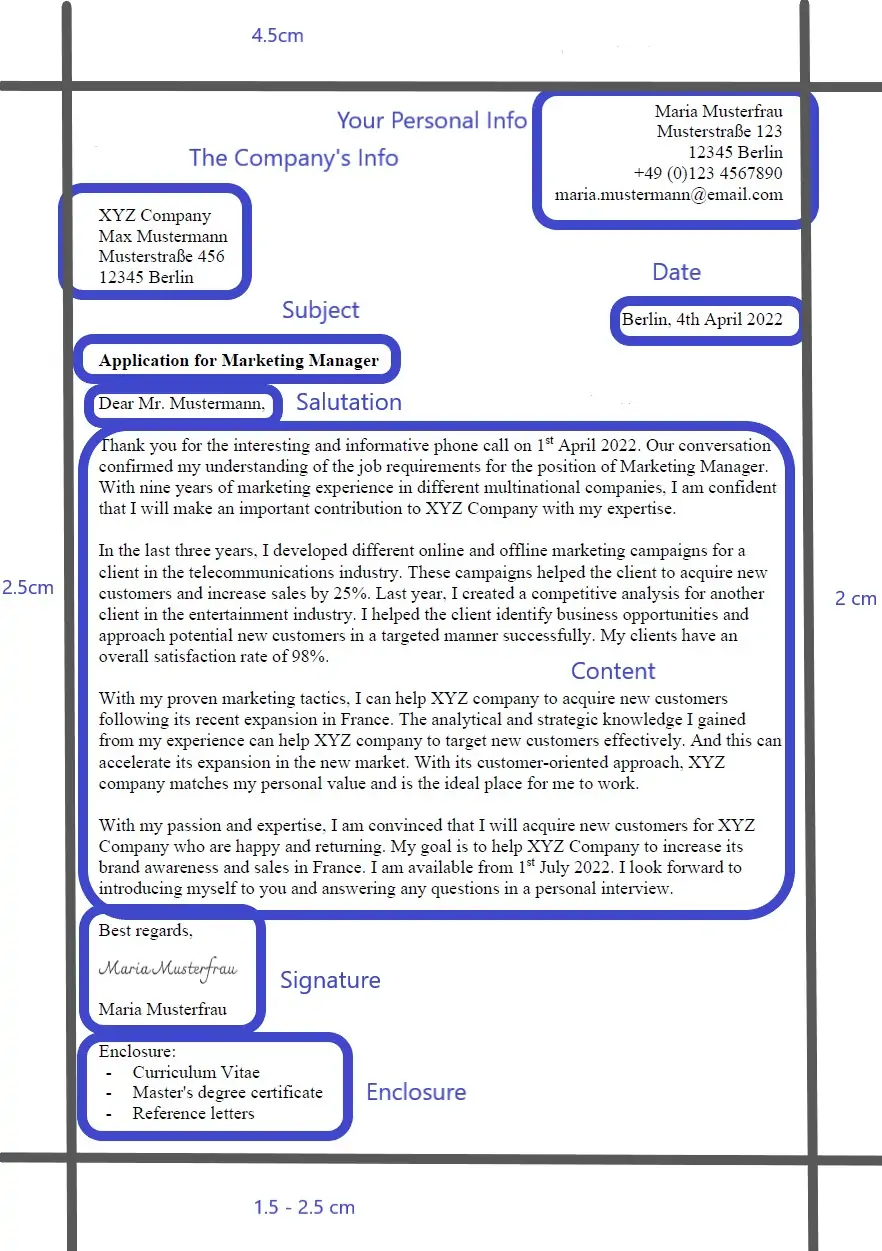
The content of a cover letter in Germany
The content of a cover letter in Germany should consist of four paragraphs. Do not repeat what you have stated in your CV. Your cover letter should sound unique. The goal is not to tell your whole story. Instead, give a preview and make it interesting enough so that the recruiter wants to know more.
Position yourself ahead of other candidates by focusing on the value you can bring to the company, but not what you can get from the company.
The first paragraph (introduction) – 3 to 4 lines
This is an important paragraph. The recruiter reads this to determine if he wants to continue reading your cover letter. So, the goal of this paragraph is to arouse interest and make the recruiter continue to read.
Why are you applying for the position?
For example, you want to have a career change, or you have just relocated to the city. And explain why. You should promote yourself even if you are unemployed by mentioning something positive.
Also, mention something company-specific. For example, you can convince the company that you want to work there because of their company mission. Maybe the company operates in a way that minimizes damage to the environment? Or perhaps the company sponsors social projects?
Where did you learn about this position?
State where exactly you learn about the position, e.g., from a job portal. If you talk with someone from the company at a job fair, mention the person’s name.
Similarly, if you learn about the position via a friend or an employee from the company, mention this person’s name as soon as possible. This can arouse interest and encourage the recruiter to keep reading your cover letter.
What is your current position?
If you want, you may also describe your current position here. If you have not graduated yet, you can mention your course of studies.
The second paragraph – 5 to 6 lines
This paragraph should show your skills, abilities, qualifications, and experience. Mention any achievement that makes you unique and show your strength. Make sure to mention only those that are related to the position.
Tell the recruiter where you learn these skills, for example, from your past job experiences. Don’t be afraid to mention your private projects if they are relevant. It can show your personality and your initiative beyond your profession.
Remember, you should not be just telling. You should prove your skills with evidence. For example, instead of just saying that you have good leadership skills, mention that you have successfully led a specific project as an example. Do not write too many details, though. The recruiter can read the related information in the CV.
The third paragraph (5 to 6 Lines)
Here is where you link your skills to the position you are applying for. Show how your unique skills and experiences listed in the last paragraph are relevant to the job and the company. Tell the company exactly what you have to offer and how you can help the company to be successful.
Use some personal examples to show how you can use your experience to help to achieve the company’s goals. Tell them what you can do for the company that no one else can do.
Pay attention to which skills are listed in the job description. Make sure you demonstrate how you own these skills by providing examples.
Besides, explain why you want to work in this particular company and this role. Look at the company’s missions and vision. Check the company’s website or social media channels to state any exciting facts.
Maybe you are interested in the company because it supports social projects? Or perhaps because it has an informal corporate culture? Be genuine and tell the company why working there aligns with your values. Make sure to mention the company’s name.
The last paragraph (short closure) – 3 to 4 lines
This is where you highlight your interest again. Describe what you wish for the future and explain how you can contribute to the company. Tell the company when you can start working, and only mention your salary expectation if required.
Close politely by saying that the company can contact you in case of any questions and you look forward to talking with them in a job interview .
Free Cover letter example to use in Germany
Do you want to feel what a cover letter looks like in Germany? Here you go.
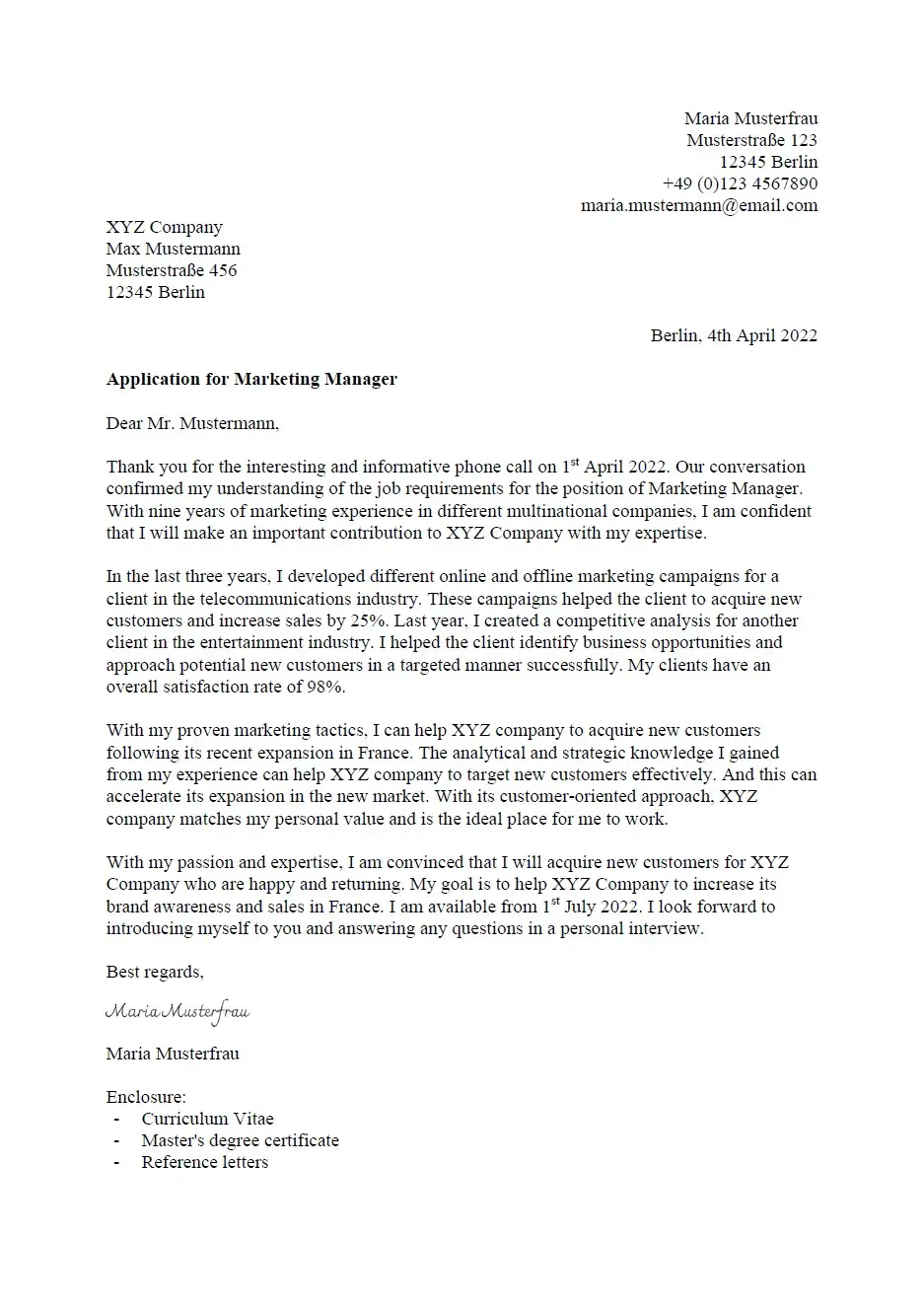
You can also download this German cover letter example for your own use here .
10 Tips to write your cover letter in Germany
1. do not use the same cover letter for different job applications.
Different jobs have different requirements and descriptions. Every company is different. You should tailor-make your cover letter for each job application. This is important because recruiters want to see that you have made an effort when applying for the job.
You should research the company and tell them why you want to work for them specifically. Mention what attracts you to work there based on your research. Check the company’s website, review, and social media channels to get some ideas. Pay attention to the job requirements and relate to them when writing your cover letter. You should also write with the same wording and tone used by the company.
Recruiters can feel it if you just use a general cover letter without mentioning some facts about the specific company. So, show your research capability and customize your cover letter.
2. Include keywords in your cover letter
Many recruiters use software that scans application documents and searches for specific keywords. This software helps to filter out irrelevant applicants and thus saves time for the recruiters.
What does it mean for you? Well, suppose your application documents do not include the keywords the recruiters want to see. In that case, your documents will be filtered out and never be seen by the recruiters. So, including keywords helps you to pass the first stage and get your application documents in front of the recruiters.
Want to understand if your application documents include the right keywords? Use this free tool to get your CV analyzed! You can see how the software presents you in front of the recruiters regarding top keywords and skills.

3. Proofread your cover letter
Your cover letter in Germany should not have any grammatical or spelling mistakes. Make sure you contain the correct details, the right company name, and the proper job position. Otherwise, it will show that you are careless and not professional.
The best would be to have someone else proofread your cover letter. You can ask your friend or hire a professional to do it. This is especially important if you decide to submit your cover letter in German and you are still learning German. In that case, you may want to use the proofreading (and/or translation) service from Lingoking .
Writing your cover letter in German may have the advantage that your letter includes the right keywords scanned by the software.
As mentioned before, only write your cover letter in German if you have sufficient German language skills. You won’t want to give false hope to the recruiters that you speak perfect German while you cannot. You can also indicate your German language level in your cover letter and CV. This is so that the recruiters have a realistic expectation of your language skills.
Suppose you want your whole application to be taken care of. In that case, TopCV offers packages including both the CV and cover letter. The service ensures that your application documents are professionally written, well-formatted, and keyword optimized.
4. Be honest and confident
Your cover letter should reflect the truth. For example, do not write that you can communicate in German while you cannot. Instead, indicate that you are working hard on improving your German. The recruiters will appreciate your effort if you are sincere and can prove it with examples.
Besides, you need to be confident and state clearly why the company should hire you instead of other candidates. Show confidence by writing “I am sure I will…” instead of “I think I would…”. Mention the interview like it is going to happen. For example, you can write, “I am looking forward to discussing more with you in a personal interview.”
5. Keep it short and relevant
You should keep your cover letter on one page. Use a simple layout so that your letter is easily readable. Only write relevant information on why the company should hire you. Avoid flowery language and long wordy sentences.
Your cover letter shows your ability to sell yourself without much fluff. It should be concise and full of sound arguments why the company should hire you specifically.
6. Make sure your social media is clean
Nobody wants to see drunk pictures of you at a party. Before applying for jobs, search the internet with your name and see what comes up. You should remove any unprofessional content on your social media, such as Facebook or Instagram.
Besides, create a professional LinkedIn page. Nowadays, many recruiters rely on LinkedIn when searching for talents. Make sure your LinkedIn page looks professional and up to date.
7. Avoid passive voice
Your cover letter should sound positive. You should use only active verbs because they make your writing more exciting and dynamic. You can show the “who” and “how” in a sentence.
On the other hand, passive voice is generally weak. It describes simply a state of existence without action. In your cover letter, you should sound active and be responsible for your achievements.
8. Think from the perspective of the recruiters
My friend once asked me to proofread her cover letter. I was shocked to see that everything was written from her perspective and why she wanted to work for the company in her cover letter.
When writing your cover letter in Germany, make sure it is not all about you. It is about what value you can bring to the company. Think from the perspective of the recruiters. What are they looking for? What do they want to see from a candidate? Rephrase your skills and experiences and make them relevant to the requirements stated in the job advertisement.
It is not just about what you can get from the company but also what the company receives from you.
9. Use examples
Do not just mention you have good communication skills or leadership skills. Instead, you should prove your skills by giving examples. Use numbers and data whenever possible. For example, leading a team of 10 people or leading a project that resulted in a 10% increase in revenue. Focus on the result and not simply your participation in the project.
10. Formatting and style are important
Your cover letter should be formal. Use complete sentences instead of bullet points. You should also use the same formatting and style in your CV so that your application d ocuments look consistent. Avoid unusual font and size. The best is to follow the German format de scribed in this article.
The cover letter is an essential part of your job application in Germany. Its goal is to get an invitation to the job interview. Your cover letter allows you to show your personality based on your tone and how you write.
Take it seriously. Be concise, professional, and also friendly. Remember to adapt your cover letter to the style of different companies. Good luck and happy job hunting in Germany!
Pin it for later:

How is your job hunting progress in Germany? Did the recruiters in Germany ask you questions based on your cover letter? Leave a comment below and share your experience!
If you found this article helpful, consider supporting this website by buying me a coffee. Every small donation helps to keep this blog alive . You can also ask me any questions here. Buy me a coffee
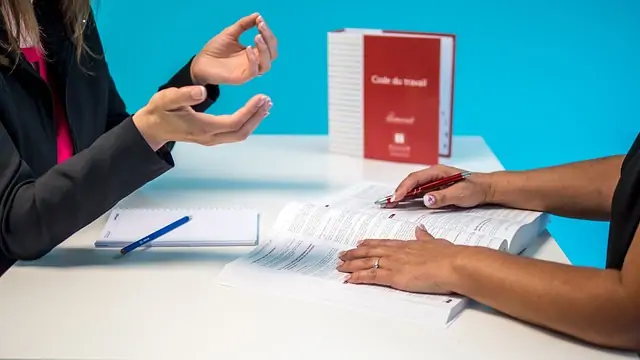
Leave a Reply Cancel reply
Your email address will not be published. Required fields are marked *
Notify me via e-mail if anyone answers my comment.
I consent to My Life in Germany collecting and storing the data I submit in this form. (Privacy Policy) *
Yes, subscribe me and send me my MONEY SAVING GUIDE IN GERMANY for free!
This website uses cookies to improve your experience. We'll assume you're ok with this, but you can opt-out if you wish.
Cookie Settings

Press ESC to close
Life in Berlin » Find a proper job in Berlin – a guide to a better work life » German cover letter guide – what recruiters expect
German cover letter guide – what recruiters expect
Writing a German cover letter in another hurdle on your path to getting a job in this country.
While the general purpose & content is probably similar to what you already know in your home country, some adaptation work might be necessary . This guide points out to the elements to include so you can convince recruiters you are the right one for the job.

Is a German cover letter still relevant?
Before putting in the efforts to actually write a German cover letter ( Bewerbungsschreiben , Motivationsschreibe n or Anschreiben ), you might wonder if it’s necessary at all.
A lot of recruiters don’t read it
This 2018 study by German recruitment agency Robert Kraft found out that 48% of recruiters didn’t find cover letters so relevant anymore , meaning that applications with CV only were considered valid.
In 2019, the Deutsche Bahn even stopped requesting cover lette rs all together, mentioning a lack of relevance. German ecommerce giant Otto did the same in 2016.
That lines up with my small experience as a recruiter & professional involved in the recruiting process. Motivation letters are rarely a differentiator, especially for more senior profiles. However, even if there is a trend to do away with it, most German recruiters will request a German cover lette r.
I will tell you why.
It still helps you to get an interview
Even if hiring managers will never glance over it, more & more companies are using Application Tracking Systems (ATS). It’s a piece of software that automates part of the recruiting process. Its purpose is to filter most applicants so the actual human HR manager only need to assess a few profiles for interviews.
ATS will compare requirements set by HR with what is on your CV and… your cover letter! It will search for the right keywords and compare them with the initial job ad.
Formatting your cover letter the right way, with the right keywords, it will maximize your chances to get invited to an interview.
Can I send my cover letter in English?
Since many applicants will only consider English-speaking jobs in Berlin or the rest of the country, it is a legitimate question.
I actually answered the same question on my post about German CVs . It applies to cover letters as well. (Spoiler alert: it depends.)
How should a German cover letter look like
At first glance, it looks like this. Read on for more details.

The header contains the typical information you would expect:
Your contact details
- First name and family name
- Street, street number
- Postal code, city
- e-mail address
- phone number
The employer contact details
- Correct company name
- Name of hiring manager
- Street, street number,
It also contains the date at which the application was made
Subject line
The subject line simply includes what position you are applying for. Consider it a reminder for the hiring manager who has to process several applicants per day. Copy-paste the title from the job description. Salutation
A simple and personal touch by greeting the hiring manager by their names. Avoid “To whom it may concern” at all costs. Get a feel of the company policy about using first names or Mr/Mrs/Ms.
The actual cover letter
You will read a lof of tips on how to properly structure your content. German cover letters don’t differ so much from what you can find anywhere in the world. You should answer the 3 following questions well:
- Why you are a good fit or the job : this refers to how well your career/work experience has prepared you to take on the responsibilities listed in the job description. You should prove that the path you are on is naturally leading you to this position.
- What makes you think you can do the job : this refers to quantifiable/tangible achievements that can prove that you can solve the challenges ahead. Refer to specific skills mentioned in the job description and demonstrate how you already own them.
- Why this company attracts you in particular : you need to demonstrate a genuine interest in having this job at THIS company. This requires a little bit of background check on the company’s missions and vision. You need to get a feel of the identity of the company. Show that they align with your values and that it’s a good place to grow for you. Check the company’s LinkedIn feed to see if there are events, achievements you could relate to.
Leave a lasting impression after mentioning practical details:
- State your availability and when you can start.
- If it was requested in the job description, state your salary expectations .
- State again how much you would like this job and how much you can demonstrate your motivation in an interview.
Tips for success
- Stay formal & don’t get emotional
- Match the linguo/wording used by the company in the job description. Each company culture is unique
- Do not use bullets points
- Keep your letter machine readable by using a simple layout
- Sprinkle your letter with the right keywords so the ATS software puts your profile on top of the pile.
- Match the font & styles used on your CV.
- Do not use passive voice . Make sure you only use active verbs.
- Prefer sentences that show ownership & confidence (eg: “I think I could” -> “I am confident I will”)
I hope this little guide was useful. Feel free to ask questions the comments. Bastien
German cover letter – FAQ
The actual content of the letter should not be longer than 4-5 paragraphs, with 2-4 sentences each. It should fit on a single page with plenty of space towards the bottom.
You can probably find a job in Berlin without a German cover letter, as a lot of international companies conduct their hiring processes in English only. However, that limits your opportunities a lot.
Share Article:
Bastien - settle in berlin.
Active since 2011, I help any newcomer tackle all practical aspects of moving to Germany. Everyday, up to 2500 visitors come find answers on registration, tax returns, unemployment, insurance, visa applications and more. Over the years, the value of this work has been recognized and featured on Expat.com, Vice, Berliner Zeitung, Financial Times & more.
Crafting a German CV for success – get noticed by recruiters
This should included on an invoice in germany.
This site uses Akismet to reduce spam. Learn how your comment data is processed .

How to Write a German Cover/Motivation Letter (Anschreiben)
June 11, 2013 mkenyaujerumani Business , Entertainment , Jobs , Life , Studying , Tips 2
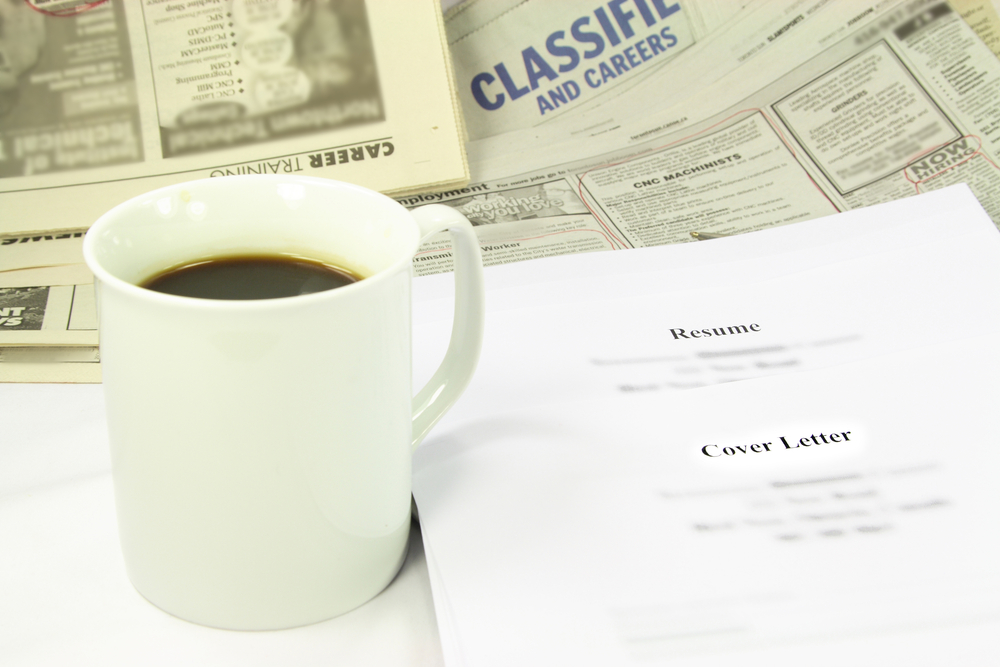
This is the main letter in your application documents because it gives the potential employer an insight into who you are and what you are capable of delivering.
Unlike your usual english cover letters where you are allowed to be creative with your words, the German cover letter is more direct and to the point. A Cover letter should answer the following questions:
- Does the applicant suit the position?
- What are the applicants’ strengths and how are they (the strengths) relevant to this position/company?
So here are a few tips on how to do it right:
Salutation:
- Find out the exact contact person and their title(s) before you start writing the letter and use it, “ Sehr geehrter Herr Prof. XYZ ” or “ Sehr geehrte Frau Dr. ABC “. Avoid the general “ Dear Sir/Madam ” or “ Sehr geehrte Damen und Herren “.
- When in doubt, please use “ Dear Sir/Madam ” or “ Sehr geehrte Damen und Herren “, don’t assume it has to be one. It’s more irritating reading a letter addressed to a “Sir”, when you’re a woman or vice versa.
- Tailor the letter to the position you’re applying for. Avoid having one letter that you send to all employers. Even when you have one letter, make it personal. Instead of “ I’ll be an asset to your company “, change that everytime you send to a new company and write it as, “ I’ll be an asset to Company XYZ “. Looks like you prepared and you know which company you’re applying to.
- Include qualities you have that you think might be relevant for the position. Reading and rereading the job advert will help you pinpoint what qualities they are looking for.
- Avoiding naming your qualities like you have a list to fill. Always support your quality with a bit of background e.g. “I enjoy working with children”
- You can have your address either at the top of the page in a single line as shown or in the same format as the company address shown
- Include the job reference number, especially if you found the advert on a separate site or newspaper. You can leave it out if you are applying directly through the company website.
- Avoid fancy fonts unless you work in the creative sector.
You might need to also read about writing a German CV
(your address can either be on a line at the top of the letter or as a paragraph)
Mkenya Ujerumani, Musterstrasse 20, 78495 Musterstadt. Handy 01577776543 Email: [email protected]
Frau Ypsilon,
Company XYZ,
Musterfelderstrasse 2,
0345 Musterstadt.
Musterstadt, den 11.05.2013
Bewerbung um die Position als Kokorikor (Kennziffer 987)
Sehr geehrte Frau Dr. Ypsilon,
short intro on why you are writing: Mit großem Interesse habe ich Ihre Stellenausschreibung in der Frankfurter Allgemeine Zeitung gelesen und bewerbe mich für “ die Position als Kokorikor (Kennziffer 987) “.
Tell us about your educational background, only include information relevant to the position you’re applying to : These questions will help you write this paragraph:
Where did you go to school? What did you study (that is relevant to this position)? When did you complete or when do you plan to complete? For those in Uni, you can mention your Bachelor/Masters theses here.
“ Zurzeit befinde ich mich im …….. Semester des Studiengangs ….. mit Schwerpunkt …….. der Technischen Universität …….. ”
Why did you choose that course and how does it relate to the position? Why are you applying for this position? This is a good point to mention if you’ve used the company’s services or products before, but don’t overdo it.
„ Der Bereich ABC interessiert mich schon seit langer Zeit, da ich … “
“ Wegen meines besonderen Interesses an ……. schrieb ich meine Diplomarbeit zum Thema „……….“. ”
“ Durch meine abgeschlossene Ausbildung zum ……. bin ich mit Ihren Produktgruppen auch in technischer Hinsicht gut vertraut. ”
Mention your qualities and your experiences and how they match the position you’re applying for :
What qualities do you have that are relevant to this position? (You speaking English, Kiswahili and your mother tongue is an asset that you should broadcast, of course depending on the position. For a social worker/nurse/airport attendant, it would be very relevant that they can speak many languages)
“ Den Einsatz in Ihren internationalen Niederlassungen empfinde ich als spannende Aufgabe. Hierfür bringe ich sehr gute Fremdsprachenkenntnisse in Englisch und Kisuaheli mit. ”
“ Die Teilnahme an verschiedenen Workshops und Seminaren stärkte mein besonderes Interesse an …… ”
„f ür die Stelle als … bringe ich bereits erste Erfahrungen in … durch … mit. “
This paragraph is optional and depends on the job description.
Here you can mention when you’d like to start work, how much you would expect to be paid and in some instances whether or not you’re ready to travel.
Last paragraph:
This is in closing where you pen off. Avoid shy comments like, “I look forward to hearing from you” and instead go for something bolder like: “ Ich freue mich auf Ihre Einladung zum persönlichen Gespräch .”
mit freundlichen Grüßen,
(Signature is optional)
Mkenya Ujerumani
City, den Date
You may also like:
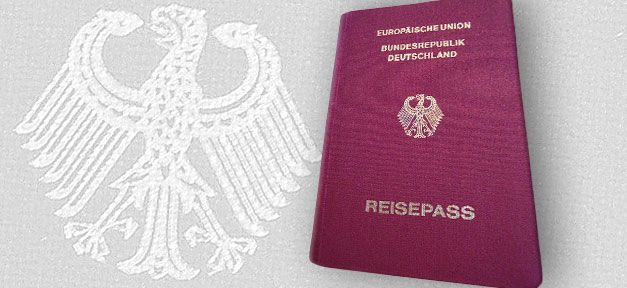
2 Trackbacks & Pingbacks
- Reasons Why Your Job Search in Germany Isn’t Bearing Fruits | Mkenya Ujerumani
- Finding a Job or Ausbildung in Germany | Mkenya Ujerumani
Comments are closed.

Cover Letter

Ein Beitrag von Ben Dehn
Was ist ein Cover Letter?
Kontaktinformationen & datum, anrede & betreffzeile, einleitung des cover letters, hauptteil des cover letters, schlussteil des cover letters, bewerbungs-editor - cover letter kostenlos online erstellen, cover letter muster - kostenlose vorlagen, vokabeln und beispielsätze für deinen cover letter, weitere wichtige tipps zum cover letter.
Der Cover Letter ist das englischsprachige Äquivalent zum deutschen Bewerbungsschreiben und somit oft die erste Seite einer internationalen Bewerbung. Im Cover Letter stellst du dich und deinen bisherigen Werdegang vor, erläuterst deine Motivation und gibst einen Überblick über deine wichtigsten Qualifikationen, Kenntnisse, Soft Skills und Erfolge .
Dabei gibt es leichte Unterschiede zwischen dem amerikanischen „Cover Letter“ und dem britischen „Covering Letter“ . Bewirbst du dich in Großbritannien oder bei einem britischen Unternehmen, solltest du diese unbedingt beachten. Wir gehen in diesem Artikel daher an den jeweiligen Stellen kurz auf diese Abweichungen ein. Auf den Cover Letter folgt das Résumé (USA) bzw. CV . Deine Zeugnisse und andere Anlagen werden bei der internationalen Bewerbung meist nicht benötigt oder können später nachgereicht werden.
Mirko Bettenhausen Fachautor von bewerbung.net „Bewirbst du dich bei einem internationalen Unternehmen in Deutschland , kann ebenfalls eine englische Bewerbung gefordert werden. Wurde die Stellenausschreibung auf Englisch veröffentlicht, solltest du dich auch mit englischsprachigen Unterlagen bewerben. Oft werden Anschreiben und Lebenslauf jedoch nur übersetzt und die Struktur gleicht der einer deutschen Bewerbung . Du solltest dich daher im Voraus informieren, ob ein Cover Letter benötigt wird.“
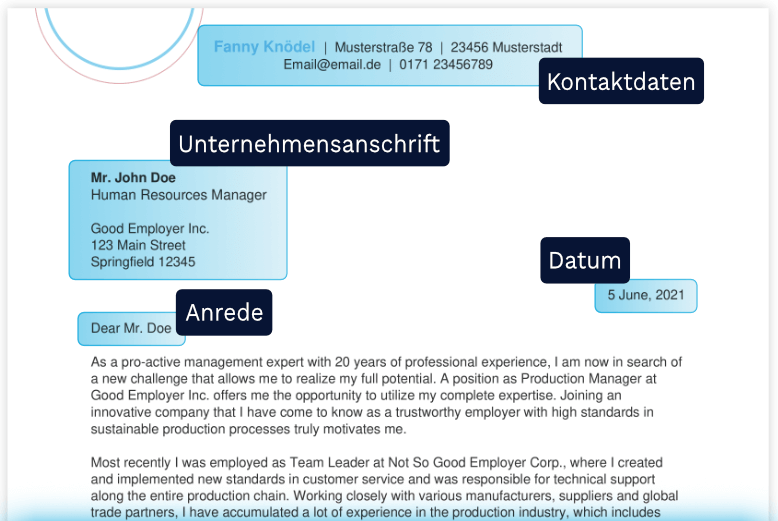
Der Cover Letter wird ähnlich aufgebaut wie das deutsche Anschreiben. Neben Kontaktdaten und anderen Formalitäten gliedert er sich in Einleitung , Hauptteil und Schluss .
Besonders bei der Angabe der Kontaktdaten, des Datums sowie der Formulierung einer Anrede sind hier jedoch einige Besonderheiten zu beachten. In den folgenden Abschnitten gehen wir ausführlich auf die einzelnen Bestandteile des Cover Letters ein.
Das Bild rechts zeigt ein Beispiel für den Briefkopf eines Cover Letters .
Wichtig: Ein Cover Letter sollte maximal eine DIN-A4-Seite umfassen.
Im Kopf des Cover Letters gibst du zunächst deine eigenen Kontaktinformationen an (linksbündig, rechtsbündig oder zentriert). Dazu gehören dein Vor- und Nachname , deine E-Mail-Adresse und deine Telefonnummer . Ein Jobtitel sowie deine Adresse sind optionale Angaben. Darüber hinaus können Verweise auf Social-Media-Kanäle ( LinkedIn oder Twitter), eine Homepage oder das eigene Portfolio integriert werden.
Nach 1-2 Leerzeilen folgen linksbündig die Daten des Unternehmens . Hier gibst du den Namen und Jobtitel deines Ansprechpartners sowie Namen und Adresse des Unternehmens an. Das aktuelle Datum wird eine Zeile unter den Kontaktdaten des Unternehmens rechtsbündig platziert. Bei der amerikanischen Datumsangabe wird der Monat vor dem Tag genannt: 01.09.2021 wird zu 09-01-2021. Um Missverständnisse zu vermeiden, solltest du den Monat ausschreiben . Zudem steht vor der Jahreszahl ein Komma.
Beispiele für die amerikanische Datumsangabe:
September 1, 2021
September 1st, 2021
Beispiele für die britische Datumsangabe:
01 September 2021
1st September 2021
Dieses Team bringt 4 von 5 Personen ins Vorstellungsgespräch! Durch mehr als 10 Jahre Erfahrung und Expertise aus über 50.000 erstellten Bewerbungen verhelfen Die Bewerbungsschreiber auch dir mit einer professionellen und individuell auf dich zugeschnittenen Bewerbung zum Erfolg . Klicke hier und hol dir die beste Bewerbung deines Lebens
Deinen Cover Letter solltest du nach Möglichkeit immer an einen konkreten Ansprechpartner adressieren. In der Regel findest du diesen über die Stellenanzeige oder die Unternehmenswebsite heraus, in Ausnahmefällen ist eine telefonische Kontaktaufnahme notwendig.
Männliche Personen werden mit „Mr.“ adressiert, weibliche mit „Ms.“ (allgemeingültig) oder „Mrs.“ (nur bei verheirateten Frauen). In der britischen Variante wird der Punkt weggelassen. Im Gegensatz zum deutschen Anschreiben ist das Komma nach der Anrede optional .
Beispiele für die Anrede im amerikanischen Cover Letter:
Dear Mr. Doe
Dear Ms. Doe
Dear Mrs. Doe
Beispiele für die Anrede im britischen Cover Letter:
Dear Mr Doe
Dear Ms Doe
Dear Mrs Doe
Kannst du keinen Ansprechpartner in Erfahrung bringen, sind z.B. folgende Formulierungen möglich:
Dear Hiring Manager
Dear Sir/Madam
Dear [Abteilung] Team
Im amerikanischen Cover Letter wird die Betreffzeile weggelassen . In der britischen Variante steht sie dagegen zwischen der Anrede und der Einleitung.
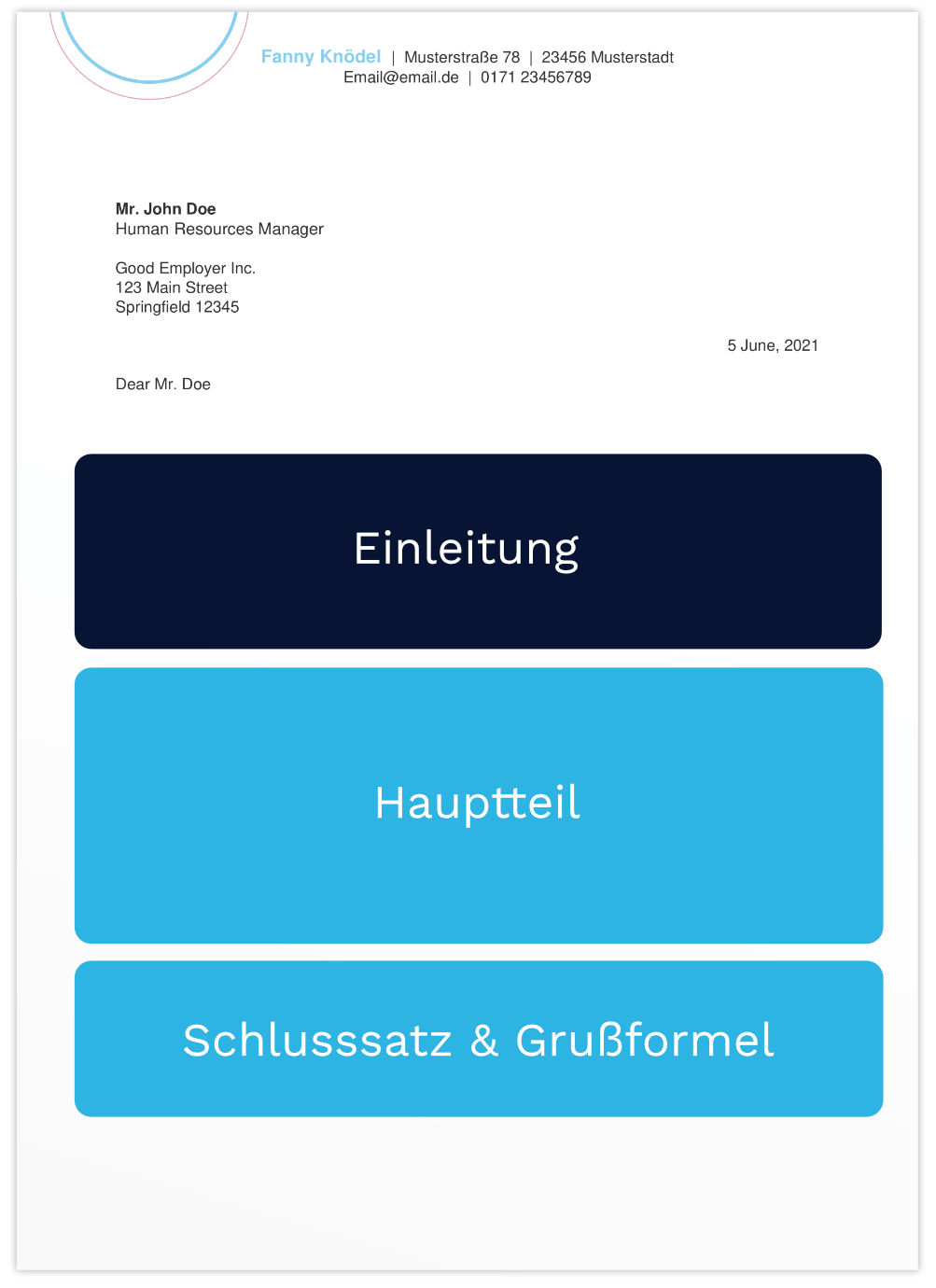
Die Einleitung des Cover Letters besteht aus einem Absatz, in dem du dich kurz vorstellst und deine Motivation für die Bewerbung erläuterst . Bist du begeistert von den Produkten des Unternehmens, vertrittst ähnliche Werte oder möchtest mehr Verantwortung übernehmen?
An dieser Stelle kannst du bereits 1-2 deiner Kernqualifikationen (z.B. relevante Berufserfahrung ) einfließen lassen.
Außerdem kannst du angeben, wie du auf die Stelle aufmerksam geworden bist oder auf ein vorangegangenes Gespräch (Telefon, Messe etc.) Bezug nehmen. Wenn du einen persönlichen Bezug zu dem Unternehmen hast, kannst du in der Einleitung des Cover Letters darauf eingehen.
Wie beim deutschen Anschreiben gilt auch hier: Verwende keine Floskeln! Die Einleitung des Cover Letters ist oft das Erste, was ein Personaler liest. Daher ist es wichtig, dass du hier Interesse weckst und einen guten ersten Eindruck hinterlässt .
Beispielformulierungen für die Einleitung eines Cover Letters:
„Having read the job listing at website XY, I was excited about the opportunity to work at Example Company, a company I have always admired for its innovative use of Social Media Marketing. As an Online Marketing specialist with over 3 years of professional experience supervising the content creation process at Previous Company, I am looking forward to joining your team as a Content Manager.“
„Becoming a game designer at Example Company has been a lifelong dream of mine that I have worked towards the past 4 years. While in university, I have finished and contributed to multiple different game projects in various genres.“
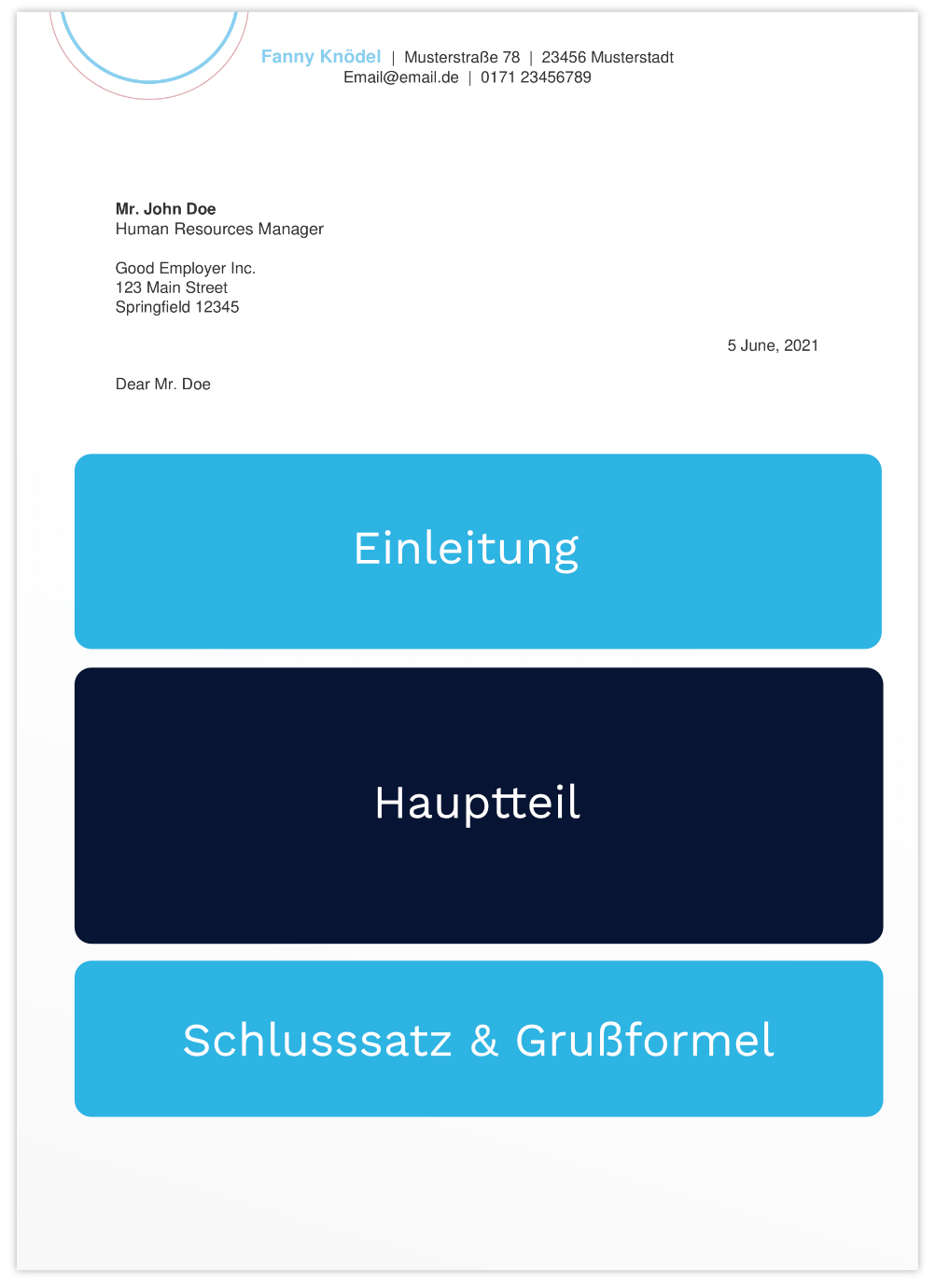
Im Hauptteil des Cover Letters geht es darum, dich als bestmöglichen Kandidaten für die ausgeschriebene Stelle zu präsentieren. Identifiziere zunächst die wichtigsten Anforderungen an einen Bewerber , welche fast immer in der Stellenanzeige zu finden sind. Im Cover Letter solltest du auf die geforderten Qualifikationen Bezug nehmen .
Achte jedoch darauf, dass du nicht bloß Stichpunkte aus der Ausschreibung wiederholst und nutze andere Quellen wie z.B. die Unternehmenswebsite oder dein persönliches Netzwerk, um dich über dein zukünftiges Aufgabenprofil zu informieren.
Wird in der Stellenausschreibung relevante Berufserfahrung vorausgesetzt, solltest du in deinem Cover Letter auf frühere Beschäftigungen eingehen und die Tätigkeiten nennen , die für die Position, auf die du dich bewirbst, am relevantesten sind.
Belege sowohl deine fachlichen Qualifikationen als auch deine Soft Skills mit Erfolgen, praktischen Erfahrungen (z.B. Projekte) oder sogar Hobbys . Die Nennung konkreter Zahlen und Fakten ist sinnvoll, sofern diese aussagekräftig sind. Wichtig ist, dass du im Cover Letter deutlich machst, inwiefern du dem Unternehmen einen Mehrwert bietest.
Bei Bewerbungen in den USA ist es üblich, noch selbstbewusster aufzutreten als wir es in Deutschland gewohnt sind. Stelle daher im amerikanischen Cover Letter deine Erfolge in den Vordergrund .
Spätestens im Hauptteil solltest du außerdem deutlich machen, weshalb du zur Unternehmenskultur passt . Wenn nicht bereits in der Einleitung geschehen, nennst du hier deine Motivation und gehst darauf ein, inwiefern du die Werte des Unternehmens teilst und/oder mit deiner Arbeitsweise besonders gut in das Team passt.
Beispielformulierungen für die Angabe der Berufserfahrung & Erfolge:
„As an online marketing manager at Example Company, I have managed to increase the effectiveness of our paid advertising campaigns significantly.“
„As a Sales Representative at Example Company, I managed to beat the KPIs by more than 30%, generating an average of $50,000 in sales per month.“
„Since 2015, I successfully grew Example Company’s client base by more than 40%.“
„During my final year at Example University, I was in charge of managing the budget for the film festival held at my university every five years.“
Beispielformulierungen für die Angabe deiner Soft Skills:
„As a part of the customer service team at Example Company, I have been successful at solving problems with my strong communication skills and the ability to cater to the specific needs of our customers.“
„With my track record of commercial success as well as strong leadership and mediation skills, I am confident that I will be able to contribute to your team’s success immediately.“
Beispielformulierungen für den Unternehmensbezug und die Angabe deiner Motivation:
„I have recently learned about Example Company’s plans to promote the new product line on several Social Media platforms. With my experience managing various channels at my previous job, I would love to leverage my knowledge to turn this project into a groundbreaking success.“
„My time spent in the service industry has prepared me for this opportunity, and I look forward to working as a member of your team.“
Versuche, im Hauptteil deines Cover Letters auf die spezifischen Bedürfnisse des Unternehmens einzugehen . Sucht das Unternehmen Verstärkung für ein anstehendes Projekt? Dann mache deutlich, welche Rolle du dabei einnimmst und wie du mit deinen Fähigkeiten zum Projekterfolg beitragen kannst. Das gilt besonders im Anschreiben einer internationalen Initiativbewerbung , auch als „letter of interest“ bezeichnet.
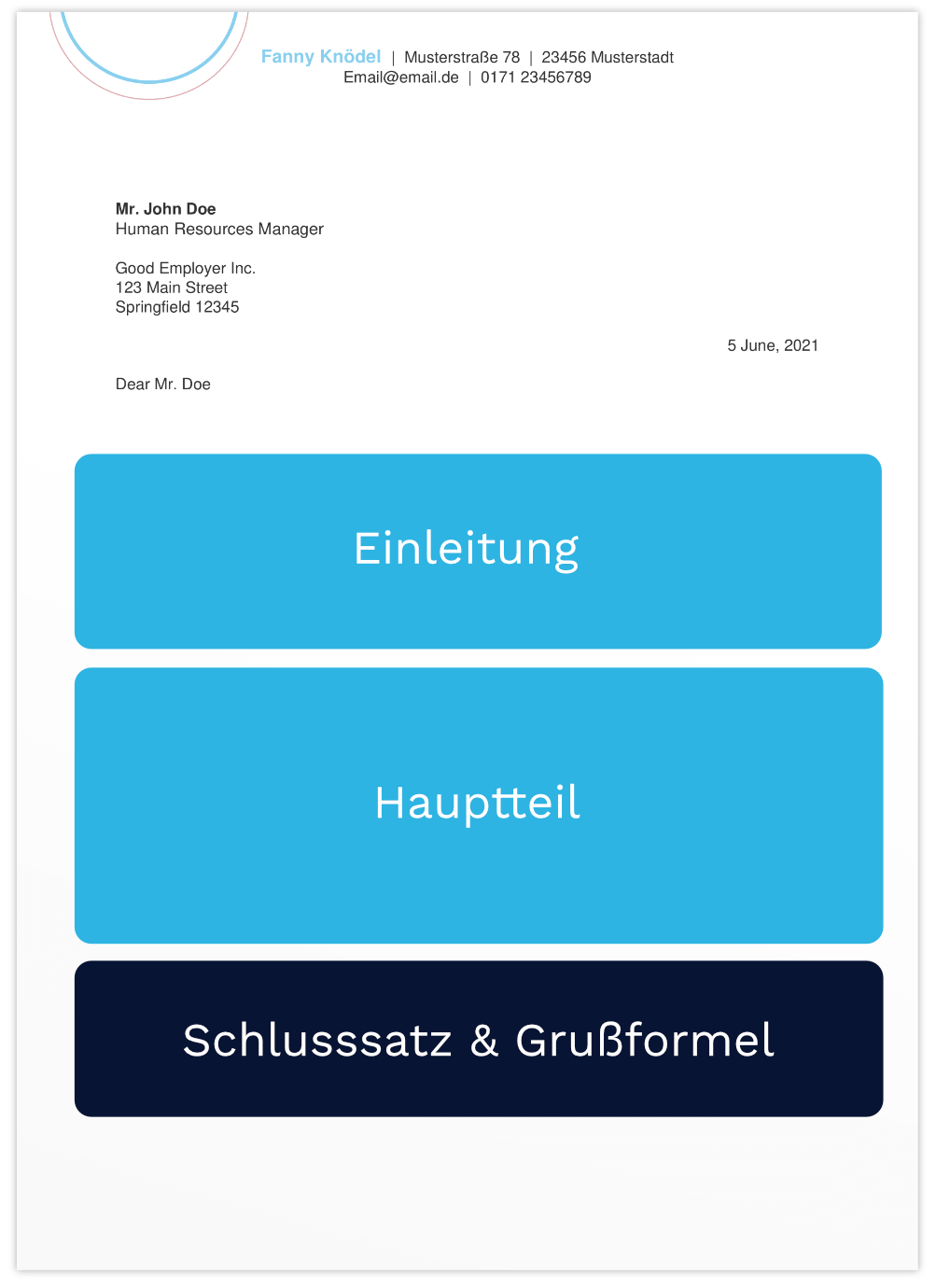
Beende deinen Cover Letter mit einem „ Call to Action “, indem du deine Bereitschaft zu einem Vorstellungsgespräch ausdrückst und ggf. auf die Möglichkeit einer Kontaktaufnahme hinweist. Außerdem kannst du dich für das Sichten deiner Bewerbungsunterlagen bedanken .
Wenn du unsicher bist, ob Zeugnisse o.ä. benötigt werden, kannst du erwähnen, dass du gern dazu bereit bist, diese nachzureichen .
Das amerikanische und britische Äquivalent zum deutschen „ Mit freundlichen Grüßen “ lautet „Yours sincerely“ . Mit dieser Grußformel machst du nichts falsch. Als Alternative sind auch „Best Regards“ oder „Kind Regards“ möglich.
Wenn du kein Komma nach der Anrede gesetzt hast, solltest du es auch hier weglassen. Beende deinen Cover Letter mit deiner handschriftlichen Signatur (empfohlen) oder deinem Namen.
Beispielformulierungen für den Schlussteil des Cover Letters:
„Thank you for reviewing my application. Do not hesitate to reach out if you have further questions. I look forward to discussing this position and my qualifications in detail during a personal meeting.”
“I look forward to discussing how my specific skill set can provide value to Example Company’s customers.”
Du wechselst den Beruf oder bewirbst dich in einer neuen Branche? Dann solltest du im Cover Letter deutlich machen, inwiefern du als Quereinsteiger mit deinem möglicherweise ungewöhnlichen Profil einen besonderen Mehrwert für das Unternehmen bietest. Fokussiere dich nicht auf deine fehlende Berufserfahrung , sondern frage dich: Welche Qualifikationen bringe ich mit, die ein „normaler Bewerber“ nicht vorweisen kann? An dieser Stelle darfst du gern kreativ werden. Vor allem Soft Skills wie Kundenorientierung sind sehr gut übertragbar.
Mit unserem Bewerbungs-Editor kannst du deinen Cover Letter direkt in deinem Webbrowser verfassen . Die eingerahmte Bewerbungsvorlage kannst du vollständig nach deinen Vorstellungen umschreiben – probiere es doch direkt mal aus! Nachdem du alle gewünschten Änderungen vorgenommen hast, kannst du deinen Text ganz einfach kopieren und in ein Textverarbeitungsprogramm (z.B. Microsoft Word) einfügen. Wir wünschen dir viel Spaß!
Maria Mustermann Musterstraße 123 12345 Musterstadt [email protected] 0171 23456789
Good Employer Inc. Mr. John Doe 123 Main Street 12345 Springfield
Musterstadt, TT.MM.JJJJ
Application as Production Manager
Dear Mr. Doe As a pro-active management expert with 20 years of professional experience, I am now in search of a new challenge that allows me to realize my full potential. A position as Production Manager at Good Employer Inc. offers me the opportunity to utilize my complete expertise. Joining an innovative company that I have come to know as a trustworthy employer with high standards in sustainable production processes truly motivates me. Most recently I was employed as Team Leader at Not So Good Employer Corp., where I created and implemented new standards in customer service and was responsible for technical support along the entire production chain. Working closely with various manufacturers, suppliers and global trade partners, I have accumulated a lot of experience in the production industry, which includes planning, coordinating and supervising production safety, as well as technical support and quality standards. I deeply understand all aspects and complexities required for an effective production management. As far as my personal attributes are concerned, my flexibility and quick perception allow for an easy adaption to new tasks and work environments. Always looking for ways to improve and gain a competitive edge, I am motivated to bring new ideas and processes into reality. You may also assume native German and even advanced knowledge of the French language. Exceedingly motivated, I look forward to the chance to support your company. Thank you very much for taking the time to review my application. In order to convince you of my capabilities, I would welcome the opportunity of a personal interview! Kind regards
Unterschrift
Ein ansprechendes Bewerbungsdesign verleiht deiner Bewerbung den letzten Schliff, sodass diese aus der Masse heraussticht und die Aufmerksamkeit der Personaler erregt. Wir haben dir zwei kostenlose Vorlagen inkl. Mustertexten im Microsoft Word-Format bereitgestellt, welche du als Inspiration für die Erstellung deiner Unterlagen verwenden kannst. Lade sie dir jetzt herunter!
Anschreiben Vorlage Amerika
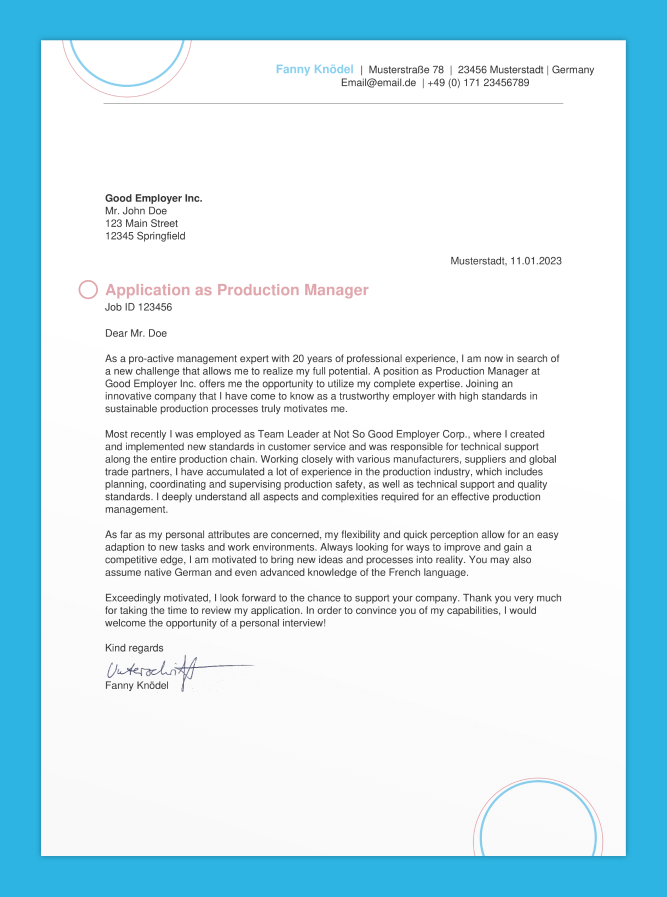
Anschreiben Vorlage Großbritannien
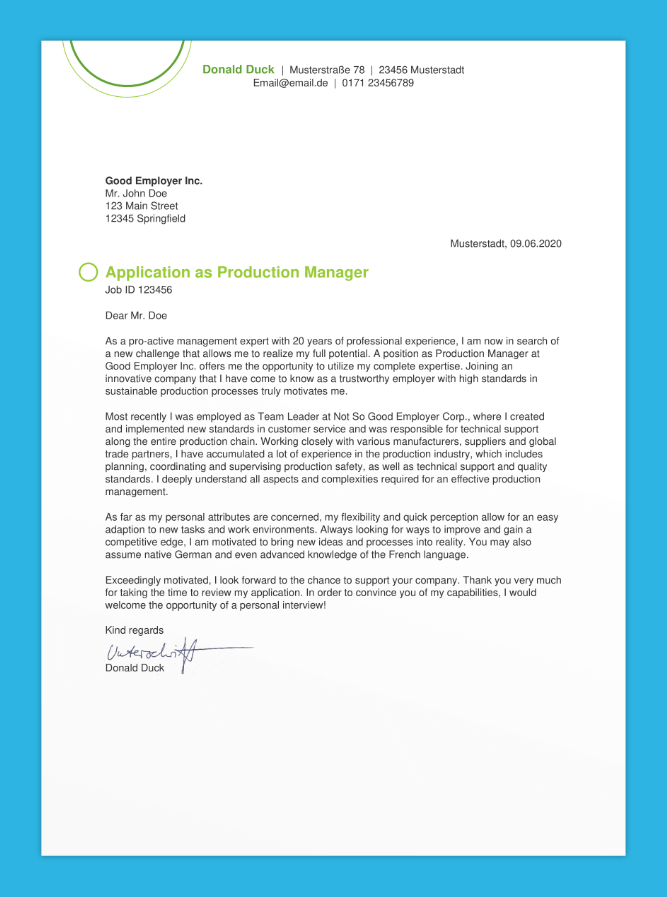
Neben den oben gezeigten Vorlagen findest du bei uns viele weitere kostenlose Muster für Anschreiben, Deckblatt und Lebenslauf einer Bewerbung.
In diesem Abschnitt findest du verschiedene Vokabeln und Beispielsätze, die du in deinem Cover Letter verwenden kannst. Bedenke jedoch, dass jeder Cover Letter individuell und auf die jeweilige Position zugeschnitten sein sollte.
Erfahrung:
„(mehr als) fünf Jahre Berufserfahrung als...“ = „(over) five years of experience working as...“
„umfangreiche Erfahrung auf dem Gebiet…“ = „extensive experience in the field of...“
„Als Social Media-Manager...“ = „In my role as Social Media Manager...“
„Ich war für die Kampagne verantwortlich“ = „I was responsible for the campaign“
„Ich konnte zum Projekterfolg beitragen, indem...“ = „I was able to contribute to the success of the project by...“
„Als Teamleiter konnte ich unseren Umsatz um 20% steigern“ = „As team leader I was able to increase our sales by 20%“
„(äußerst) erfolgreiche Kampagnen“ = „(highly) successful campaigns“
„unmittelbarer Erfolg“ = „immediate success“
„ein Ziel erreichen“ = „meeting a goal“
„verbessern“ = „improve“
„Erfolge“ = „achievements“
Kenntnisse:
„umfangreiche Kenntnisse“ = „extensive knowledge“
„fortgeschrittene Kenntnisse“ = „advanced knowledge“
„Ich habe mich auf E-Mail-Marketing spezialisiert“ = „I specialized in email marketing“
„Fachkenntnisse“ = „expertise“
„Qualifikationen“ = „qualifications“
Soft Skills:
„Führungsstärke“ = „strong leadership skills“
„Belastbarkeit“ = „resilience“
„Teamfähigkeit“ = „ability to work as part of a team“
„Kreativität“ = „creativity“
„Zuverlässigkeit“ = „reliability“
„Stressresistenz“ = „stress tolerance“
„Geduld“ = „patience“
„Sorgfalt“ = „diligence“
Motivation:
„Chance, zum Wachstum/Erfolg des Unternehmens beizutragen“ = „opportunity to contribute to the company's growth/success“
„spannende Gelegenheit“ = „exciting opportunity“
„Begeisterung für das Marketing“ = „passion for marketing“
„Herausforderungen“ = „challenges“
Verwende eine seriöse E-Mail-Adresse: Deine E-Mail enthält im Idealfall lediglich deinen Vor- und/oder Nachnamen. Außerdem solltest du nicht die Adresse deines Arbeitgebers benutzen – das gilt als unhöflich.
Achte auf deine (Selbst)Darstellung im Internet: Auch internationale Arbeitgeber überprüfen oft die Social Media-Profile eines Bewerbers. Private Inhalte sind auf Facebook, Instagram und co. natürlich unproblematisch, dennoch sollte hier kein unprofessioneller Eindruck entstehen.
Vermeide Wiederholungen und unwichtige Informationen: Alle Informationen in deinem Cover Letter sollten für die Stelle, auf die du dich bewirbst, von Relevanz sein. Achte zudem darauf, dass du nicht lediglich die Inhalte aus deinem CV oder Résumé auflistest, sondern die wichtigsten Stationen nennst und genauer erläuterst.
Stelle einen individuellen Unternehmensbezug her: Zeige in deinem Cover Letter, dass du dich ausführlich mit dem Unternehmen beschäftigt hast. Erwähne z.B. nicht nur, dass ein Unternehmen als „innovativ“ gilt, sondern nenne konkrete Produkte.
Passe deinen Cover Letter sprachlich an das Unternehmen an: Bewirbst du dich bei einem Start-Up in einer kreativen Branche, kannst du deinen Cover Letter lockerer und persönlicher formulieren. Nutze alle verfügbaren Quellen, um mehr über die Unternehmenskultur herauszufinden und achte auch auf die in der Stellenanzeige verwendete Sprache.
Achte darauf, dass dein Cover Letter fehlerfrei ist: Rechtschreib- und Grammatikfehler sind in keiner Sprache gerne gesehen. Achte daher auf einen fehlerlosen Text, welchen du mehrfach Probelesen solltest. Frage auch Familie oder Bekannte (bestenfalls einen Muttersprachler), ob sie einen Blick auf deinen Cover Letter werfen können.

Autor: Ben Dehn
Ben entschied sich nach seinem Lehramtsstudium dazu, seinen Weg zunächst im Journalismus zu bestreiten. Nach sieben Jahren bei Print, Online und Radio heuerte er 2013 bei der webschmiede GmbH an und betreute im „Die Bewerbungsschreiber“ Team Personen auf sämtlichen Hierarchieebenen. Durch seine Tätigkeit konnte er sein Know-how im Karrierebereich stetig vertiefen. Heute schreibt Ben Dehn hilfreiche Fachartikel, hält Vorträge und gibt Interviews, Workshops & Seminare.
Zu Bens Autorenprofil
Bewerbung.net – Tipps rund um Bewerbung & Lebenslauf
Hier machen wir dich mit unserem Bewerbungswissen zu Anschreiben, Lebenslauf und Vorstellungsgespräch fit für deine Bewerbung – egal ob du gerade ins Berufsleben einsteigst oder schon Erfahrung gesammelt hast.
- Bewerbungsschreiben
- Bewerbungsvorlagen
- Lebenslauf Vorlagen
- Deckblatt Vorlagen
Made with 💙 in Bochum
Impressum | Datenschutz


Sample cover letter for job application in Germany
A sample cover letter for a job application in Germany can be a critical component in your quest for employment in the country.
Crafting the perfect cover letter involves understanding the expectations of German employers and adapting your writing style and content accordingly.
In this blog post, we will provide you with comprehensive guidance on creating an effective cover letter tailored for the German job market.
We will cover the importance of structure, cultural nuances, best practices, and common mistakes to avoid, ensuring your cover letter stands out to potential employers.
A cover letter, known as an “Anschreiben” in German, is a crucial element of your job application.
It is your opportunity to make a strong first impression and demonstrate your motivation and suitability for the role.
In Germany, cover letters are often seen as equally important as the CV, if not more so.
Employers use cover letters to assess not only your writing skills and attention to detail but also your understanding of the company and the position.
This is why tailoring your cover letter to the specific job and company is vital to your success.
In this comprehensive guide, we will cover the following topics:
Key Components of a German Cover Letter
- Sample Cover Letter for a Job Application in Germany
Cultural Nuances and Best Practices
- Common Mistakes to Avoid
- Tips for Making Your Cover Letter Stand Out
By following the guidelines and best practices outlined in this article, you’ll be well-equipped to create an impactful cover letter that sets you apart from the competition and paves the way for a successful job application in Germany.
A well-structured and carefully crafted cover letter can significantly increase your chances of securing a job interview in Germany.
Understanding the key components of a German cover letter and its significance will help you create a compelling and impactful letter that resonates with potential employers.
In this section, we will dive into each component and provide guidance on how to make your cover letter shine.
1. Personal Information
At the top of your cover letter, include your full name, address, phone number, and email address.
This information should be right-aligned, ensuring it is easy to locate and follows the standard German formatting.
You may also include your professional title and LinkedIn profile link if relevant.
2. Recipient’s Information
Below your personal information, left-align the recipient’s details, including their name, title, company name, and address.
If you’re unsure of the recipient’s name, it’s worth conducting some research to find the appropriate contact person, as addressing the letter to a specific individual demonstrates your diligence and attention to detail.
Include the date below the recipient’s information, following the German date format (DD.MM.YYYY).
4. Subject Line
A concise and informative subject line helps the reader quickly understand the purpose of your letter.
Begin with “Bewerbung um die Stelle als” (Application for the position of) followed by the job title. This makes it easy for the recipient to identify the position you are applying for.
5. Salutation
In Germany, formality is crucial. Address the recipient with “Sehr geehrte(r)” (Dear) followed by their last name and a comma.
If you don’t know the recipient’s name, use “Sehr geehrte Damen und Herren” (Dear Sir/Madam).
6. Opening Paragraph
The opening paragraph sets the tone for your cover letter. Briefly introduce yourself and mention the position you are applying for, where you found the job posting, and, if applicable, any mutual connections or referrals.
7. Body Paragraphs
In the body of your cover letter, showcase your qualifications, skills, and experiences relevant to the job.
Focus on how your background aligns with the requirements listed in the job description, and provide concrete examples to demonstrate your accomplishments.
Also, show your knowledge of the company and explain why you are interested in the position and how you can contribute to the organization’s success.
8. Closing Paragraph
In the closing paragraph, reiterate your interest in the role and express your enthusiasm for the opportunity. Politely request an interview and thank the recipient for considering your application.
9. Sign-off and Signature
End your cover letter with a formal sign-off such as “Mit freundlichen Grüßen” (Kind regards) followed by your full name. If sending a physical letter, include your handwritten signature above your typed name.
10. Enclosures
Finally, mention any enclosures, such as your CV, references, or certificates, by adding “Anlagen:” (Enclosures:) at the bottom of the letter. This ensures the recipient is aware of the additional documents accompanying your application.
Now that you have a clear understanding of the key components of a German cover letter, let’s move on to a few sample cover letters and dissect their elements to help you craft your own.
Sample Cover Letters for Job Applications in Germany
To give you a better understanding of how to craft a cover letter for different job domains, we have provided three sample cover letters: one for an IT position, one for a marketing position, and one for a nursing position.
Each cover letter showcases a different format or style, allowing you to choose the approach that best suits your individual preferences and the specific job you are applying for.
Sample 1: IT Position (Software Developer)
[Your Name] [Your Address] [Your Phone Number] [Your Email Address] [LinkedIn Profile Link (optional)] [Recipient’s Name] [Recipient’s Title] [Company Name] [Company Address] [Date (DD.MM.YYYY)] Bewerbung um die Stelle als Softwareentwickler Sehr geehrte(r) [Recipient’s Last Name], I am writing to apply for the Software Developer position at [Company Name] as advertised on [Job Portal]. As a skilled professional with over five years of experience in software development, I am confident in my ability to contribute to your company’s success. Throughout my career, I have developed and maintained numerous software applications, consistently meeting project deadlines and exceeding client expectations. My technical expertise includes proficiency in Java, Python, and C++, as well as experience with Agile methodologies and DevOps practices. I am also passionate about continuous learning, which has enabled me to stay up-to-date with the latest industry trends and technologies. I am particularly attracted to [Company Name] because of its reputation for innovation and commitment to employee growth. I believe my skill set and dedication to software development would make me a valuable addition to your team. I would welcome the opportunity to further discuss my qualifications and how I can contribute to [Company Name]. Thank you for considering my application. Mit freundlichen Grüßen, [Your Full Name] [Handwritten Signature (if applicable)] Anlagen: Lebenslauf Zeugnisse Arbeitsproben
Sample 2: Marketing Position (Content Marketing Manager)
[Your Name] [Your Address] [Your Phone Number] [Your Email Address] [LinkedIn Profile Link (optional)] [Recipient’s Name] [Recipient’s Title] [Company Name] [Company Address] [Date (DD.MM.YYYY)] Bewerbung um die Stelle als Content Marketing Manager Sehr geehrte(r) [Recipient’s Last Name], As an experienced Content Marketing Manager with a strong background in developing and implementing successful marketing strategies, I am excited to apply for the position at [Company Name] that I discovered on [Job Portal]. During my six years in the marketing industry, I have managed content creation, search engine optimization, and social media campaigns for various clients, leading to significant increases in web traffic, engagement, and conversion rates. My strengths lie in my ability to analyze target audiences, identify content gaps, and create compelling content that drives results. What draws me to [Company Name] is its focus on providing exceptional value to customers through innovative marketing techniques. I am confident that my expertise in content marketing, combined with my passion for creating engaging experiences, will enable me to contribute significantly to your company’s growth and success. I appreciate your consideration of my application and look forward to the opportunity to discuss my qualifications further. Mit freundlichen Grüßen, [Your Full Name] [Handwritten Signature (if applicable)] Anlagen: Lebenslauf Zeugnisse Arbeitsproben
Sample 3: Nursing Position (Registered Nurse)
[Your Name] [Your Address] [Your Phone Number] [Your Email Address] [LinkedIn Profile Link (optional)] [Recipient’s Name] [Recipient’s Title] [Company Name] [Company Address] [Date (DD.MM.YYYY)] Bewerbung um die Stelle als examinierte Krankenschwester Sehr geehrte(r) [Recipient’s Last Name], I am writing to express my interest in the Registered Nurse position at [Company Name], which I came across on [Job Portal]. With over seven years of nursing experience and a commitment to providing exceptional patient care, I am confident in my ability to make a positive impact at your healthcare facility. Throughout my nursing career, I have honed my skills in patient assessment, treatment planning, and health education. My experience includes working in diverse healthcare settings, such as hospitals, nursing homes, and outpatient clinics. This background has allowed me to develop strong communication and teamwork skills, adapt to different environments, and provide high-quality care to patients from various backgrounds. I am drawn to [Company Name] because of its reputation for excellence in patient care and commitment to employee development. I believe my nursing experience, passion for healthcare, and dedication to patient well-being make me a strong candidate for this position. Thank you for considering my application. I look forward to the opportunity to discuss my qualifications further and explore how I can contribute to the success of [Company Name]. Mit freundlichen Grüßen, [Your Full Name] [Handwritten Signature (if applicable)] Anlagen: Lebenslauf Zeugnisse Zertifikate
These three sample cover letters demonstrate different formats and styles tailored to specific job domains.
Bonus : Looking for additional cover letter templates? Here is a list of free CV and cover letter templates that you can use for your next job application in Germany.
Analyze the elements of each sample and use them as a starting point to create a cover letter that effectively showcases your unique qualifications and experiences for the position you are applying for in Germany.
Do you have further questions?
Join our community of job seekers and expats from Germany. You can ask your doubts and get suggestions on topics related to getting a job in Germany and several other related topics.
When applying for a job in Germany, it’s essential to be aware of the cultural nuances and best practices to ensure your cover letter makes a strong impression.
Understanding the expectations of German employers and adapting your cover letter accordingly will increase your chances of success.
In this section, we will discuss some key cultural aspects and best practices to follow when crafting your cover letter.
1. Formality and Politeness
German business culture places a high value on formality and politeness.
Ensure that your cover letter adheres to a formal writing style and tone.
Use appropriate salutations and sign-offs, and address the recipient by their last name.
Avoid using slang, colloquialisms, or overly casual language.
2. Addressing the Recipient Properly
Take the time to research the correct name and title of the person responsible for reviewing job applications.
Addressing the recipient personally demonstrates your diligence and attention to detail.
If you cannot find the recipient’s name, use the generic salutation “Sehr geehrte Damen und Herren” (Dear Sir/Madam).
3. Demonstrating Knowledge of the Company and the Role
German employers appreciate candidates who show a genuine interest in their company and the specific role they are applying for.
Research the company’s mission, values, and recent projects, and mention how these align with your own professional goals and interests.
Additionally, carefully review the job description and emphasize how your skills, qualifications, and experiences make you a strong fit for the position.
4. Focusing on Achievements and Contributions
Instead of merely listing your previous job duties, highlight your achievements and the impact of your work.
Use specific examples to showcase your accomplishments and demonstrate your ability to contribute to the success of the company.
This approach shows employers that you are results-oriented and can make a meaningful difference in their organization.
5. Tailoring Your Cover Letter to the Specific Job
Avoid using a generic cover letter for every job application.
Instead, tailor your cover letter to the specific job and company by addressing the unique requirements and expectations outlined in the job description.
This not only demonstrates your genuine interest in the role but also shows that you have taken the time to understand the employer’s needs and how you can fulfill them.
By considering these cultural nuances and best practices, you can craft a compelling cover letter that resonates with German employers and sets you apart from other applicants.
Common Mistakes to Avoid in a German Cover Letter
To increase your chances of securing a job interview in Germany, it’s crucial to avoid common mistakes that can detract from your application’s effectiveness.
In this section, we will discuss some common pitfalls and provide tips on how to prevent them.
1. Spelling and Grammar Errors
Mistakes in spelling and grammar can significantly damage the credibility of your application.
Proofread your cover letter thoroughly and consider using a grammar-checking tool to ensure accuracy.
If possible, ask a native German speaker or a professional proofreader to review your letter for any errors or inconsistencies.
2. Overly Casual Tone
As mentioned earlier, German business culture values formality and politeness.
Avoid using an overly casual tone, slang, or colloquialisms in your cover letter. Instead, maintain a professional and respectful tone throughout your letter.
3. Lengthy Cover Letters
A cover letter should be concise and to the point. Aim for a length of one page, focusing on the most relevant and compelling information.
Avoid long-winded explanations and unnecessary details that can detract from the impact of your letter.
4. Failing to Address the Job Requirements
Not addressing the specific requirements outlined in the job description can give the impression that you are not genuinely interested in the position or have not taken the time to understand the employer’s needs.
Tailor your cover letter to the job description, highlighting your skills, qualifications, and experiences that align with the requirements.
5. Underselling or Overselling Yourself
Striking the right balance between confidence and humility is crucial in a cover letter.
Avoid underselling your skills and accomplishments, but also refrain from overselling yourself or exaggerating your qualifications.
Focus on providing accurate and relevant examples that demonstrate your suitability for the role.
6. Neglecting to Research the Company
Failing to demonstrate knowledge of the company and its values can give the impression that you are not genuinely interested in the role.
Research the company and mention specific aspects that resonate with your professional goals and interests to show your enthusiasm for the position.
7. Using Generic Cover Letters
Submitting a generic cover letter for multiple job applications can harm your chances of securing an interview.
Tailor your cover letter to each specific job and company to demonstrate your genuine interest in the role and your understanding of the employer’s needs.
By avoiding these common mistakes, you can create a compelling and impactful cover letter that stands out to potential employers and increases your chances of success in the German job market.
Tips for Non-Native German Speakers
If you are a non-native German speaker applying for a job in Germany, crafting an effective cover letter can be particularly challenging.
However, by paying attention to certain aspects and following some best practices, you can overcome language barriers and make a strong impression.
In this section, we will discuss some tips to help non-native German speakers create an impactful cover letter.
1. Language Proficiency
First and foremost, ensure that your German language skills are sufficient for the job you are applying for.
If the job requires a high level of proficiency, it’s essential to have a strong command of the language, both in writing and speaking.
If necessary, consider taking German language courses or working with a language tutor to improve your skills.
2. Use a Professional Translation Service
If you are not confident in your ability to write a cover letter in German, consider using a professional translation service.
This can help ensure that your cover letter is accurate, clear, and adheres to German business etiquette.
However, remember that using a translation service is not a substitute for learning the language, particularly if the job requires fluent German skills.
3. Seek Feedback from Native German Speakers
Ask native German speakers to review your cover letter and provide feedback on your language usage, grammar, and overall structure.
This can help you identify any errors or inconsistencies and ensure that your cover letter adheres to German business conventions.
4. Highlight Your Language Skills
If you are fluent in multiple languages, including German, highlight this skill in your cover letter.
Many German companies value employees who can communicate effectively in multiple languages, particularly in international settings.
5. Research German Business Etiquette
Familiarize yourself with German business etiquette and incorporate appropriate conventions into your cover letter, such as formal salutations, sign-offs, and language usage.
This demonstrates your understanding of the local business culture and your willingness to adapt.
6. Address Potential Visa and Work Permit Requirements
If you are not an EU/EEA/Swiss citizen, make sure to address any potential visa and work permit requirements in your cover letter.
Briefly mention your eligibility for a visa or work permit, or your intention to obtain one, to reassure the employer that you are aware of the necessary procedures and willing to take the required steps.
By following these tips, non-native German speakers can create a compelling cover letter that effectively communicates their skills, qualifications, and experiences while adhering to German business etiquette and addressing potential language barriers.
Adapting Your Cover Letter for Remote Work Opportunities
With the increasing prevalence of remote work, many job seekers are looking for opportunities to work from home or outside of their home country.
In this section, we will discuss how to adapt your cover letter to showcase your suitability for remote work positions in Germany.
1. Highlight Relevant Remote Work Experience
If you have previous experience working remotely, be sure to emphasize this in your cover letter.
Explain how you successfully managed your workload, communicated with your team, and adapted to a remote work environment.
This demonstrates your ability to navigate the challenges of remote work and remain productive in a virtual setting.
2. Showcase Your Adaptability and Time Management Skills
Remote work often requires adaptability and strong time management skills. Highlight any experiences or accomplishments that demonstrate your ability to adapt to changing circumstances, manage your time effectively, and stay organized.
3. Emphasize Your Communication Skills
Effective communication is crucial for remote work, as much of the interaction with colleagues and supervisors happens via email, phone, or video calls.
Showcase your written and verbal communication skills in your cover letter and provide examples of how you have effectively communicated in remote work settings.
4. Familiarize Yourself with German Business Etiquette
Even when working remotely, it’s essential to understand and adhere to German business etiquette. Familiarize yourself with the expectations and conventions of German business culture, and ensure that your cover letter reflects this understanding.
5. Address Time Zone Differences
If you are applying for a remote position from a different time zone, address this in your cover letter.
Explain your willingness to adapt your work schedule, if necessary, to accommodate meetings or other collaborative activities during the company’s standard working hours.
6. Mention Relevant Tools and Technologies
Remote work often relies on specific tools and technologies for communication, collaboration, and project management.
Mention any familiarity or experience you have with these tools in your cover letter, as this demonstrates your ability to quickly adapt to the company’s remote work infrastructure.
By adapting your cover letter to emphasize your suitability for remote work, you can increase your chances of securing a remote position with a German company.
This approach demonstrates your understanding of the unique challenges and requirements of remote work and showcases your ability to thrive in a virtual work environment.
Crafting an effective cover letter for a job application in Germany requires attention to detail, an understanding of local business culture, and the ability to showcase your unique qualifications and experiences.
By following the guidelines and best practices discussed in this article, you can create a compelling cover letter that stands out to potential employers and increases your chances of securing an interview.
In summary, remember to:
- Familiarize yourself with German business etiquette and conventions
- Use a clear structure and include all essential components
- Tailor your cover letter to the specific job and company
- Showcase your accomplishments and provide concrete examples
- Avoid common mistakes and maintain a professional tone
- Consider cultural nuances and adapt your cover letter accordingly
- For non-native German speakers, seek feedback and support as needed
- Adapt your cover letter for remote work opportunities, if applicable
By putting in the effort to create a well-crafted, tailored cover letter, you demonstrate your professionalism, commitment, and genuine interest in the position.
This can set you apart from other applicants and ultimately help you land your desired job in Germany.
Stay persistent in your job search, and don’t be afraid to refine and revise your cover letter as you gain more experience and insights into the German job market.

- The Cover Letter
- Job Interview
- Working Abroad
- Entrepreneurship
- Volunteering
Sample German Cover Letter
When looking to work in Germany it is important to know the standards in that country. The German Cover Letter and the German CV are the most important documents for getting called back for a job interview .
The Cover Letter should be one page DIN A4 at most. Use the standard text arts as Times New Roman or Arial type size 12 and single-spaced line spacing as well as in DIN 5008 Norm . Find here a sample of cover letter in German as well as a sepculative cover letter in German.
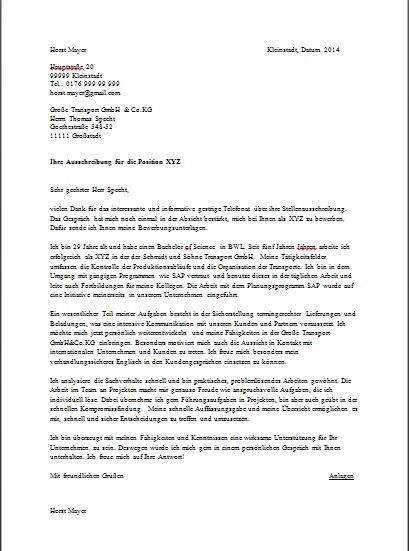
Free Download
Sample German Cover Letter
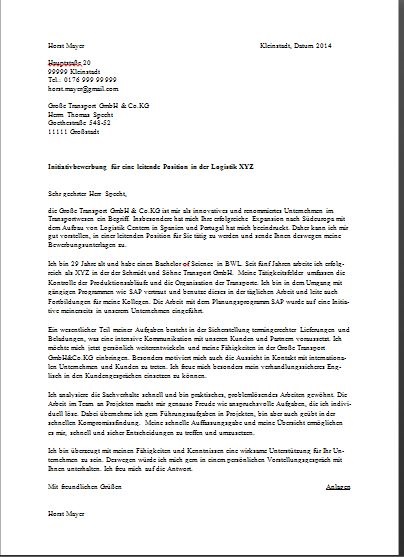
Sample Speculative German Cover Letter
This website uses cookies for usage analysis with the Matomo software. This usage analysis is made anonymous and doesn't allow any conclusions about individual visitors. Please click on the information about data privacy .
Cover Letter
A good cover letter is always unique, regardless of whether it is a cover letter for an internship or for starting a career. Five cover letters tailored to the desired job/internship employer are more promising than 100 applications in which only names and little things are exchanged.
We have compiled the most important tips for the correct structure of the application and for a good cover letter for you.
- How do I approach the cover letter?
- Formulation tips
- How should the cover letter be structured?
- Cover letter example
Preparation
- Study the job advertisement in detail before formulating the cover letter. Extensive Internet research on the work/internship employer is fundamental, regardless of whether it is a voluntary or a mandatory internship. This is also necessary for a speculative application !
- A well-prepared phone call increases their chances. The aim of a phone call is to arouse the recruiter's interest. Briefly summarize your strengths and qualifications for the position and ask specific questions. This will give you a good opening for the cover letter. In it, you can then thank them for the interview and pick up on the content.
Formal structure
Correct format.
From a formal point of view, a cover letter is a business letter with which you present your request. The Din 5008 standard specifies the correct structure.
The salutation in the cover letter
The salutation "Dear Sir or Madam" is out! You should use the name of the contact person, especially if this person is listed in the job advertisement. If it is not there, you can often find the name on the homepage of the work/internship employer. You can call the information desk of the institution or company to be addressed to ask for the name of the person responsible for personnel.
Name of contact person:in
Also, have a simple-sounding name of the contact:in spelled out for you. This will help you avoid embarrassing mistakes: Mayer, Meier or Meyer? The first word after the salutation is written in lower case. The correct form of address is: Dear Ms. Meyer, thank you ...
Use of correct company names
For example, the "GmbH" or "AG" must not be forgotten in the cover letter. The company spelling using upper and lower case letters must be observed. Tip: Adopt the designation in the imprint on the homepage if this information is not clear from the advertisement.
Subject line
The subject line is displayed in bold. It must not be forgotten. Obsolete terms such as "Ref.:", "Subject" or "Ref.:", "Reference:" before the content "Application as..." are no longer used in the cover letter.
Font & size
Cover letter and resume should be written uniformly in the same font and font size. Only the personal letterhead may deviate from this. Font size 12 is recommended; all legible types such as Arial, Times New Roman or Calibri are suitable as fonts.
Attachments
On the lower left margin, list the word attachments. The word is neither bolded nor underlined. The individual attachments are not listed.
Underlining
In address line, subject line or text, underlining is generally not used in the cover letter.
The correct number of spaces in the text must be observed. MS-Word has the "show/hide all formatting characters" button for checking.
Formulation tips for the cover letter
The cover letter is not a formulation of the resume. Focus on the 2-4 most important points that best fit the advertised position.
Short is not rude! The cover letter should not exceed ten sentences and should not be longer than one page.
The first sentence should not consist of a repetition of the subject line. Avoid sentence blocks such as "I hereby apply...".
For each sentence, consider whether it says something about you personally. Sentences that could literally come from other applicants do not bring any advantages!
Use a writing style in the cover letter that is easy to understand . Avoid nested sentences or jumping around in content.
Do not use repeated words from the advertisement in the cover letter. Nevertheless, name qualities that correspond to the advertisement, preferably by giving examples. So not: "I am a team player, motivated and reliable." But: "During my internship at XY, I worked on the YZ project. I worked there in an interdisciplinary team and my tasks were XX and YY."
Sentences that start with "I am...[unspecific enumeration]" will not get you anywhere. Much better is "I have done ... [specific example] ."
Do not use redundant sentences or informationless sentence fragments . Examples of such sentence fragments to avoid: "As you can see from my resume..." "For these stated reasons, I am applying..." "I am seeking a challenging position..."
If you want to write about the employer, describe what interests you. For example, projects to which you can make a personal connection. Don't use standard phr ases like "innovative, international, market leader" - many applicants use these verbatim in their cover letter.
Recruiters often have not studied the subject for which applicants are being sought. If knowledge is required that you can cover analogously with very similar qualifications, you should definitely mention this in the cover letter.
No justifications , explanations, repetitions or settlements with the past belong in a cover letter.
Correct format From a formal point of view, a cover letter is a business letter with which you present your request. The Din 5008 standard specifies the correct structure.
The salutation in the cover letter The salutation "Dear Sir or Madam" is out! You should use the name of the contact person, especially if this person is listed in the job advertisement. If it is not there, you can often find the name on the homepage of the job/internship employer. You can call the information desk of the institution or company to be approached to ask for the name of the:the recruiter.
Name of contact person Also have them spell out a simple sounding name of the:the contact person:in. This will help you avoid embarrassing mistakes: Mayer, Meier or Meyer? The first word after the salutation is written in lower case. Correct is: Dear Ms. Meyer, thank you ....
Use correct company names For example, do not forget the "GmbH" or "AG" in the cover letter. The company spelling using upper and lower case letters must be observed. Tip: Take over the designation in the imprint on the homepage, if this information is not to be inferred clearly from the advertisement.
Subject line The subject line is printed in bold. It must not be forgotten. Obsolete terms such as "Betr.:", "Subject" or "Bez.:", "Bezug:" before the content "Bewerbung als..." are no longer used in the cover letter.
Font & Font Size Cover letter and resume should be uniformly written in the same font and font size. Only the personal letterhead may deviate from this. Font size 12 is recommended; all legible types such as Arial, Times New Roman or Calibri are suitable as fonts.
Attachments The word Attachments should be listed on the lower left margin. The word is neither bolded nor underlined. The individual attachments are not listed.
Underlining Generally, underlining is not used in the address line, subject line or text in the cover letter.
Spaces The correct number of spaces in the text must be observed. MS-Word has the button "show/hide all formatting characters" for checking.
Example - Cover letter
Here you will find a sample cover letter. The text marked in red must be adjusted from place to place. The length shows a realistic picture.
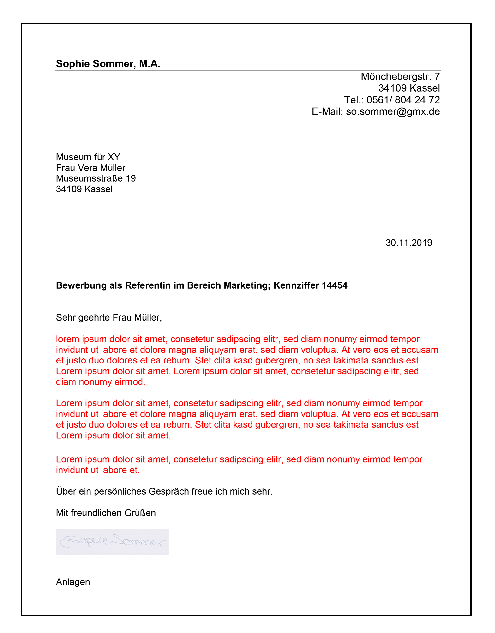

Links and Functions
- www.en.lmu.de
- Sprachenzentrum
Breadcrumb Navigation
- Written applications
- Cover letter
Step-by-step guide to a successful cover letter
Main navigation.
- About Jobline LMU
- English-speaking countries
- Preparation
- Cover letter: Introduction (video)
- Cover letter facts
- 9 common cover letter mistakes
- Letters of recommendation
- Online applications
- Application language
Introduction
The next few sides will provide you with a step-by-step guidance of how to write and compose a cover letter. The examples on each side are taken from the Cover Letter by Peter Hunzicker. Click on the picture below to get the full-sized Cover Letter to recheck while reading through the instructions.
Click here for a pdf-version and a word document of this section.

Step 1: Your address

- Use the English name for your city, if there is one and the English name for the country.
- Write your name in 14 point bold type so they can find you quickly in a stack of cover letters.
- Don’t use German characters. Write Str. or Strasse.
- Use the (+) sign instead of 00 before the country code for Germany (49). International access codes differ.
- Use a serious email address: [email protected] isn’t the image you want.
Step 2: Inside address or recipient’s address

- Use their full name with title (Dr, Mr, Ms, Professor).
- In English we don’t combine titles such as Ms doctor or Doctor Professor.
- In business, it is not common for a person to use an academic title.
- Include the person’s position, if you know it.
- Write the full mailing address of the company or institution.
Date may be positioned left or right.
UK: it is written day (number) month (written out) year without commas, e.g. 4 July 2014
US: the order is month (written out) day (number) followed by comma then year, e.g. July 4, 2014
These are small differences and both are understandable and acceptable
Don’t use abbreviations after the day: 21st, 2nd, etc.
Step 3: Salutation and subject line

Dear Ms Smith for a woman and Dear Mr Smith for a man in business. Use academic titles for universities and research facilities. If it is impossible for you to find out the name of the person you should write to, use ‘Dear Sir or Madam’.
The subject line (in Bold ) enables the reader to quickly see what your letter is about. Include the position you are applying for, date of the advertisement, source: publication or website and any reference number.
If you are writing to a company that has not posted an opening (unsolicited application), the subject line should contain the type of position you are interested in and the department ‘Application for a summer internship in marketing’.
Step 4: Body
- The body of the letter should consist of three to five short, concisely written paragraphs.
- Leave a blank line between each paragraph.
- Align your letter along the left margin of the page.
- Remember not to use contractions (I’m, don’t, etc.), slang or casual language that you would use in emails to friends.
- Do use action verbs to describe your experience.
Start the opening paragraph with a capital letter.
- Introduce yourself and specify the job you are applying for.
- Briefly explain how you heard about the job and why you are interested in it.
- Following paragraph(s): Expand on the qualifications and experience in your CV to highlight your achievements and strengths. See The first steps to successful applications and interviews.
- Use your research to demonstrate you know something about the company, their industry and the job requirements.
- Show them the connection between what they are looking for and what you have to offer.
- Use, but don’t overuse, key words from the advertisement.
Step 5: Final paragraph

- Restate your enthusiasm for the position.
- Indicate your interest in an interview and your availability.
- Offer to provide additional information and references.
- Thank them for their time and consideration of your application.
- Common phrases such as ‘I look forward to hearing from you soon’ can seem a little obvious and possibly demanding to recruiters who are trying to work their way through hundreds of applications.
Step 6: Complimentary close

- If your letter is addressed to a specific person, use ‘Yours sincerely’ (UK). If you had to start your letter with ‘Dear Sir or Madam’, then close with ‘Yours faithfully’
- In the US ‘Sincerely yours’ or ‘Sincerely’ is appropriate for any business letter.
Step 7: Signature and enclosure

- For an email cover letter, type your full name. For one that is mailed, type your full name, leaving space above for your signature. Include (Mr) or (Ms) - in brackets - before your typed name if it is not clear whether your name refers to a man or a woman. Otherwise, leave it out.
- Use ‘Enclosure’ or ‘Enclosure: CV’ to note the CV you are enclosing with your cover letter. Writing ‘CV’ alone is not enough.
- Be sure your font and font size match your CV and that both are printed on good quality white paper.
- Imprint and Disclaimer
- Privacy Policy
- Accessibility

Motivation letter in German
- by Deutsch mit Leo
- 5 minute read
You may need a Motivation Letter (Motivationsschreiben) when applying for a scholarship, internship or job. In this article, we will analyze how to properly structure your letter, what phrases to use when writing it, and also give an example of a real letter and give practical advice for improving it.
Structure and useful phrases
Most often, organizations that request motivation letters include instructions for writing a motivation letter in the application requirements, but this does not always happen. If in your case there are no such instructions and recommendations, write according to the standard scheme. We will analyze it. The standard layout looks something like this:
Introduction
This is where you greet people who will read your letter.
“Sehr geehrte Damen und Herren” is a standard greeting, if it is not known to whom exactly this letter is addressed, if you know, then write the name of this person right away, for example “Sehr geehrter Herr Schmidt” Ich bewerbe mich hiermit … – I am applying …
Ich habe mit großem Interesse von der Möglichkeit gelesen, … (+ das Praktikum bei zu absolvieren) . – With great interest I read about the possibility … (to undergo an internship at + some company)
Mit großem Interesse habe ich Ihr Stellenangebot gelesen. – I was very interested in your proposal for this position.
Ich wurde auf Ihre Stellenanzeige in … aufmerksam. – I drew attention to your proposal in …
Ich bewerbe mich um die Stelle als … – I am applying for a position … (for example, engineer, doctor).
Mit diesem Portfolio möchte ich mich nun bei Ihnen vorstellen. – I would like to introduce myself to you with this portfolio.
About yourself
This section provides general information, it may well duplicate with the information in the resume. It’s even useful in some places!
Mein Name ist … – My name is …
Ich studiere an (+ Dativ) … / Zur Zeit arbeite ich als … / bei (+ Dativ) – I am studying in … / At the moment I am working as (specify profession) / in (company)
Mein Fachgebiet ist … – My specialization …
Ich bin Journalist. – I’m a journalist.
Ich habe Journalistik an der Universität studiert. – I studied journalism at the university.
Ich bin 24 Jahre alt und Arzt von Beruf. – I am 27 years old and I am a doctor by profession.
Zurzeit arbeite ich als … – Now I work as …
Zu meinen Aufgaben zählen … – My job responsibilities include …
Ich habe Erfahrung in … – I have experience in …
Schon seit Jahren liegt mein Schwerpunkt auf (+ Dat) … – For many years I have specialized on …
Meine Kenntnisse umfassen … – My knowledge includes …
Im Bereich … habe ich langjährige Erfahrung. – I have many years of experience in the field of….
Motivation and your strengths
It is important to explain why you want to this position/internship, what your strengths and should they choose you to have get the offer, and how this experience will help you in the future.
Ich habe ein großes Interesse an (+ Dativ) … – I I am very interested in …
Meine Leidenschaft gehörte schon immer der Journalistik. – Journalism has always been my passion.
Auf die Frage, weshalb ich mich für diesen Studiengang an Ihrer Universität bewerbe, kann ich mehrere Antworten geben … – When asked why I am applying for this specialty at your university, I can give several answers …
Wie meinem Lebenslauf entnehmen können .. . – As you can see from my resume …
Weitere Angaben zu meiner Person und meinem Werdegang entnehmen Sie bitte dem beilgefügten Lebenslauf. – For more information about me and my experience, please refer to my resume (attached).
Zu meinen Stärken zählen … – My strengths include …
Ich bin eine zielorientierte Person – I am a purposeful person
Ich zeichne mich durch Selbstständigkeit – I am independent
Mich motiviert der Gedanke, dass … – I am motivated by the thought that. ..
Ich eigne mich für diese Position, weil … – I fit this position because …
Für diese Stelle bin ich der geeignete Kandidat, weil … – I am a suitable candidate for this position because…
Die von Ihnen ausgeschriebene Stelle passt aus meiner Sicht exzellent zu meinem bisherigen Profil. – In my opinion, my previous experience is ideally suited to the position presented by you.
Meine beruflichen Qualifikationen entsprechen den Anforderungen Ihres Unternehmens. – My professional qualifications meet the requirements of your company.
Diese Eigenschaften ermöglichten es mir … – These qualities allowed me …
Zukünftig stelle ich mir vor … – In the future I imagine …
Ich stelle mir diese Gelegenheit als die nächste Stufe meiner Karriere vor – I see this opportunity as the next step in my career
Das wäre für mich eine wertvolle Möglichkeit – This would be a valuable opportunity for me.
Here you need to express your hope that all of the above is suitable for the requirements of this organization, and you are waiting for a response from them. It is also considered good manners to show your willingness to answer any questions.
- Auf eine Einladung zum Vorstellungsgespräch freue ich mich sehr. – I will be very happy to be invited to an interview with.
- Bei Fragen stehe ich gerne zur Verfügung. – I will be glad to answer your questions.
- Ich kann sofort bei Ihnen anfangen. – I can immediately start working for you.
- Ich kann 2 Wochen nach der Zusage bei Ihnen anfangen. – I can start working for you 2 weeks after confirmation.
- Ich würde mich über einen positiven Bescheid sehr freuen. – I would be very happy with a positive answer.
- Ich hoffe, dass mein bisheriger akademischer Werdegang in Kombination mit meinen praktischen Erfahrungen Ihren Anforderungen an einen geeigneten Kandidaten entspricht und freue mich, von Ihnen zu hören. – I hope that my previous academic achievements, together with practical experience, fit your requirements for candidates, and I look forward to hearing from you.
- Ich würde mich sehr freuen, eine positive Rückmeldung Ihrerseits zu bekommen und stehe Ihnen für eventuelle Rückfragen selbstverständlich jederzeit zur Verfügung. – I would be very glad to receive a positive answer from your side and, of course, I am ready to answer your questions at any time.
After the conclusion, do not forget to sign the paper (all these phrases mean the same thing – an expression of respect, but the first example is the most common):
- Mit freundlichen Grüßen – With a friendly greeting (the formula in business and official letters)
- Mit besten Grüßen – With best greetings
- Joe Blake – (Your name)
Useful tips
I would like to tell you about those practical tips that helped me in writing motivation letters, and which, I am sure, are quite universal and will certainly make your task easier.
1. The most important rule of writing a cover letter in German is that it should be capacious. “Capacious” means conciseness (write no more than one, in rare cases two pages) and specifics (you shouldn’t devote a whole paragraph to your love for Germany and its language).
2. All your statements must be supported by real examples. So, it is not enough just to write “I have been fond of programming since childhood” – this is a “naked” statement and, most likely, it will not help you in any way. It will look much better if you write “I have been fond of programming since childhood: I started going to the computer technology circle at the age of 7, and wrote the first simple application at 8.”
3. Write as you like . I often see advice on the Internet: “ first write in English, and then translate into German ” or “ under no circumstances write first in English to avoid English-like construction of phrases and sentences “. Both the one and the other approach have pros and cons, I will not analyze them now. But in the end this is your motivation letter, you decide how it is more convenient for you to work, and inaccuracies and other speech errors can be corrected with the help of a native speaker.
- motivational letter
Deutsch mit Leo
5 great ways to find a partner for german language exchange, how to talk about myself in german, you may also like.
- 2 minute read
Mastering German for Daily Life: Practical Language Skills
- by Deutsch WTF
- 8 minute read
How to find a job in Germany online
- 10 minute read
10 scholarships to finance study in Germany
33 questions you are likely to be asked in a job interview in germany.
- 6 minute read
Erstelle deinen Lebenslauf mit Europass!
Mit den Europass-Tools kannst du deinen Lebenslauf ganz einfach online erstellen und ihn zur Bewerbung bei potenziellen Arbeitgebern, Bildungseinrichtungen oder Freiwilligenorganisationen einreichen.
Europass – eine bekannte Größe in Europa
Der Europass-Lebenslauf ist in Europa eine feste Größe: Er ist benutzerfreundlich und bei Arbeitgebern und Bildungseinrichtungen bestens bekannt.
Erst musst du dein Europass-Profil erstellen und dabei Angaben zu deiner allgemeinen oder beruflichen Bildung sowie zu Arbeitserfahrung und Kompetenzen machen. Nach der Erstellung deines Europass-Profils kannst du mit wenigen Klicks so viele Lebensläufe erstellen, wie du möchtest. Du entscheidest, was in deinem Lebenslauf stehen und wie er aussehen soll – den Rest macht Europass.
Du kannst Lebensläufe in 31 Sprachen erstellen, speichern und weiterleiten. Du kannst deinen Europass-Lebenslauf herunterladen, ihn in deiner Europass-Bibliothek speichern oder mit Arbeitgebern, EURES oder anderen Arbeitsvermittlungen teilen.
Der perfekte Lebenslauf
Dein Lebenslauf ist das Erste, was dein potenzieller Arbeitgeber von dir zu sehen bekommt: eine Momentaufnahme deiner Kompetenzen, deiner Bildungslaufbahn, deiner Berufserfahrung und anderer Leistungen.
Deine Stärken auf einen Blick
Hebe Kompetenzen und Erfahrungen hervor, die gut zu der Position passen, auf die du dich bewerben möchtest. Achte auf Details in der Stellenausschreibung.
Maßgeschneidert
Aktualisiere die Rubrik „Über mich“, um zu betonen, warum du besonders gut für diese Stelle geeignet bist. Gib nicht alle Erfahrungen an, die du gesammelt hast. Triff eine Auswahl und nenne nur die Stationen deiner Laufbahn, die zum Stellenprofil passen.
Dein Lebenslauf darf nicht zu kompliziert sein. Formuliere klar und deutlich. Verwende starke Verben (z. B. „entscheiden“, „entwickeln“, „steigern“).
Aktuelle Informationen zuerst
Führe deine aktuelle Berufserfahrung immer als Erstes an. Erläutere Lücken in der Berufs- oder Bildungslaufbahn.
Der letzte Schliff
Kontrolliere Rechtschreibung und Grammatik, gib eine professionelle E-Mail-Adresse an und füge ein professionelles Bewerbungsfoto hinzu.
Dein Europass-Profil
In deinem Europass-Profil laufen alle Kompetenzen, Qualifikationen und Erfahrungen zusammen. Aktualisiere dein Profil regelmäßig, damit du schnell einen maßgeschneiderten Lebenslauf und die dazu passende Bewerbung erstellen kannst.
Viel Glück bei deiner Bewerbung!
Nützliche Dienste der EU
Eures – das europäische portal zur beruflichen mobilität, in anderen eu-ländern arbeiten, bildung und berufsbildung in anderen eu-ländern, auch interessant.

Bewerbungsschreiben erstellen mit Europass

Weiterbilden durch Freiwilligentätigkeit

Wie Europass deine persönlichen Daten verwaltet
Share this page.

Is a Cover Letter Necessary in 2024?
Published: April 03, 2024
Writing a cover letter can be daunting.

I’ll never forget my college career coach, who made writing a cover letter look easy. Even with her tips, I’ve always found it incredibly difficult to talk about myself and hype up my accomplishments.
While it acts as a letter of introduction, I’ve wondered if a cover letter is necessary in 2024. To find out, I spoke with two recruiters and gained insights on how to write the best cover letter for any job application.
![cover letter deutsch sample → Click here to access 5 free cover letter templates [Free Download]](https://no-cache.hubspot.com/cta/default/53/3f347702-d7e9-4e59-9fe4-be4cd7bad191.png)
How important is a cover letter?
Is a cover letter necessary, when to skip a cover letter, when to include a cover letter, tips for writing a cover letter, what if the cover letter is optional.
Cover letters are short letters of introduction that you include with job applications.
Typically, they are your chance to go into deeper details about your accomplishments that you might not have highlighted or had room to mention on your resume.
Tiffany Hall, a professional resume writer and founder of Resume911 , says cover letters are an important part of the job application process.
Hall says, “Cover letters can be very important. It’s supposed to sell why you, of all applicants, should get the job. The issue is that applicants use them to regurgitate what’s on their resume, and that’s not what it’s for. It should speak to what isn’t easily explained with your resume.”
.png)
5 Free Cover Letter Templates
Five fill-in-the-blank cover letter templates to help you impress recruiters.
- Standard Cover Letter Template
- Entry-Level Cover Letter Template
- Data-Driven Cover Letter Template
You're all set!
Click this link to access this resource at any time.
For example, if your resume says you’re skilled at building web pages, your cover letter is a great place to name-drop companies that you’ve worked for to create their websites.
Matthew Muehleisen, a corporate recruiter , thinks a cover letter is also a great place to show you’ve done your homework and researched a company.
Muehleisen says, “It can be what sets you apart from other candidates and applicants and is a good opportunity to show that you’ve done research on the position and company to further showcase your interest in the role.”
Knowing the importance of a cover letter still begs the question: Is a cover letter necessary in 2024?
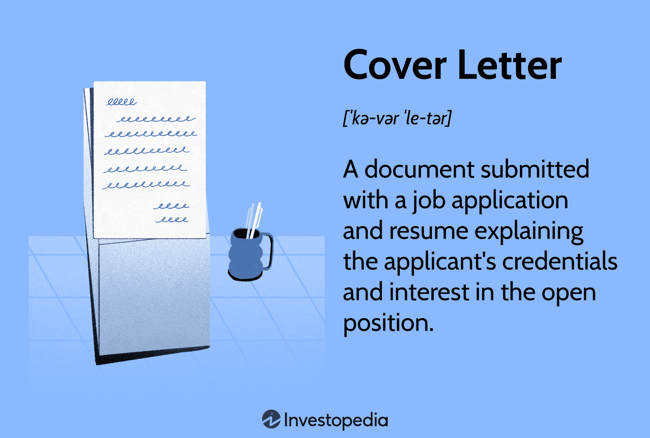
Image Source
While a cover letter can help demonstrate your knowledge of the company you’re applying to and highlight more of your achievements, both Hall and Muehleisen agree that a cover letter isn’t entirely necessary.
Muehleisen says, “Unless it’s a requirement of the application, I wouldn’t say it’s necessary to include a cover letter. There are some roles (usually in content creation and marketing) that will ask for a cover letter as a form of a writing sample. In these instances, make sure your letter is polished and focused.”
If Hall had her way, she would eliminate the cover letter entirely, focus more on the resume, and ask for a link to an applicant’s LinkedIn profile.
According to Hall, “Most cover letters either repeat the resume or they speak to why the applicant isn’t a good fit. Neither is the purpose of a cover letter.”
Nevertheless, 74% of hiring managers still prefer applications to include a cover letter. So, it is definitely worth considering including one — even if the application says it’s optional.
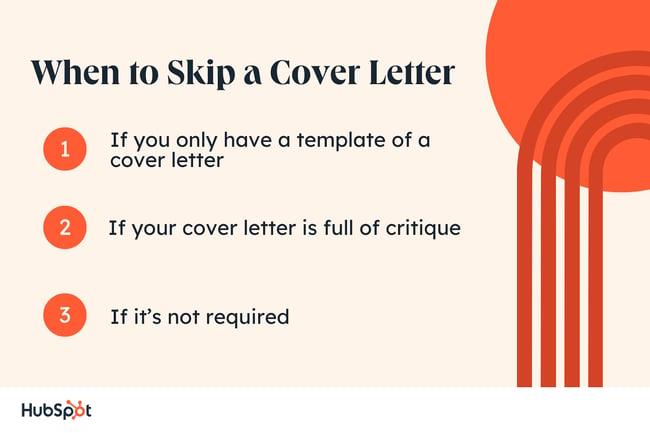
If you’re looking for a new role, writing a cover letter can be time-consuming — especially if you take the time to personalize every letter you send to a hiring manager.
Although a cover letter does serve a legitimate purpose, and 83% of hiring managers read it, there are a few situations where you shouldn’t include a cover letter. Let’s take a look at those scenarios.
If You Only Have a Template of a Cover Letter
I get it. Writing an effective cover letter takes a significant amount of time.
But consider not sending one if you only have time to plug your information into a cover letter template without personalizing it before hitting submit on an application.
Don’t get me wrong. A cover letter template is a great starting point to write your cover letter. Templates often remind you to include pertinent information like the hiring manager’s title, name, and your contact information.
However, if you don’t take the time to edit the body of the cover letter and personalize it with research and your relevant experience, you risk sending the same letter as another candidate.
And considering that 48% of hiring managers spend anywhere from 30 seconds to two full minutes reading each cover letter, the chances are high that your hiring manager can spot a form letter a mile away.
Don’t send it if you don’t have the time to personalize a cover letter.
If Your Cover Letter Is Full of Critique
A cover letter is meant to explain why you’re the best candidate for the open position. However, a cover letter is not a place for you to share your ideas of how the company can improve.
Sure, every company likely has areas of improvement, and the job you’re applying for might be the role that gets a say in that, but a list of improvements might read as a critique.
You don’t want to potentially offend a hiring manager before you even get an interview. A bad cover letter can hurt a strong candidate, according to 33% of hiring managers .
Before you submit your cover letter, read through it several times to make sure it’s not a critique. If it does sound like a critique, throw it out.
If It’s Not Required
There are other instances where you shouldn’t send a cover letter. For example, if the application’s instructions specifically state that you do not need to submit a cover letter for consideration for the job.
In fact, sending a cover letter anyway can signal to the hiring manager that you don’t follow instructions. Not following instructions is also a great way to land your application in the trash bin.
The bottom line is this: If the application specifically states not to send a cover letter, don’t send it.
Of hiring managers, 74% prefer to see job applications with a cover letter apart from the resume. Knowing this, if you have the time to include a cover letter with your job application, don’t skip it.
Here are three instances when you should send a cover letter with your application.
Send a cover letter if you’re very interested in the role.
Think of your cover letter as your time to shine. Use it as a place to highlight your experiences and the qualifications that make you a great fit for the position.
Hall says, “If you can speak to why you’re a good candidate without copying your resume in paragraph form, include a cover letter.”
In other words, don’t use bullet points in your cover letter to describe your previous employment history.
Instead, talk about what you learned on the job and how your skills will help you excel in the role you’re applying for.
Send a cover letter when there’s a gap in your resume or you’re transitioning industries.
If you’re looking to transition to another industry, you should definitely include a cover letter with your application.
Speaking from personal experience, if I had only submitted a resume to my school district when I applied to be a Spanish teacher, the hiring manager would have just seen my experience in Public Health and would not have known about my skills and success in tutoring students in Spanish.
Muehleisen puts it this way, “If you’re looking to transition to a new industry or if there is a position and company you’re really excited about pursuing as an opportunity, these are the best instances to include a cover letter so that you can possibly give yourself an advantage.”
A cover letter can also help explain any gaps in your resume — especially if the gap in your employment history is beneficial to the role you’re applying for.
For example, maybe you volunteered in South America, and the role you’re applying for is for a position in Global Operations.
It never hurts to include positive, pertinent information in your cover letter.
Send a cover letter when it’s required.
The most obvious time to include a cover letter with your application is when it is required. Just like not including a cover letter when it’s not required, it shows you can follow directions.
Include a cover letter when the application asks you to submit one, which shows you can follow directions.
Plus, if the application asks for a cover letter, you can bet the hiring manager will look for it. If no cover letter is included, well, you’re sabotaging your chances of getting an interview.
Only 13% of hiring managers will consider giving a candidate an interview if they don’t attach a required cover letter to an application.
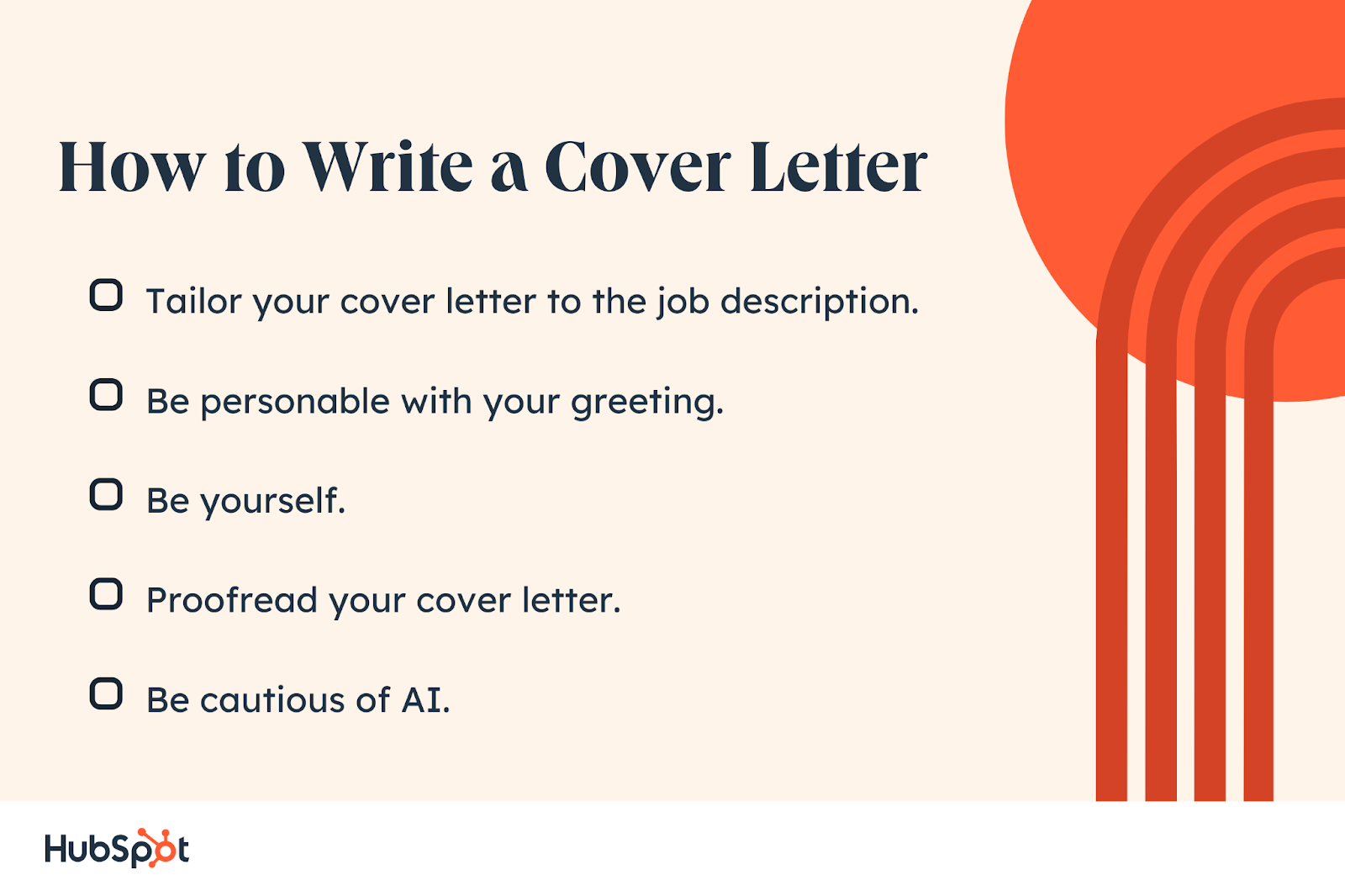
Writing a cover letter is not as painful as it sounds. There are great templates you can use as a starting point for your cover letter.
The trick with a template, though, is to make sure you always personalize the letter to your own experiences and qualifications.
Here are five expert tips to write a winning cover letter.
1. Tailor your cover letter to the job description.
When writing a cover letter, especially if you use a cover letter template, you should tailor the letter to match the job description and meet the requirements of the application.
For example, if the application asks you to attach a short cover letter, keep it brief. Your best bet is one to two short paragraphs detailing why you’re a great fit for the position.
You’ll also want to reference keywords from the job description in your cover letter. Many recruiters use applicant tracking systems that scan application packets for the best fit.
Often, hiring managers review the applications that match the keywords first.
Now, that doesn’t mean to stuff your cover letter with keywords. Instead, use them in a natural way as you discuss your qualifications.
2. Be personable with your greeting.
You might have seen the advice telling you to use “To Whom It May Concern” instead of the hiring manager’s name. This is good advice, but only if you do not know the hiring manager.
Before resorting to a generic greeting to start your cover letter, take the time to look on the company’s website and LinkedIn to find out who makes hiring decisions.
If you have contacts in your network who are familiar with the company, ask them. Taking the time to research the hiring manager and the company shows you care about the details — a quality many hiring managers look for in a candidate!
If you’re still unsure after researching the company, consider using “Dear Sir or Madam” as your greeting.
3. Be yourself.
While a cover letter is a formal introduction of yourself to a potential employer, it doesn’t need to be lacking in personality. Hall suggests sprinkling your personality in your cover letter to spark connections with the hiring manager.
Hall says, “Be your best professional self. I’m a foodie and will include references to food on my LinkedIn, and I’ve done it in a cover letter. I’ve had managers reference them, and we had a chuckle. I am also very clear about aligning myself with companies whose mission and goals I respect and can contribute to. I make sure to speak to that in the cover letter.”
Take Hall’s advice. Showcasing your vibrant personality in your cover letter can help break the ice in your interview!
4. Proofread your cover letter.
Once you’ve written your cover letter and before you hit “send,” double-check that it is free from spelling and grammar errors and that the company you referenced is the company you are applying to.
Muehleisen says skipping proofreading your cover letter is a big mistake — and it could cost you the job!
Muehleisen says, “Make sure that you are proofreading prior to sending. If the cover letter feels like it is a simple cut/paste or if the job title and company name are incorrect, it may do more harm than good. So, be sure that what you’re sending is pertinent.”
5. Be cautious of AI.
AI tools, like ChatGPT or Claude, are great for helping draft content. You might be tempted to ask generative AI to write your cover letter for you. However, both Hall and Muehleisen say to proceed with caution when it comes to AI.
Hall says, “AI is coming along in amazing ways, so it may come as a surprise that my best tip didn’t include AI. I tell my clients when they’re stuck to look to their peers. You can search people by job title on LinkedIn. See how they describe themselves and pull from there. Or, hire a resume writer or career strategist to help you.”
Muehleisen agrees with her. He says, “I would hesitate to use a tool or service for a cover letter as the point should be to show your authenticity. If you are going to use AI for assistance, make sure to put your own words in as well.”
However, when you write your cover letter, whether using a template or generative AI, personalizing it is key to standing out from the competition.
If the job description says a cover letter is optional, should you send one, or can you get by without it?
That can be tricky, considering 72% of recruiters still expect a cover, even if it’s optional.
According to Muehleisen, sending a cover letter is not a bad idea. He says, “I’ve never heard of a cover letter hurting an applicant’s chances; just make sure the one you’re including is specific to the job description and posting.”
Check out these cover letter examples for more inspiration.
Experiment With Your Cover Letters
Writing a cover letter is a breeze once you get the hang of it. With today’s challenging job market, sending a cover letter with your application can make a difference in whether you get called for an interview.
I can’t make promises that your cover letter will dazzle hiring managers each time, but for the right position for you, it will.
Remember Hall and Muehleisen’s advice when you craft your cover letter. Personalization is key to success!

Don't forget to share this post!
Related articles.

The 23 Best Cover Letter Examples: What They Got Right
![cover letter deutsch sample How to Write a Cover Letter for an Internship [Examples & Template]](https://blog.hubspot.com/hubfs/Copy%20of%20Featured%20Image%20Template%20Backgrounds-Aug-21-2023-02-03-52-3390-PM.png)
How to Write a Cover Letter for an Internship [Examples & Template]
![cover letter deutsch sample Letter of Interest Tips, Templates & Examples [A 2023 Guide]](https://blog.hubspot.com/hubfs/letter%20of%20interest.png)
Letter of Interest Tips, Templates & Examples [A 2023 Guide]

15 Cover Letter Templates to Perfect Your Next Job Application

The Ultimate Guide to Writing a Cover Letter
![cover letter deutsch sample How to Start a Cover Letter to Impress Employers [+ 14 Examples]](https://blog.hubspot.com/hubfs/how-to-start-a-cover-letter.jpg)
How to Start a Cover Letter to Impress Employers [+ 14 Examples]

Eight Cover Letter Greetings for Every Situation

7 Expert Cover Letter Tips to Get the Job
Marketing software that helps you drive revenue, save time and resources, and measure and optimize your investments — all on one easy-to-use platform

IMAGES
VIDEO
COMMENTS
Naturally, there is also a guideline for professional letter writing and correspondence, the so-called DIN 5008 norm. It states the following margins on a DIN A4 (standard German letter paper format): German Cover Letter Format Example. Left margin: 2,5 cm. Right margin: 2,0 cm. Top margin: 4,5 cm. Bottom margin: 2,5 cm.
Section 1 - Your details. At the very top of your German cover letter, you should include your full name, address, phone number and email address. Section 2 - The date. Here you simply enter the date you are writing the cover letter. Section 3 - The employer's details. In section 3, you list the details of the recipient.
Keep the cover letter to a single page and not more than 3 - 4 paragraphs. Be succinct (i.e., avoid long wordy sentences or overuse of adjectives) and summarize, summarize, summarize. Pick key points from your CV and/or job description but don't repeat things verbatim.
Use specific, concrete examples from your work history to back up your points. End with a formal signing-off. Make sure your letter is no longer than one side of A4. Our expat guide looks at how to format, structure and write a cover letter in Germany, with plenty of tips, and links to examples and templates.
First Paragraph - Why you are writing. Middle Paragraphs - What you have to offer. Concluding Paragraph - How you will follow-up. Do not repeat your what is already in your CV, simply refer to it! "As you can see from my CV, …". If a particular work experience listed in your CV especially qualifies you for the job you can refer to it and ...
The cover letter should be a separate PDF file or Microsoft Word Document. Tipps regarding the German cover letter. Here are a few tips that I collected from my German friends. Length of German employment cover letter. A cover letter for German employers should be roughly one to two DIN A 4 pages long.
Cover Letter Framework. The cover letter has to written in accordance with DIN 5008. This is a dedicated framework when it comes to formal writing in Germany. Following are the standards: Left margin: 24.1 mm; Right margin: at least 8.1 mm; Bottom margin: 16.9 mm; Top margin: 16.9 mm; Please ensure this format is taken seriously.
German Cover Letter Format. It is critical to use the correct format for your cover letter when applying in Germany. This implies that you should include your contact information (name, address, phone number, email) and the date at the top of the page. The letter should be addressed to the person in charge of hiring at the firm (if you do not have a name, you can use something more general ...
The role of the German Cover Letter is quite subtile. It accompanies the German CV and contains detailed information about the specific skills you have, your work experience, your motivation to gain employment, and the reasons why you are the ideal candidate for the job. The relationship between cover letter and CV is very important and you ...
Example for how to format your German Cover Letter . You should also make sure to keep enough space to each side, at least 2,5 cm. Cover Letter Content. Before we take a closer look at what to write, it's important to consider the following: In the digital age, most recruiters inspect your CV first, and then turn to the Cover Letter. That ...
Key Points: Writing a Perfect German Cover Letter. Pick the right cover letter template that goes with your resume. Give priority to your academic and professional qualifications. Follow the generally accepted German styling guide for formal letters. Tailor your cover letter to each job you're applying for. Write 3 to 4 solid paragraphs on ...
In the email content, write a short introduction about your application to the particular role and mention the attached documents. Alternatively, you can copy and paste your cover letter into your email. Remove the address and the date in that case. Use your subject line in the cover letter as the subject of your email.
This 2018 study by German recruitment agency Robert Kraft found out that 48% of recruiters didn't find cover letters so relevant anymore, meaning that applications with CV only were considered valid. In 2019, the Deutsche Bahn even stopped requesting cover letters all together, mentioning a lack of relevance. German ecommerce giant Otto did ...
You might need to also read about writing a German CV. Example: (your address can either be on a line at the top of the letter or as a paragraph) Mkenya Ujerumani, Musterstrasse 20, 78495 Musterstadt. Handy 01577776543 Email: [email protected]. Frau Ypsilon, Company XYZ, Musterfelderstrasse 2, 0345 Musterstadt.
Cover Letter example - For Beginners and Advanced: 34 German lessons, German Grammar, Idioms, Quotes and 2 Online Tests.
Cover Letter. Bei der englischsprachigen Bewerbung im Ausland ersetzt der Cover Letter das deutsche Anschreiben, während CV oder Résumé als Äquivalent zum Lebenslauf dienen. In diesem Artikel erfährst du alles zum Aufbau & Inhalt des Cover Letters. Wir erläutern jeden Abschnitt im Detail und liefern passende Beispielformulierungen und ...
Salutation. In Germany, formality is crucial. Address the recipient with "Sehr geehrte (r)" (Dear) followed by their last name and a comma. If you don't know the recipient's name, use "Sehr geehrte Damen und Herren" (Dear Sir/Madam). 6. Opening Paragraph. The opening paragraph sets the tone for your cover letter.
After listing the addresses of you and the company, what follows is the place and date in the top right corner of the cover letter. If you are in Germany, you can just write the cite, e.g. "Augsburg, 11.10.2025". Both should match the information on the resume. Ideally, the cover letter should be addressed to a specific contact person.
The German Cover Letter and the German CV are the most important documents for getting called back for a job interview. Sample German Cover Letter. The Cover Letter should be one page DIN A4 at most. Use the standard text arts as Times New Roman or Arial type size 12 and single-spaced line spacing as well as in DIN 5008 Norm. Find here a sample ...
The cover letter is not a formulation of the resume. Focus on the 2-4 most important points that best fit the advertised position. Short is not rude! The cover letter should not exceed ten sentences and should not be longer than one page. The first sentence should not consist of a repetition of the subject line.
Step 7: Signature and enclosure. For an email cover letter, type your full name. For one that is mailed, type your full name, leaving space above for your signature. Include (Mr) or (Ms) - in brackets - before your typed name if it is not clear whether your name refers to a man or a woman. Otherwise, leave it out.
Introduction. This is where you greet people who will read your letter. "Sehr geehrte Damen und Herren" is a standard greeting, if it is not known to whom exactly this letter is addressed, if you know, then write the name of this person right away, for example "Sehr geehrter Herr Schmidt". Ich bewerbe mich hiermit ….
Europass is a set of online tools to help with creating CVs, cover letters and also help users to find jobs and courses in the EU. Europass also matches user skills and interests such as location and topic to success suitable jobs. It is a useful tool to find information on studying or working in the Europe.
A cover letter should include the following parts: Header. Salutation. Introduction. Body paragraph. Closing paragraph. Letter ending and signature. The following cover letter samples and examples will show you how to write a cover letter for many employment circumstances. Browse cover letters by job title for inspiration.
Europass - eine bekannte Größe in Europa. Der Europass-Lebenslauf ist in Europa eine feste Größe: Er ist benutzerfreundlich und bei Arbeitgebern und Bildungseinrichtungen bestens bekannt.. Erst musst du dein Europass-Profil erstellen und dabei Angaben zu deiner allgemeinen oder beruflichen Bildung sowie zu Arbeitserfahrung und Kompetenzen machen.
Follow these three tips to write a social work cover letter that's sure to stand out: 1. Highlight social work skills. As a social worker, you'll spend most of your time assessing needs, preparing treatment plans to help clients, and following up to ensure an improvement in their situations. In your cover letter, highlight key social worker ...
Published: April 03, 2024. Writing a cover letter can be daunting. I'll never forget my college career coach, who made writing a cover letter look easy. Even with her tips, I've always found it incredibly difficult to talk about myself and hype up my accomplishments. While it acts as a letter of introduction, I've wondered if a cover ...
Early childhood teacher cover letter sample To help you learn more about cover letters, here is a sample cover letter for an early childhood teacher: Celine Ferris Chicago, Illinois 304-555-0192 [email protected] March 14, 2024 Mrs. Barbara Richardson Wavewood Teaching Dear Mrs. Richardson, As a dedicated and experienced early childhood teacher, I am excited to apply for the early ...
Here are some steps you can follow to write your cover letter: 1. Begin with a header and greeting. In your header, include your contact information. Start with your name, followed by the city and state in which you're looking for work, your phone number and a professional email address. Next, include the date on which you submit the ...
Family law paralegal cover letter example To help you learn more about cover letters, here is a sample cover letter for a family law paralegal: Celine Ferris Chicago, Illinois 304-555-0192 [email protected] March 24, 2024 Mrs. Barbara Richardson Wavewood Law Firm Dear Mrs. Richardson, I am writing to apply for the family law paralegal position advertised on your company's website.